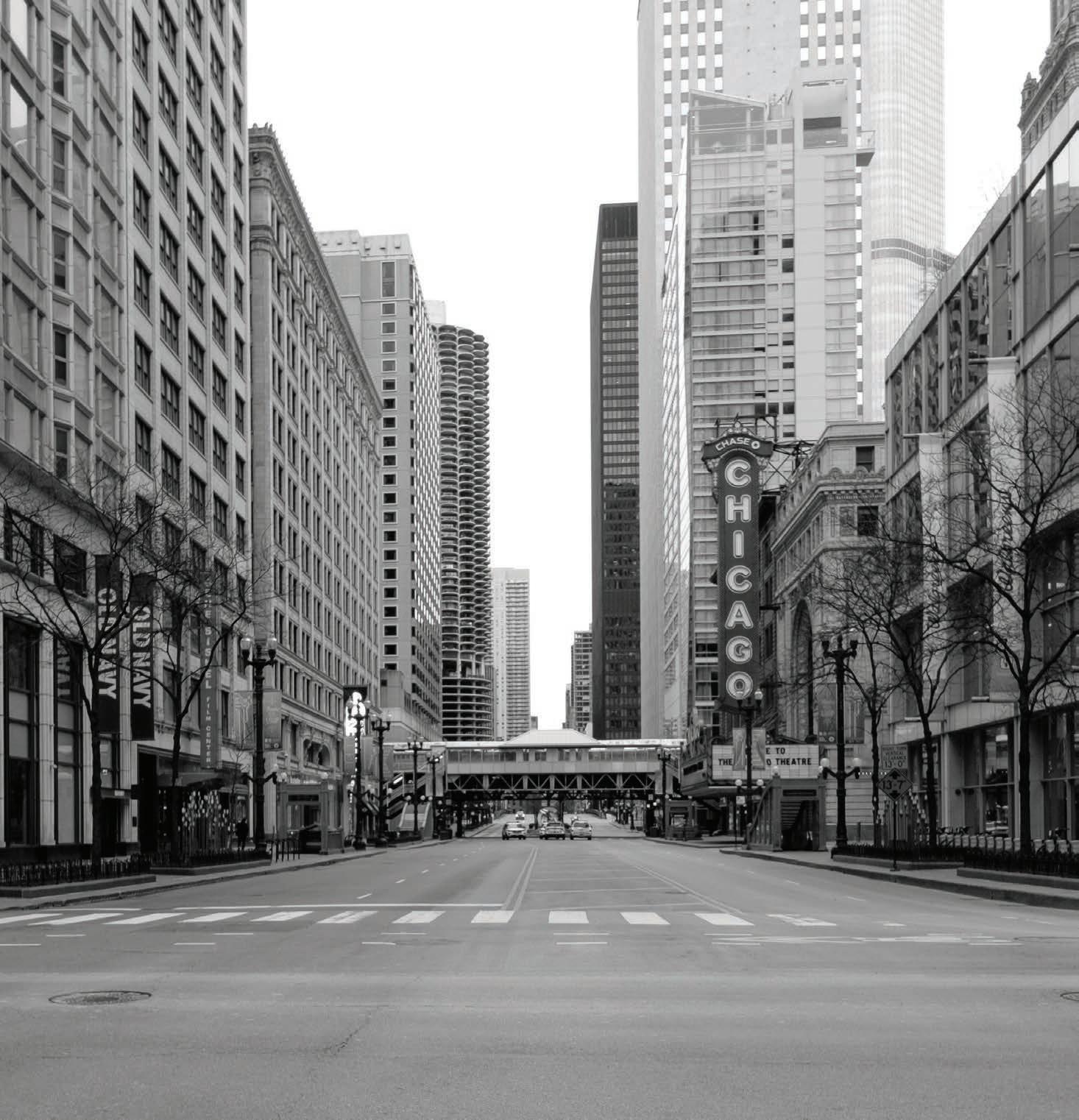

CHICAGO’S FREE WEEKLY SINCE 1971 | MARCH 26, 2020 STAY AT HOME
CITY LIFE
03 Shop Local Instead of buying from Amazon, support Chicago businesses from your couch.
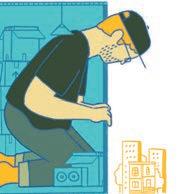
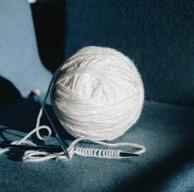
FOOD & DRINK
04 Gardeners You can’t grow toilet paper, but you can grow your own food.

prepare for a deluge of novel coronavirus patients.
NEWS & POLITICS
06 Joravsky | Politics Look on the bright side, Chicago: Burke, Lipinski, and Conway lost!
08 Hospitals Interviews with a doctor and nurse as hospitals
10 Feature Essays on isolation: What staying at home has taught us about our city and ourselves.
ARTS & CULTURE
16 Lit Cameron Esposito looks back on her defining moments in the memoir Save Yourself
17 Community How DIY face masks can help our local hospitals
18 Comedy How soon is “too soon” to make jokes about coronavirus?
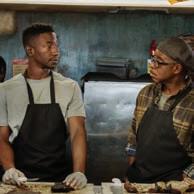
THEATER
19 Essay A love letter to the Chicago theater community
21 Review Steven Strafford’s solo chronicle of meth addiction streams online with 16th Street.
22 Profile Nora Dunn’s Steppenwolf show is postponed, but the SNL vet isn’t holding back.
FILM
23 Small Screen Stand-up Mae Martin’s new series Feel Good gets heavy, but there’s always a laugh waiting around the corner.
25 Movies of note The Platform packages thrills in a thick shroud of moral ambiguity; Uncorked is a charming take on younger generations rejecting their parents’ traditions; and Vivarium leans into science fiction to depict the dystopian utopia.
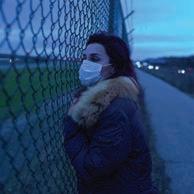
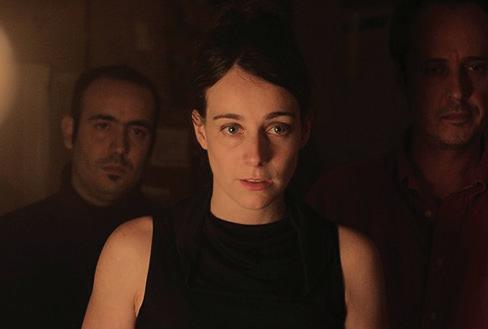
MUSIC & NIGHTLIFE
26 Feature The Chicago Underground Quartet recapture their freewheeling jazz spirit, 19 years a er their first album.
30 Shows of note Even a pandemic can’t stop the flow of great music. Our critics review new and recent releases that you can enjoy at home.
31 The Secret History of
Chicago Music Blues guitarist Lurrie Bell beat mental illness to build a thriving career.
Early Warnings Rescheduled concerts and other updated listings
Gossip Wolf Silkworm veteran Tim Midyett finally drops the first Mint Mile full-length, Steve Reidell of Air Credits almost remakes the 1980 Genesis album Duke, and more.
OPINION
Savage Love Dan Savage offers advice on whether to hook up with an ER doctor during a pandemic.
PUBLISHER TRACY BAIM EDITORS IN CHIEF SUJAY KUMAR, KAREN HAWKINS CREATIVE LEAD RACHEL HAWLEY MUSIC EDITOR PHILIP MONTORO THEATER AND DANCE EDITOR KERRY REID CULTURE EDITOR BRIANNA WELLEN ASSOCIATE EDITOR JAMIE LUDWIG
SENIOR WRITERS MAYA DUKMASOVA, LEOR GALIL, DEANNA ISAACS, BEN JORAVSKY, MIKE SULA EDITORIAL ASSOCIATE S. NICOLE LANE GRAPHIC DESIGNER AMBER HUFF
LISTINGS COORDINATOR SALEM COLLO-JULIN CONTRIBUTORS ED BLAIR, NOAH BERLATSKY, LUCA CIMARUSTI, MARISSA DE LA CERDA, MARI COHEN, JOSH FLANDERS, SHERI FLANDERS, JACK HELBIG, IRENE HSAIO, CATALINA MARIA JOHNSON, MONICA KENDRICK, STEVE KRAKOW, NOËLLE D. LILLEY, JAMIE LUDWIG, MAX MALLER, ADAM MULLINS-KHATIB, J.R. NELSON, JEFF NICHOLS, MARISSA OBERLANDER, MATTHEW SIGUR, CATEY SULLIVAN
DIRECTOR OF DIGITAL JOHN DUNLEVY DEVELOPMENT ASSOCIATE COLETTE WILLARD SOCIAL MEDIA COORDINATOR JANAYA GREENE MEDIA PARTNERSHIPS COORDINATOR YAZMIN DOMINGUEZ
STAFF AND SPECIAL PROJECTS ASSISTANT TARYN ALLEN
SPECIAL EVENTS CONSULTANT KRISTEN KAZA
ADVERTISING
CLASSIFIEDS
312-392-2970, ADS@CHICAGOREADER.COM CLASSIFIEDS: CLASSIFIED-ADS@CHICAGOREADER.COM
SALES DIRECTOR PATTI FLYNN

VICE PRESIDENT OF SALES AMY MATHENY CLIENT RELATIONSHIP MANAGER TED PIEKARZ SENIOR ACCOUNT REPRESENTATIVES
LENI MANAA-HOPPENWORTH, LISA SOLOMON ACCOUNT REPRESENTATIVES
GREG MCFALL, NANCY SANCHEZ
CLASSIFIED SALES MANAGER WILL ROGERS
NATIONAL
JOE LARKIN AND SUE
DISTRIBUTION
CHICAGO
BOARD
1-888-278-9866
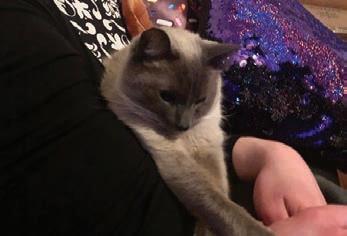
2 CHICAGO READER - MARCH 26, 2020 ll
34
34
36
38 Jobs 38 Apartments & Spaces 38 Marketplace
ADVERTISING VOICE MEDIA GROUP
VMGADVERTISING.COM
BELAIR
CONCERNS distributionissues@chicagoreader.com 312-392-2970
READER L3C
PRESIDENT DOROTHY R. LEAVELL TREASURER EILEEN RHODES SECRETARY JESSICA STITES AT-LARGE SLADJANA VUCKOVIC CONSULTANT CAROL E. BELL READER (ISSN 1096-6919) IS PUBLISHED WEEKLY BY CHICAGO READER L3C 2930 S. MICHIGAN, SUITE 102 CHICAGO, IL 60616 312-392-2934, CHICAGOREADER.COM COPYRIGHT © 2020 CHICAGO READER PERIODICAL POSTAGE PAID AT CHICAGO, IL ALL RIGHTS RESERVED. CHICAGO READER, READER, AND REVERSED R: REGISTERED TRADEMARKS ® THIS WEEK CHICAGO READER | MARCH 26, 2020 | VOLUME 49, NUMBER 25 TO CONTACT ANY READER EMPLOYEE, E-MAIL: (FIRST INITIAL)(LAST NAME) @CHICAGOREADER.COM IN THIS ISSUE The Reader’s stay-at-home chronicles Here’s a daily-ish journal of how our staff, friends, family, and pets are spending time. Who voted for Iris Martinez? Maybe she was the most qualified candidate in the clerk of the Circuit Court race. Or maybe she had the best name. Chicago movie journal: Make no little home-viewing plans Now is the time to tackle some daunting cinema. THIS WEEK ON CHICAGOREADER.COM ON THE COVER: PHOTO BY SAMANTHA BAILEY. FOR MORE OF BAILEY’S WORK, GO TO THOUGHTSINBUTTERMILK.COM.
LOCAL
Support Chicago businesses from your couch
By KAREN HAWKINS
You need something—make that everything—delivered, and before you’ve even finished typing A-m-, your browser has taken you to that magical behemoth in the sky (aka Seattle) that will make all of your free two-day shipping dreams come true. Not so fast, friend. Before you hit Add to Cart and add another dime to Je Bezos’s billions—with a B—consider supporting a local business instead, especially for things you’d usually stroll by and buy.
Many of your favorite independent shops and stores are delivering on demand, and while it may not be as convenient as buying
with a single click, you’re supporting the local economy from the comfort of your couch. Not all heroes wear capes; some wear pajamas. All damn day.
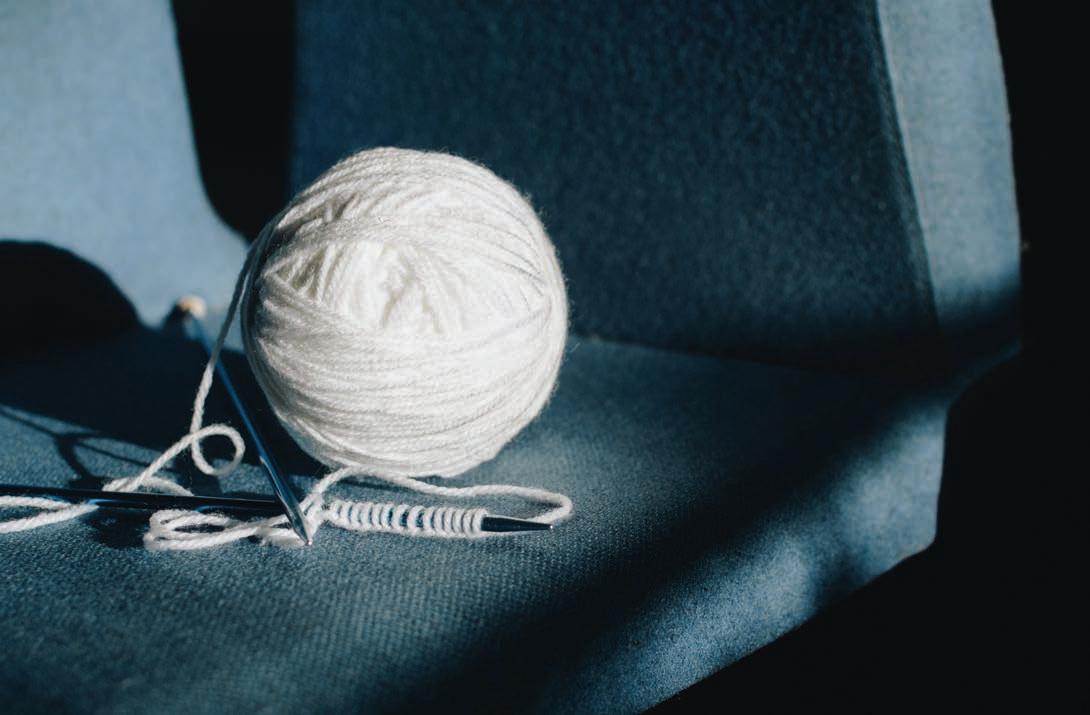
Books
Many beloved members of the Chicagoland Independent Bookstore Alliance (ChIBA)—including Women & Children First and 57th Street Books—are accepting online orders you can have shipped to your door. Visit your favorite store’s website to verify their delivery status. Some are o ering free shipping and have digital programming you can access while their physical spaces are
closed, including podcasts and their bestseller lists.
Get crafty
A customer of South Loop crafter’s paradise Yarnify called the need to keep your hands busy a “Pandemic Project,” and whatever language you use, this yarn shop’s online store is open. They note that they don’t always get prompt notifi cation when orders come in and ask that customers e-mail a copy of orders to barbaraofyarnify@gmail. com.
Groceries
You won’t be able to wander around the
wonderland that is HarvesTime Foods for a while, but that doesn’t mean you can’t get your chicharrones esponjados fix. The Lincoln Square institution is offering free same-day and curbside pickup. Visit Harvestimefoods.com to place an order.
The website for Lincoln Park’s lush Green City Market also has a searchable list of vendors (read: farmers) that are o ering pickup and delivery.
Meals and more
If you haven’t yet, check out Reader senior writer Mike Sula’s recent stories about the restaurant delivery site Dining at a Distance and e orts by Rogers Park Food Not Bombs to convert restaurant food waste into food for the needy. Many local restaurants have gotten creative and are offering meal kits, care packages, and grocery staples for delivery. Ordering direct from the restaurants helps them avoid the fees of delivery sites.
Self-care
Four words: discreet flat-rate shipping. If you’ve never ordered online from sex toy store Early to Bed and you don’t want your mail carrier or neighbors all up in your business, those four little words will be key. The shop’s online store is accepting orders, though they warn there may be a delay in fulfi llment. See what we did there?
Gifts that keep on giving
Many service-based businesses—spas, salons, child-care providers, etc.—that have been shut down by the stay-at-home order are o ering gift certifi cates, and all of the owners I’ve spoken to are counting on the gifty influx of cash while their doors are closed. Even better: if you can buy a gift you don’t intend to claim. If your go-to self-care oasis isn’t open now, giving to them ensures that someday in the future they will be.
We appreciate how many businesses around the city are hosting fundraisers for their idle employees, including some of our favorite bars, restaurants, and music venues. Koval Distillery is hosting a GoFundMe that caught our eye—and not just because alcohol is involved. The company is raising money to help provide alcohol-based hand sanitizers to the medical community, retirement homes, and others involved in fi ghting coronavirus. At press time they had raised more than $24,000 toward their $40,000 goal from 531 donors. v
@ChiefRebelle
MARCH 26, 2020 - CHICAGO READER 3 CITY LIFE
SHOP
Because Amazon is gonna be just
fine.
KELLY SIKKEMA / UNSPLASH
FOOD FEATURE
Get growing
Chatting with expert gardeners shows that the time for a new Victory Garden movement is right now.
 By MIKE SULA
By MIKE SULA
COVID-19 has struck Illinois in force just as the spring gardening season is starting.
If you’re a gardener in Chicago, you’ve probably already ordered and started germinating your seeds, plotted your now-dormant backyard or balcony plot (or pots), and made a wish list of seedlings you’d like to buy from garden centers and the various community plant sales scheduled to begin in May.
If you’re not a gardener, you might be thinking about becoming one. You can’t grow toilet paper, but you can grow your own food. If you aren’t thinking of gardening, you should, if only because it will give you something rewarding and productive to do.* Growing your own food yields many good things besides the food. There’s nothing more meditative and
peaceful than spending a summer watching your own basil plant sprout and flourish.
During World War II a massive worldwide gardening campaign known as Victory Gardens provided food security for millions of people during disruptions to the supply chain. Chicago was a leader in that movement. And it could be again.
I talked with a pair of gardening experts about why home and community gardening is more important now than ever, and what they had to say is encouraging. My interview with one is here, and you can find the other at ChicagoReader.com, along with a list of gardening resources and plant sales. Our conversations have been edited for length and clarity.
LaManda Joy is an Illinois Extension mas-
ter gardener, founder of the Peterson Garden Project, and the owner of City Grange garden center in Lincoln Square. She’s the author of Start a Community Food Garden: The Essential Handbook and Fearless Food Gardening in Chicagoland (with Teresa Gale), and has lectured on the topic of Victory Gardens at the Library of Congress.
What were Victory Gardens and what was their historical impact in Chicago?
LaManda Joy: People have been growing their own food in times of crisis since agriculture was invented. But Victory Gardens, under that name, happened in WWI and WWII all over the world.
Chicago, during WWII, due to great forethought, collaboration, and coordination, led the nation in the Victory Garden movement. In 1942, organizers were able to recruit and educate upwards of 300,000 new gardeners to grow their own food in an incredibly short amount of time. Many people think of Victory Gardens as something that was “nice to do” for people on the homefront (which I’m sure it was—gardening has many benefits beyond food) but, in reality, those vegetable gardens supplemented food shortages and rationing due to the heavy burden the war effort was making on global supply chains.
Why is this a good idea to revisit in general? I’ve spent the past decade teaching people how to grow their own food in pop-up victory gardens with the Peterson Garden Project (PGP). We’ve had thousands of people go through the program, and the results for the individuals and the communities have been incredible. Food grown, yes (almost a quarter million pounds), but the friendships, community, stress relief. There’s a quote that I use in my book by Geoff Lawton (a famous permaculturalist), “All the world’s problems can be solved in a garden.” And I think it is so true.
Why is it a good time now during a pandemic?
I think if we want to look back at this experience and not have it be the shitshow sorrow of our lives, gardening can help us all band together and do something good, feed ourselves, feel better, have something to do.
What could a revived victory garden push look like?
Much like it did in WWII—except with different outreach tools.
• Engage people that have spaces to gar-
Search the Reader’s online database of thousands of Chicago-area restaurants at chicagoreader.com/food
den and provide education and materials relevant to their growing conditions.
• Organize the people with food-growing knowledge and deploy them in their communities.
• Have an ongoing campaign of support with media.
What can people do right now to get started?
Start to think about where they can garden. If you have a yard, go stand outside. Figure out where the sunniest spot is. When it comes time to create raised beds, there’re a lot of ways to do it. You can build a wooden raised bed, you can build something out of cinderblocks. You can do in-ground gardening, although I like to recommend gardening with fresh soil in the city just because [of potential contamination by] lead-based paint and stuff like that.
What seeds can you put directly in the ground?
It’s still a little cold out for direct seeding without some sort of covering, but some of the earliest, and easiest, plants that can be grown directly are radishes, lettuces, spinach, arugula, sorrel.
What seeds are still worth starting?
If you’re going to start seeds indoors, it should happen right now. Generally what we call “hot crops” (tomatoes, peppers, eggplant, etc.) should be started indoors eight weeks before the “last frost date” (the last average day we can get a hard frost which, for Chicago, is between May 1 to 10). These plants also like to be planted when soil temps are warmer so, depending on the weather, you may not want to put them into your garden until later in May, so you could have a few more weeks to get those healthy seedlings going inside.
What are good resources for seed starting?
We have a blog at CityGrange.com that explains it all, but I would encourage any new gardener to find educational resources based on local sources. I’ve seen it many times—a new gardener finds a blog they like from a gardener in California and the timing and information is way off for a Chicago gardener to follow successfully.
* But please continue to order food from restaurants. v
@MikeSula
4 CHICAGO READER - MARCH 26, 2020 ll FOOD & DRINK
You can do this, Chicago. KELLY NEIL / UNSPLASH
Help us.
Help our city.
Just like so many small, independent businesses, the Chicago Reader is impacted in so many ways in this crisis.
month, more than 125 people help produce the paper, weekly online and daily in print.
• Freelance writers, illustrators, and photographers
•
writers editors sales
including our delivery
business
employs a dozen drivers, our printer, and more
With the the Covid-19 virus causing the shut down of events, concerts, conventions, and more, the Reader is losing an important base of clients. his will mean a serious contraction of our financial support and additional struggles ahead.
also want to be able to o er free and discounted ad ertising to our clients once they start up again.
every dollar you can donate now to the Reader would help us keep our team paid, and help us in offering support to our clients.
We only need 1,000 of you to give $30 right now to get us through the next few weeks.
love our city. We need the cultural vibrancy that small businesses and cultural institutions provide.
also encourage you to shop independent, small businesses these next few weeks. Please also support fundraisers for the gig economy workers hurting right now.
And
can, please help the Reader.
MARCH 26, 2020 - CHICAGO READER 5
Each
This includes:
• ta
and
people
Vendors
company who
e
So
We
We
if you
https://www.chicagoreader.com/donate
POLITICS
Good news week
Look on the bright side, Chicago: Burke, Lipinski, and Conway lost!
By BEN JORAVSKY
NEWS & POLITICS T
o cheer you up during this pandemic, I’ve pored over last week’s election results, looking for the good news.
That’s correct—bad news has been quarantined.

So, let’s start with . . . Alderman Ed Burke was defeated! He lost the committeeman seat he inherited from his daddy during the first year of the Nixon administration. A very long time ago.
State representative Aaron Ortiz defeated him—hip, hip, hooray.
I know it’s not nice to gloat. But this is a gloatable moment. On top of everything else, Burke was Donald Trump’s property tax lawyer. He made you pay more in property taxes by using his clout to get Trump to pay less on his tower. So, c’mon, Chicago. Let’s all gloat together.
What else? Marie Newman defeated Dan Lipinski—speaking of powerful Democrats

who inherited their positions from their daddies.
Newman’s margin of victory came largely from the suburbs. But she even picked up roughly 44 percent of the vote in Lipinski’s home ward—the 23rd—where his daddy once ran a mighty machine. So, more gloating, everybody.

Anything else? Oh, yes, citywide turnout wasn’t so bad.
OK, it was anemic, at about 31 percent. But that’s better than the 24 percent we had for the 2012 presidential primary. So, you could say things are looking up.
The governing explanation for the low turnout in 2012 was balmy election-day weather. It was so nice that voters were distracted by fun things like walking along the lake.

In this election, turnout was low because of the coronavirus.
Apparently, Chicagoans don’t vote when it’s
6 CHICAGO READER - MARCH 26, 2020 ll
So long, Danny boy. Not even your dad’s machine could save you. US HOUSE OFFICE OF PHOTOGRAPHY
nice and they don’t vote when it’s nasty. Looks like we’ve got all the bases covered when it comes to making excuses for not voting.
For a while, people called on Governor Pritzker to postpone the election because of the coronavirus. But it seems to me that holding an election may be the best way to get people to practice social distancing—apparently, the last place they want to congregate is a polling place.
How ’bout that? My first coronavirus joke.



The low turnout was a boon for former Vice President Joe Biden. That and strong support from older Black voters, and what pass for white north-lakefront liberals.
Hmm? Low turnout, Black baby boomers, and white liberals—sounds like Mayor Rahm’s coalition.
Biden won roughly 53 percent of the city vote—Senator Bernie Sanders was second with 42 percent. Bernie’s strongest support came from Latinos and white lefties. He won about 69 percent of the vote in Alderman Carlos Ramirez Rosa’s 35th Ward—once again, the most progressive ward in the city.
In contrast, Bernie won only about 23 percent of the vote in the Black wards. As Biden won upwards of 73 percent in the 8th and 6th wards on the south side.
There are several theories as to why older Black voters didn’t vote for Bernie.
My centrist friends love to tell me—and they tell it to me all the time—“Ben, Black voters are just more conservative than white lefties like you.”



I might be susceptible to such arguments except I’m old enough to remember that Mayor Harold Washington—who was as left as Bernie—won upwards of 99 percent of the Black vote.
Similarly, Jesse Jackson got more than 80 percent of the Black vote in his 1988 presidential campaign, running on a platform that was Bernie before Bernie. Right down to Medicare for All—though Jackson didn’t call it that.
No, I think there’s a more human explanation for Sanders’s inability to connect with older Black voters: social segregation. White lefties and Black voters rarely come into contact with each other. Except during an election, when whites drop in as from Mars to ask for Black votes.
Apparently, not much has changed on the race-relations front since my days as a young scholar at Evanston Township High School in the ’70s.

Ostensibly, Evanston was integrated. But by and large the races existed on either side of a great self-imposed divide—rarely, if ever, coming into contact with one another.



They even had a tracking system that placed white kids in honors classes and Black students in regular classes.
The tracking system was probably created to reassure white parents that it would be OK to send their children to school with Black kids.
You know, I think we can probably strike probably from that last sentence.
Man, thinking about high school self-segregation is a bummer—and this was supposed to be a good-news column.
How about this? Bill Conway lost in his effort to bounce State’s Attorney Kim Foxx from o ce.
Foxx won more than 56 percent of the vote in Chicago—even though Conway spent more than $10 million of his daddy’s money on obnoxious campaign commercials.
Not surprisingly, Conway ran strongest in MAGA-hat precincts on the northwest and southwest sides, where President Trump did well in 2016.
But Conway also did relatively well in liberal land along the north lakefront where Trump is not so popular.
Think about that—lakefront liberals joined Black people to support Biden and then turned right around and joined the MAGA crowd to vote for Conway. Looks like the Mayor Rahm coalition of older Black people and white liberals is only a one-way street.
Conway’s popularity in liberal land confounded me. As I understand it, the great accusation against Foxx is that she took a call on Jussie Smollett’s behalf from Tina Tchen, a well-connected politico who’s besties with the Obamas.




I can’t see why Gold Coasters or Lincoln Parkers might object to that. Those neighborhoods are crawling with well-connected people who take and/or make these kinds of calls all the time. In fact, there’s probably someone on the Gold Coast making one right now.



You know, I think you can probably strike probably from that sentence, too.
To all those who say Pritzker should have postponed the election, think of this—at least we won’t have to hear any more Conway commercials.
That may be the best election day news of all.
Stay safe, Chicago. v


 @joravben
@joravben
Important Reader News





Due to business closings and for safety purposes, the March 26 issue of the Reader is just being distributed as a PDF, with a small press run to fulfill subscriber and library mailings. We are also making a limited number of copies available for purchase at $12 each.















Just 200 copies will be sold in this very limited souvenir edition of the Reader.








The April 2 issue we expect to print and deliver to the more than 500 boxes on the Reader box route, including those multi-rack city boxes downtown.

The April 9 issue will also like be mainly PDF, and then on April 16 we will do a full box run again. Check for details weekly.






MARCH 26, 2020 - CHICAGO READER 7 NEWS & POLITICS
Thank you, The Reader team chicagoreader.com/souvenirissues Find the full curated PDF download of the Reader at by Wednesday each week. chicagoreader.com/issues
STORM
colleagues, stories that they’ve heard from each other. Our country was grossly unprepared for anything like this.
NURSE
This has been the longest week of my life. The ER was inundated with calls with people who thought they had COVID. It was packed in the lobby and the lines were not organized. Sta walked in along with patients and visitors. It’s calmed down in the last few days. It’s been a ghost town because there are no unnecessary procedures happening. No extra visitors. Yet everyone is still stressed.
These interviews have been edited and condensed for clarity.
EMERGENCY ROOM DOCTOR
We had to fight to wear protective equipment for our fi rst patient. We were told we were scaring the patient and nurses. The nurses should be scared, because they should have those N95 masks too. The patient’s swab came back positive.
For some reason, our hospital didn’t think that this thing was coming. No. This is what’s happening. This is what’s supposed to be happening.
After our fi rst positive test, several nurses had symptoms who were there on that day, who were not wearing the right equipment. We didn’t test them. I haven’t been tested. If you don’t have a fever and you’re not a high-risk person, then you’re not getting tested.
There was strong suspicion that this thing was airborne. Is it droplets? Is it contact? The scary thing is that the doctors want these N95 masks and the nurses are told that they can have one only if we’re doing an aerosolizing procedure, like intubations. I have one that I’ve been reusing the entire week that’s in a ziplock bag. Wiping it down a ects the structural integrity of the N95. I’m not comfortable. It’s loosened on my face.
In a normal world, you would change
that mask potentially a few times in a shift, especially if the patient is coughing a lot. Every time you come out of the patient’s room, you have to take it o . When you take the N95 o you dip it away from your face, but we’re still at risk of inhaling the virus, or exposing the nurses.
We’re seeing people who are sick with classic COVID symptoms. They’re saturating 90 percent or lower on room air, they’re having labored breathing. You’ll get a CAT scan and you’ll see ground-glass opacities, which is pretty classic. And then their chest X-rays show a viral pneumonia pattern, usually on both sides of the lung. Some people, if they have COVID or another viral pneumonia, both sides of their lungs will have all these white patches throughout. And it’s thickening or infl ammation of the lung tissue.
In younger people with asthma or COPD [chronic obstructive pulmonary disease], they’re in their 50s, their oxygen is OK but their chest X-ray looks distinctive. But they just don’t have enough symptoms to be admitted to the hospital. So then we’re anticipating that in four or fi ve days they’re going to come back and be really sick. We are also not testing all these people. The numbers nationwide are grossly inaccurate and much lower than the actual number of people infected. There’s nothing we can really do except tell them to go home and not see other people. We’re not sending anybody
home with medication. You just hope that they can fi ght it o on their own.
You would never feel good about sending a person like this home with no intervention. If they have an underlying medical disease, and if they have other medical problems, chances are if their chest X-ray looks like that they’ll probably get worse. There’s really nothing we can offer them. We don’t have the ability to monitor them in the hospital. We’re trying to free up our beds because these people are coming back. That fi rst patient I mentioned was intubated, they’re dying right now. That’s what you’re waiting for. Next week or the week after, we’re worried that every patient that comes back is going to be like that.
We’re all seeing the same trajectory as Italy, and we’re all thinking that might happen in the next few weeks. I really hope we don’t have to decide who gets a ventilator and who doesn’t. It would be horrible.
I thought I would never feel this way. I can’t believe the federal administration and science are clashing like this. The science and the evidence is there and they’re still trying to pull the wool over our eyes. And they’re doing that to a group of very intelligent people. They’re recommending bandanas instead of N95s. Who do they think we are? Are you fucking serious?
All of us are just absolutely livid. There’s no governing body that we really trust. Essentially everyone’s really relying on their
The patients that are coming in, everyone’s on red alert and concerned that they might have coronavirus. Staff who are maybe nonessential or in departments that are closed, some without clinical or nursing backgrounds, are being called to greet people, screen them, and take temperatures. They’re just wearing street clothes and they’re not wearing masks. Some people are hesitant to be in that role because you’re so exposed.
Ideally we’d have enough masks. There’s just not enough personal protective equipment like gowns, gloves, masks, and goggles. When nurses go into a patient’s room, we ideally do as many things as possible. Our sta is reusing equipment. We put our masks in bags that have our names written on them. While it’s not ideal, it is what the CDC recommends under adjusted guidelines. It’s unnerving. It’s alarming to see that. Infection-prevention-wise it doesn’t seem right.
I found out last week that I was possibly exposed to someone. If you’re possibly exposed, you have to still see patients until you present with symptoms like shortness of breath, dry cough, and fever. I waited days and days until I found out that person had tested negative. It’s frustrating.
For a lot of us, reporting for work hasn’t changed. We’re not working from home. We’re hospital workers and we know that this is what we signed up for, but it’s di cult to be at work when the rest of the world feels like it’s shutting down. It’s a phenomenal thing. Still, it is kind of unifying. As much of a shitshow and as stressful as it is, there is a sense of camaraderie. There’s a sense of human—I don’t know how to say it—an impressive display of human dedication. v
8 CHICAGO READER - MARCH 26, 2020 ll
NEWS & POLITICS
Interviews with a doctor and nurse as Chicago hospitals brace for a deluge of novel coronavirus patients.
BEFORE the
Stay Home. Stay Positive. Stay Connected.
We can’t wait to get back to making music and dancing together at the Old Town School!
In the meantime, many of our classes are currently running online, and we are actively working on more ways to keep you making music and learning new things with us, from home, in the near future.
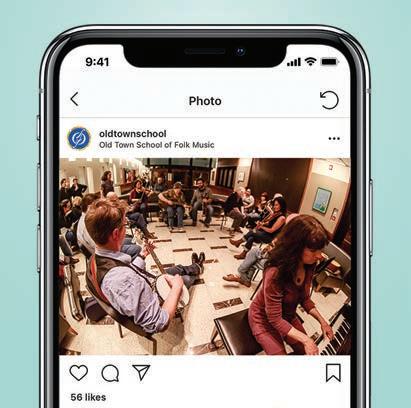
We are so thankful to be part of the wonderful and supportive arts community in Chicago and are especially thankful for all our dedicated students and teaching artists persevering with us during this time.
For updates, rescheduled concert info, ways to help support our staff & more please visit oldtownschool.org/alert
Stay safe, sane, and keep on playing from all of us at Old Town School of Folk Music!
oldtownschool.org




















MARCH 26, 2020 - CHICAGO READER 9
BOBBY SIMS
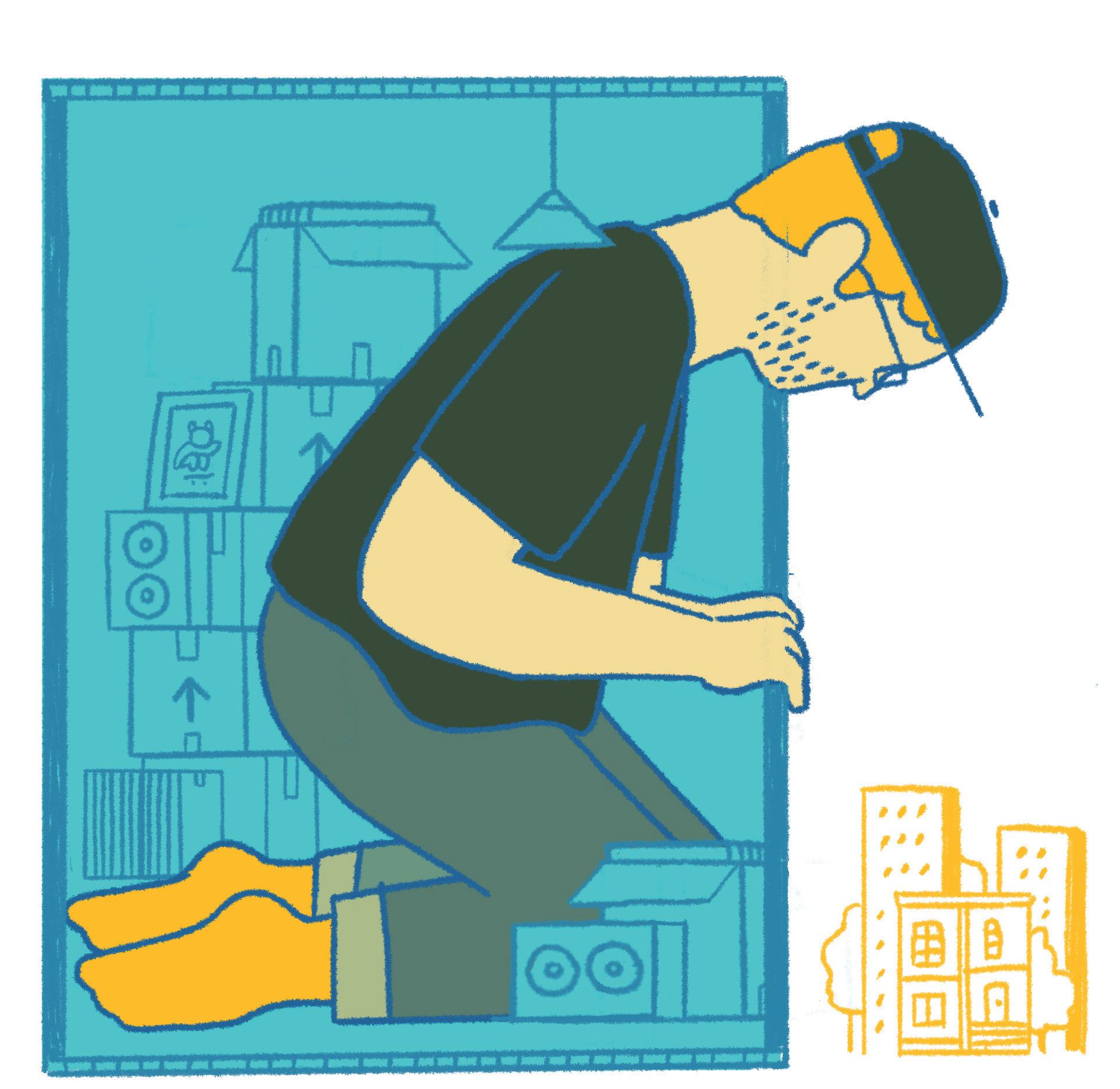
10 CHICAGO READER - MARCH 26, 2020 ll
ISOLATION essays on
MAYA DUKMASOVA
THE VIOLENCE HAPPENED elsewhere. Forces of nature and laws of physics had converged to fling the one-ton gray Lexus so hard against a tree or a pole that the car was pinched from the passenger side with the ease of origami paper. I came across the wreckage on Wednesday evening, the first full week of the coronavirus quarantine. It was jarring to see this mangled vehicle sitting abandoned, out of context, in the deserted parking lot of Foster Avenue beach. No glass littered the concrete. The roof of the car was gone, sawed o . The hood was mostly ripped up o the engine, its remnants crinkled up on the passenger side. The driver’s-side wheel was mostly o its axle. Both doors on the driver’s side were ajar; the others were smashed into the interior by the impact. The trunk was still mostly closed; nothing was visible inside through the cracks. The interior of the ES 300 was high-end black leather—in remarkably good shape despite the fact that this car, as I later learned, was a 1995. A purple McDonald’s sauce packet was nestled in the back of the driver’s seat. The airbags hung drably from the steering wheel and what remained of the passenger door. There was no blood. Was it possible that someone survived this accident? Was it even an accident? Why was this car sitting in this parking lot?
Something felt o . Like suddenly one of the curtains that hangs on the side of the stage to hide the actors preparing to enter and the tables with props and the ropes and ladders and exposed brick walls from the audience’s view had fallen. It felt like the proverbial glitch in the matrix not only to see the car but to be able to approach so closely, examine every angle, even touch it. A couple of beat cops were parked in a cruiser nearby, filling out reports. They said they didn’t know anything about the car.
When the state functions in a normal way, we’re not supposed to see such things. Systems and protocols are in place to make sure that when a car accident happens its signs are cleared quickly and e ciently, so that tra c and life can continue to flow uninterrupted. We may see a broken tree, a smashed guardrail, a collapsed light pole, but those are only footprints of the violence. We’re used to rubbernecking at wrecked cars as we drive, but they’re typically protected from close view by yellow tape, by a bustle of first responders and their vehicles, by the flow of our own journeys. As the rhythms of our lives and of the state are disrupted by a pandemic, was the wrecked Lexus a sign of the authorities’ inability to continue putting on their regular show? Or had I wandered backstage inadvertently to see what I would frequently see if only I took walks every afternoon of my life?
Plenty of people in Chicago already know what it’s like to receive a second-rate performance in a rickety theater from their government. There are neighborhoods where not only wrecked cars but human bodies are left lying in the streets for far too many hours. Maybe now every part of town will get a taste of what it might be like when the state has other priorities than making us feel comfortable. When crises happen the garbage might not get picked up, the mail might never arrive, the car wreck might not be cleared. Might the coronavirus give all Americans a chance to experience how people live in much of the rest of the world?
I found a record of the accident on the city’s tra c crash data portal. It occurred at 12:24 AM on March 18. The driver was alone. The wreckage was towed to the Foster Beach parking lot by the Department of Streets and Sanitation. I called the Chicago Police Department, whose media affairs staff is still required to come to the o ce, and gave the plate number to a friendly public information officer. She
told me that the driver, a man, was inside the car when a patrol o cer came across the scene of the crash on the 5200 block of Lake Shore Drive. The o cer called EMS and spoke to a witness, who told him that the Lexus “passed them at a high rate of speed while traveling south. Vehicle ran o the road, rolled multiple times, and struck a tree before coming to a rest.” When the fire department arrived, they cut the driver out of the car and transported him to Illinois Masonic Medical Center. The driver was conscious and told the o cer that he was involved in an accident. CPD couldn’t share the driver’s name. I called the hospital to see if they’d tell me if he made it out alive. They wouldn’t, since I didn’t have a name. Then I called the Cook County Medical Examiner, where the spokeswoman was relieved to field a question that had nothing to do with COVID-19. They had no records of deaths stemming from incidents on Lake Shore Drive since the 18th. The guy must have made it.
Still, I wondered about the car. Why did I see it there, some 18 hours after the crash? I called Streets and San, where an operator said, “No one is here to talk to you guys,” then hung up. I eventually reached spokeswoman Cristina Villarreal by e-mail and phone. Turns out normal city protocol is that, postaccident, a vehicle will be left in a public spot like the beach parking lot for five days. If the owner doesn’t pick it up in that time, the city stickers the car with a seven-day notice, and if the car still isn’t picked up, Streets and San then tows it to a city lot. “That’s in normal times,” she clarified. Since Mayor Lori Lightfoot suspended all towing last week, the car would just stay where I saw it. If it was gone, the owner must have had it towed. Unless of course there are still scavenger towers out there, collecting abandoned cars for scrap or to attempt to shake down insurance companies. So maybe no curtain had fallen. Maybe everything had proceeded as normal after the
driver of the Lexus flipped his car o the road. Still, less than a week into a pandemic-spurred lockdown, one wonders what the state will and won’t be able to do for us as more people need emergency care, lose their minds over social isolation or watching loved ones die, drink and drive out of boredom or desperation. It seems naive to expect all the curtains to stay put around the stage.
A few days later I walked back to the spot where the mangled car had been resting. It was gone. All that remained of the disturbance were a few patches of turf imprinted by tire treads and a rainbow rivulet of oil and chemicals flowing endlessly toward somewhere lower.
KAREN HAWKINS
I ALMOST, BUT don’t quite, miss the Bucket Boys. I am a reluctant resident of downtown, and almost overnight, all of the things I gripe most about living here are gone: the ricocheting bang-clickety-bang-bang of the buckets, the amplifier of the singer my partner and I call “Sam Smith guy,” the beep-beep-beep of heavy construction equipment, the chatty din of crowds of tourists. Every retail business within blocks is closed, nearly every office tower is empty, and State Street, that Great Street, is eerily quiet. It should be peaceful, but it feels like the beginning of a horror movie. I hate horror movies. And not just because the Black lady always dies first.
In Coronavirus: The Movie scene two, our heroine wakes up to a city rendered invisible by fog. This morning from my high-rise perch, the fog was all I could see. No buildings in front of me, no street below, nothing but gray mist that felt strangely sinister, like the whole city was being slowly suffocated. I hate this movie, but I can’t change the channel.
I grew up on the south side of Chicago and
MARCH 26, 2020 - CHICAGO READER 11
What staying at home has taught us about our city and ourselves
in the south suburbs, and I intentionally claim them both, largely so I don’t have to backtrack when I’m asked, “What high school did you go to?” I can reply “Homewood- Flossmoor” without feeling like a poser. I have distinct memories of loving downtown when I was a kid. On nights when my mom worked late at Wabash and Monroe and my dad drove to pick her up, I always volunteered to ride with him so I could gaze up at the sky-high buildings in awe. Downtown Chicago will always be beautiful to me. But without its people, it’s become the most staid wing of a museum—sterile, silent, and flat. My Chicago, your Chicago, isn’t a museum. It’s a party. A never-ending block party full of friends, relatives, tourists, that guy who brought cheap beer but is making himself fancy-ass cocktails with other people’s liquor, your uncle who’s barbecuing even though it’s 30 degrees outside, your girl who arrived already a little bit tipsy, proclaiming “Comin’ in hot!”
In Coronavirus: The Movie , someone has called the po-po on this block party and sent everyone packing. You ain’t gotta go home, but you gotta get the hell outta here. No, scratch that, just go home. And stay there.
I often railed against you, downtown, but I’ll never take your vibrancy for granted ever again. When all of this is over, I may even start tipping the Bucket Boys.
RACHEL HAWLEY
I CAN’T HELP but think of that Sondheim line, “Everything’s different, nothing’s changed.” When I go for long walks in the evening, I see people carrying groceries and walking their dogs the way they always have—the neighborhood feels completely undisturbed. But then there are the headlines that tumble around in my head like pennies in a dryer as I walk: “First Coronavirus Death Reported, Governor Announces”; “Markets Plunge as Global Recession Appears Almost Inevitable.”
I moved to Chicago in September to hunt for jobs while finishing my last college classes. Among my friends, mostly recent college graduates, the lines drawn by this situation are particularly clear. For those who have jobs in industries not impacted by the virus, who can work from home, the biggest complaints are stir-craziness and concerns for family members; for those in the service industry or with gigs related to live performance, hardwon jobs have evaporated overnight, leaving finances severely strained.
If there’s any silver lining in this crisis, for me, it’s that the complete uncertainty of anything beyond the present moment has allowed me to focus more on being creative in my approach to designing this paper. I’ve found myself sketching out ideas in my notebook at night, when it’s too late to go out walking and I’ve already rewatched my fill of Breaking Bad.
Being in quarantine has crystallized how lucky I am, not only to have a job with security and paid sick leave—the things that every person could and should have in a just society—but also to get to do something I enjoy and find meaning in.
LEOR GALIL
WE’VE BEEN TOLD to refrain from a lot of normal activities in an attempt to stem the rise of COVID-19 infections, and yet the guidelines are slippery enough that I cannot figure out how to go about moving into a new apartment next month. I haven’t moved since 2013,
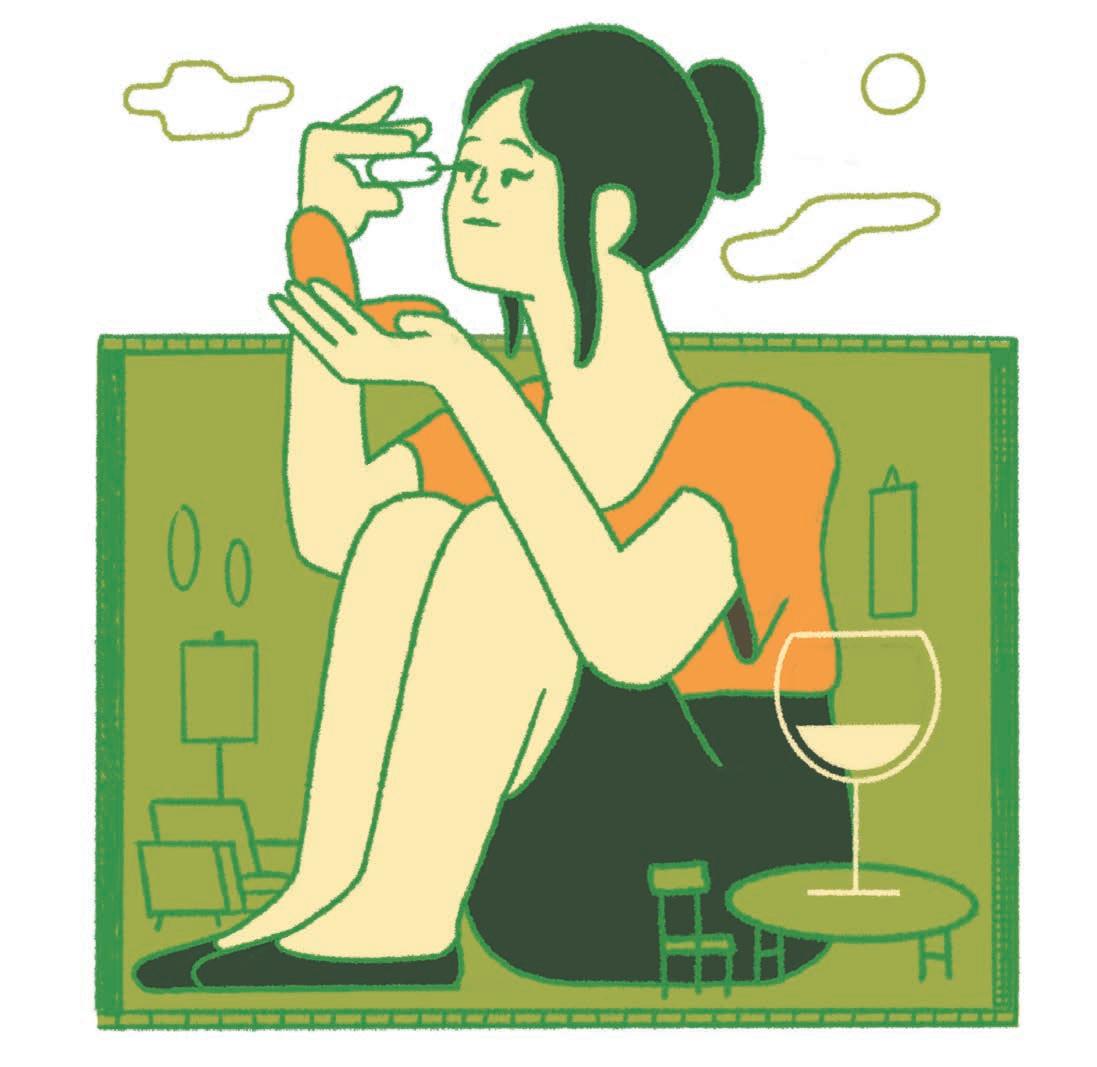
12 CHICAGO READER - MARCH 26, 2020 ll
continued from 11
when I stumbled upon a cozy two-bedroom Logan Square apartment that’s long felt like my secret world. I’ve got friends who live in the building and on adjacent streets, and it’s close to the neighborhood’s main thoroughfares but far enough away that I feel comfortably secluded. As much as I love exploring Chicago and visiting other neighborhoods—and love that the Reader encourages me to get to know this city better—I have definitely spent several days in a row barely venturing outside of a three-mile area around my home. Even when I go on routine runs for exercise, I can comfortably circle a nearby park for a breezy five-kilometer outing.
My day-to-day hasn’t been disrupted much by the virus. I’ve long been accustomed to working from home, and too frequently have to rely on conducting interviews by phone to keep up with fast-moving deadlines. I’ve recently had so much trouble keeping up with my workflow that I’d been spending nights when I’d hoped to see shows sitting in front of my computer transcribing interviews. In this regard, social distancing feels like an extension of an intense period of work I thought I’d just managed to shake o . I miss spending time with my friends and going out to see musicians whose songs have carried me through long, uncertain days, but it’s heartwarming to witness the various communities I participate in find ways to mitigate our economic and social pains. If only our federal government could be as empathetic.
In the middle of all this, I’m having a dicult time putting my arms around the thought of uprooting my habitat and moving to a new apartment. I’m excited by what lies ahead. A bigger apartment in a two-flat occupied by the landlords, a genuinely considerate couple who’ve done a lot to make me and my girlfriend feel cared for and welcomed. I’m not excited about the prospect of moving. Part of the reason I’ve lived in the same apartment for so long is I thoroughly dislike the prospect of transferring my life from one place to another; I spent nearly seven years trying to put all my records and archives in their right place, all to box it up and figure it out in a new place. And that’s not factoring in the extensive cleaning regimen we’ve all undertaken after every trip outdoors, or how the “shelter in place” order may a ect my ability to load a friend’s car with boxes of books and records to bring them to my new home.
The concept of moving on its own spikes my anxiety levels, but doing so in the middle of a pandemic feels so unreal I don’t know how to react. It doesn’t quite feel like it’s happening
to me, though I realize that will change the more I box my books and LPs up in the dwindling number of containers we have at our disposal. Work increasingly feels like a welcome distraction. Except transcribing; that’s still a drag.
BRIANNA WELLEN
ON THE SECOND Thursday of self-isolation, I used bleach to get red wine o my white living room wall. It was strange for many reasons, one of them being that the wine in question had been drunk on Tuesday. I’d spent the next day in my room, working and watching and living from bed, ignoring the rest of the world (my living room included). This isn’t my first rodeo. I’ve self-isolated before. Almost exactly five years ago last week, I was diagnosed with Hodgkin’s lymphoma and spent the next six months in chemotherapy and mostly in bed, working from home (because I could never not work), swiping on Tinder with no expectations, watching every season of Law & Order: SVU, and physically interacting with no one. Back then I felt like I was missing out on the entire world happening around me.
I felt miserable; my 24-year-old body was literally failing me. My friends were out partying without me and, more important, creating without me. I was too exhausted to go to shows, to make art, to dance, to walk to the kitchen to make myself a cocktail, let alone drink it. My friends were wonderful, and they checked up on me, but they had their own lives to live, other walkers of the world to interact with. When the isolation hit this time, I had a moment of PTSD: a trigger went o that made me think it would be that way again, that I would be left in the dust. I couldn’t have been more wrong.
I’ve talked to more friends. Thanks to technology, I’ve been able to see them perform their jokes and music and art more than ever before. I’ve kept in touch with my parents. I put on a full face of makeup and a skirt with pockets just for me. I cooked a meal . If you know me well, you realize that this is a huge accomplishment. This isolation is much different than before. And even though it seems scary and hopeless at times, at least I can have a glass of red wine whenever I want.
YAZMIN DOMINGUEZ
I REMEMBER NOT having a good time. Something happened that turned my mood
sour, and I abruptly decided that it was time to leave the party. Before I walked out the door, I saw my friends playing beer pong, holding cups, and sitting on couches socializing. I glanced around the room and my gaze landed on my best friend Lee. He was laughing. I felt bad not saying bye to him, but screw it, I thought, I would see him soon anyways. We had just made plans to go out next weekend. That was the last time I would see him alive. A few days later I learned that Lee was in the hospital. He had an anoxic brain injury and was on life support. I was asked if I wanted to say goodbye before they pulled the plug.
As the coronavirus has rapidly spread in the United States, the number of those infected is rising, and so will the death rates. I can’t help but wonder how many people will unknowingly have a moment like I did. A last moment with someone they really loved who might unexpectedly be the next victim of COVID-19. Right now many of us are scared. We FaceTime our friends, we answer all of our mothers’ calls. We have decided a mass quarantine was the best decision for the general safety of the public. Social distancing, a phrase that many didn’t know, is now on repeat. We are alone at home with our partners, parents, and roommates, or maybe riding it out solo in a studio apartment. As we hunker down, I can’t help but think of the most heart-wrenching lesson of my life and wonder how many people around the world will be learning it soon. I hope that after the coronavirus has passed, we as a society are humbled enough to realize how easily life can change. That every time we say “See you later” we in fact see them later, and that every goodbye is said meaningfully, almost as if we were to never see them again.
S. NICOLE LANE
MY LIFE BEFORE the Reader was like this, minus the constant handwashing, food hoarding (which I don’t condone!), lack of hugging, and increase in phone calls. Being a freelance journalist taught me how to get shit done from my couch. My biggest adjustment over the past year and a half has been commuting to an o ce and wearing jeans for eight hours. But now, as we hurtle into the second week of self-isolation, I have to admit that I’m drained. Working in media means being bombarded with the news of businesses shutting down, friends being laid off, art shows being canceled, and the health crisis escalating, which has now locked us into our shelters.
I’m anything but bored in isolation. I’m
overworking myself, but hey, I’m a Virgo. It’s in the damn stars. I’m putting in overtime because, like when I freelanced, I’m not clocking out. The first few days, I went for several walks around McKinley Park (the New York Times says it’s fine). But now I’m a bit stifled by fear, paranoia, and stress. I stopped walking and started to hit my yoga mat. I’m trying to shake a five-day headache. And yesterday, after some panic, I stocked up on goulash and curry, remained hydrated, sanitized obsessively, and participated in sun salutations every few hours. That’s really all I can keep doing. I’m taking my social distancing seriously. I’m refraining from social gatherings and I’m learning how to live next to my partner.
Isolation has nursed my depression, cuddled up right next to it, for God’s sake, and demanded more attention. But isolation has also taught me that even while inside, Chicago is loud as hell. Local artists, musicians, yoga instructors, DJs, and small business owners are coming out for one another while staying in. From confined spaces, we connect through social media, Instagram Live, FaceTime, Zoom, and whatever the hell else to lean on one another. This is the time to really relish what Chicago is doing. I look out of my window and see no one, but I know that behind all those doors Chicago’s artists are mixing up something good.
DEANNA ISAACS
YEARS AGO, WHEN I realized there wasn’t going to be enough time for everything, I pretty much gave up television. News, yes. Anything else, no. Never saw Sex and the City, or Mad Men , or Game of Thrones, let alone The Apprentice. I’m telling you this because of the many changes the pandemic has brought to my daily life—the insecurity, the isolation, the cooking—the biggest one so far is this: I can’t take my eyes o the jaw-dropping events unfolding on television. I am glued to it, day and night.
It could be worse, of course. The coronavirus, floating around in snot and sputum and looking like a cannonball from outer space— all evil wrinkly gray matter and crimson polyps—could land on me or someone I love. It could make us very sick. And then, without enough hospital beds and ventilators to go around, and no treatment for it anyway, it could kill us.
That’s the reality that has us holed up in our bunkers, keeping an anxious eye on the tube. I’ve watched Governor Pritzker and Mayor
MARCH 26, 2020 - CHICAGO READER 13
continued from 13
Lightfoot as they progressively put the city to sleep: restaurants and theaters shuttered; schools closed; crowds limited to 250, then 50, then ten; a plea to stay home, followed by a mandate to do so. On CNN and MSNBC, American doctors are pleading for face masks; folks running fevers say they can’t get tested; and convoys of trucks are carrying co ns to crematoriums in Italy. And on CNBC, where the increasingly desperate interventions of the Federal Reserve were described this morning as “whack-a-mole,” you can watch the financial markets react in real time to the latest news. Whooosh—the entire $11 trillion Trump bump, vanishing into the ether from which it came.
Trump’s press briefings, running to 90 painful minutes of self-congratulation, look like a misfiring satire with a now-familiar cast: the pu y orange pooh-bah; his bloodless zombie vice president; and (usually) the nation’s infectious disease guru, Dr. Anthony Fauci—a gravel-voiced dead ringer for Alfred E. Neuman and the only trustworthy person on the podium. What is Fauci thinking as he stands there—eyes down, arms crossed—while Trump pronounces himself a “wartime president,” rates himself a “ten,” and refuses to implement the Defense Production Act, allowing demand to drive up the price of the personal protection equipment vital to health-care workers on the front lines? On Sunday, New York governor Andrew Cuomo said face masks that used to cost 85 cents each are now going for $7, and “we’re competing with other states, and, in some instances, other countries” to get them.
Someday the whole story of why we’re months behind on the coronavirus curve that Trump now wants to bend will come out. Meanwhile, history’s unfolding on television. It’s a train wreck, and I can’t stop watching.
JANAYA GREENE
MY DRIVE TO work is not long, though notso-cautious drivers tend to get expletives from me on occasion. As any Chicagoan can tell you, driving down Lake Shore is one of the most beautiful ways to experience Lake Michigan. Whether it’s frozen or roaring like the nation’s third ocean, the lake is enough to uplift the most terrible of moods. Yeah, it may not span to the other end of the earth, but it grounds me. Life obstacles are really real, but the world is much bigger than myself and my problems.
These days, Lake Michigan has been absent from my life. Even before the governor’s stayat-home order, I didn’t feel comfortable leaving the house, despite o cials saying it was OK to get fresh air by going on a walk. Having to leave the house to submit my primary ballot and grab some food put me in a panic. As soon as I have to enter a public space, I sweat un-
controllably because I know I’m at risk. (I also know being hungry is not fun.)
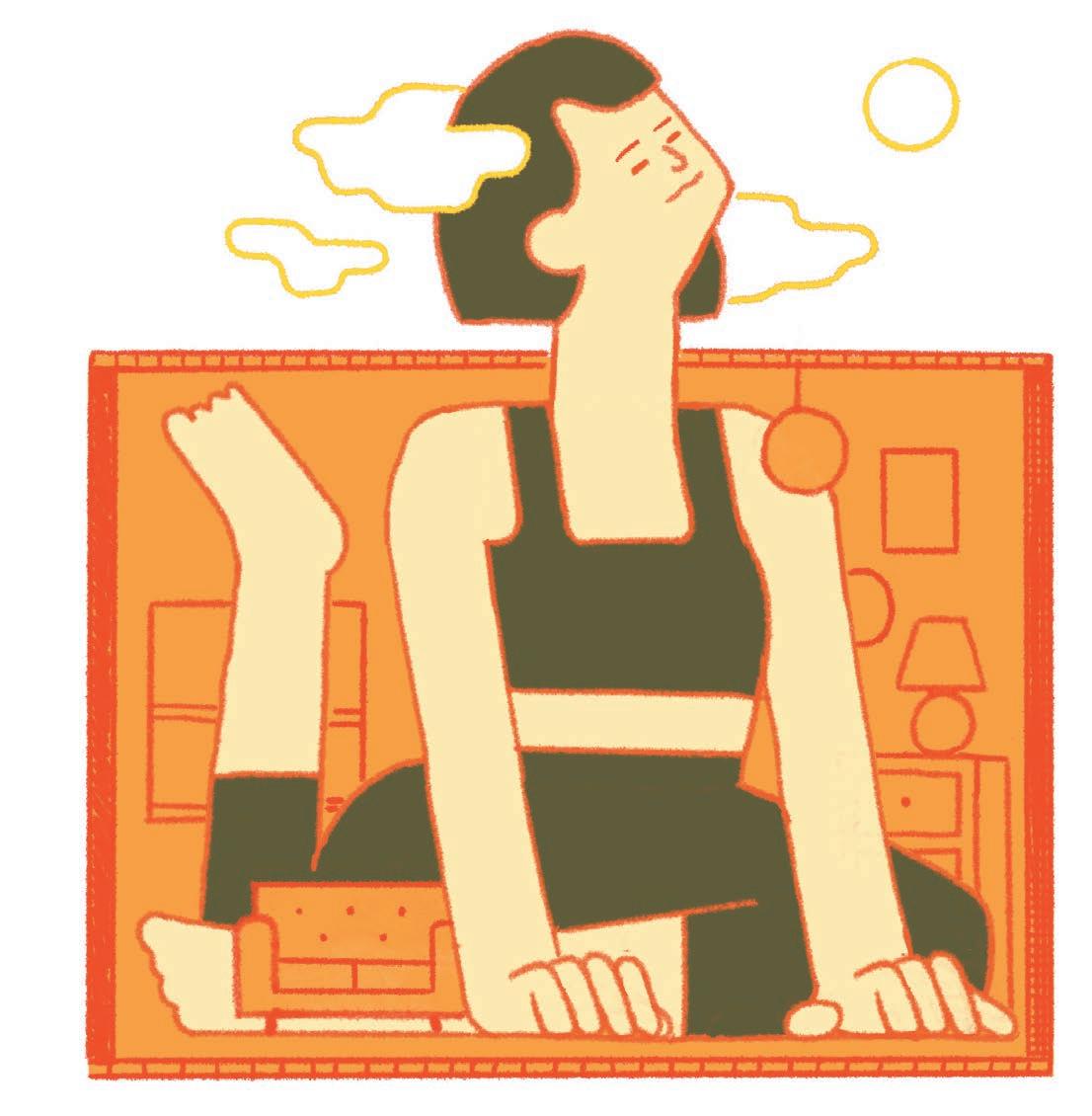
Luckily for me, before the shutdown, I got a cat. I’ve said I’d get one for years. I’ve honestly been scared since my first cat, Butterscotch, ran away when I was in grammar school. But after cat-sitting and a free pet-adoption event at Chicago Animal Care and Control, I had an
epiphany: Why not?
My furry friend is Juniper. She’s the feistiest feline I know. We play when she wants to play, which is typically at 6 AM. She will absolutely bite you if you try to touch her while she’s cleaning her coat. Doors mean nothing to her. A case of the zoomies is all she needs to burst into my room. Naps are life. One thing I did
14 CHICAGO READER - MARCH 26, 2020 ll
not expect was to be licked almost constantly. When I first met her, I fell in love because she purred and licked my hand after she smelled it. I didn’t realize I wasn’t special: it’s how she greets everyone and how she lets me know it’s time to relax.
Spending time with Juniper, playing with her, pleading for her to stop licking me, and cleaning out her litter are keeping me focused. I have a little being to take care of, and oddly enough she’s reminding me that the world is bigger than me. She’s reminding me that taking care of each other, in the ways we can, can be the healthiest practice of all at this time. (Minus social distancing. Please social distance.)
SALEM COLLO-JULIN
THERE WAS A bouncer in the toilet paper aisle at the drugstore by my house. She was a regular employee of the store, who I recognized from my twice-weekly trips there in “regular times.” But this weekend her managers seemed to have instructed her to stand nearby and block people from getting into the aisle while her coworker frantically tried to unload a case of paper goods. This stuck out as odd because at the time I was one of three customers shopping, but I kept a few feet of distance and asked her to throw me a fourpack of two-ply. She rolled her eyes and did so.

My dog is loving life in a lot of ways because I’m working from home, but he doesn’t understand that I can’t work from the couch where he can sit beside me and bury himself in blankets. I still go outside for dog-walking time, but it’s rare for me to see other walkers—this is a car-centric neighborhood, after all—but when I do, we wave and say hello as usual. A lot of my daily interactions haven’t really changed so far. “I’m going to the store, d’ya need anything?” is a pretty common phrase between me and my neighbors anyway, but I suppose it comes with a little bit more weight during a shelter-in-place order.
I thought that I was pretty good about keeping in touch with people, but it feels like I’ve heard from a ton of friends in the past few days: phone calls about the executive order, text threads with photos of our yards, a Google Hangout with my volunteer group, and a Zoom with my support group. It’s fun to see and hear people while they’re navigating technology, and catch them checking themselves out on the video feed. I find it comforting to think about people still worried about their hair

or whether or not the angle of their laptop frames their face in the right way. In the face of pandemic, why not ask, “Do you think I should get bangs?”
TARYN ALLEN
I HAVE CALLED Chicago home for exactly 143 days.
The stars seemed to align to get me here too. In the span of a few weeks, I was reunited with my long-distance girlfriend, we both started steady salaried jobs, and we signed a lease on our first apartment. If you do the math, you’ll realize that 143 days ago was the beginning of Chicago winter—a dark and dreadful time about which I was intensely forewarned—but despite the cold, my first few months here could not have been better.
Thanks to the Reader , I was immediately plugged into some of the city’s finest food, communities, arts, and culture. Even better than free tickets to theater and VIP concert access, however, were the simple pleasures that Chicago allowed me to fall in love with: riding the train through downtown, cooking late dinners with my favorite person, discovering local hidden gems, the list goes on and on. Life felt too perfect to be real. Of course, complete happiness has a unique sort of fragility to it— like anything, at any moment, could shatter it all right before your eyes.
Still, I never would have guessed it would be a global pandemic that would do so.
Though I’m healthy and working from home with so many comforts, there’s a sort of spooky and indescribable way that things feel di erent. A lack of commute means that I get extra sleep, but it’s not always restful. I celebrated my girlfriend’s birthday by (guiltily) taking her to a nearly empty restaurant. A scary Twitter thread made us cry, for God’s sake. For every TV binge, every laugh, every familiar cup of coffee, there are a dozen reminders that the future is uncertain.
I can only hope that in the coming weeks and months, Chicago stays strong enough to outshine the darkness still on its way. There is such a wealth of talent and information here, and I’m lucky enough to be with the Reader, which feels very much like an epicenter of that. I want to maintain hope in everything, in Chicago and Chicagoans, in media and creativity. I just have to believe we’ll all come out stronger on the other side. One hundred and forty-three days in this city is certainly not enough.
MARCH 26, 2020 - CHICAGO READER 15
v VINCENT RESTAURANT | ANDERSONVILLE, CHICAGO COMIDA! Packaged meals available for FREE for pick-up Suggested donation to benefit industry workers 1475 W. BALMORAL AVE. Visit vincentchicago.com or find Vincent Restaurant on Facebook for schedules, menus, and other details
From Catholicism to comedy
Cameron Esposito revisits her defining moments in the memoir Save Yourself
By ZACH FREEMAN
Comedian Cameron Esposito has never shied away from talking about her personal life onstage. In her reflective new memoir Save Yourself (Grand Central Publishing) she dives even deeper, looking back on her childhood in suburban Western Springs and the personal self-discovery that came with recognizing her own sexuality, coming out to her parents, and finding a home in the comedy world. Lockdown is a good time to indulge in a read that’s both heartbreaking and heartwarming, with a heavy dose of laugh-out-loud humor.
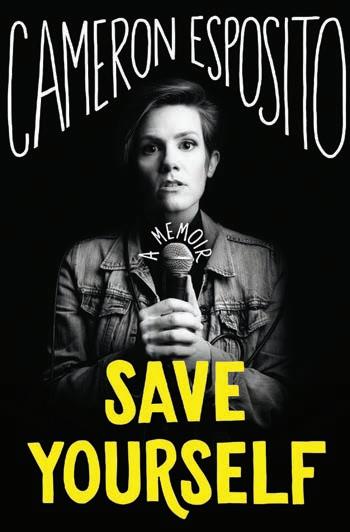
It seems like your work over the last several years has been getting more and more personal, from Marriage Material to Back to Back to Rape Jokes as well as your show Take My Wife , and now this book. What’s led you down this path of public self-examination and openness?
I think that is a path that actually many comics walk. I started out doing stand-up and I wanted to comment on the stuff around me, and I think over time it just feels less and less helpful to talk about other people and other things and more helpful to talk about yourself. Because the thing that’s universal in stand-up are the feelings, not the experiences. Speaking honestly about your feelings is kind of really what everyone is showing up for, it’s just that sometimes that’s so couched in sarcasm or distance that you don’t even recognize it as that. But that’s really what stand-up is. It’s a bunch of people standing around being like, “I feel this way about this.”
What was writing a book like for you?
Demoralizing in every way. [ Laughs. ] It’s isolating. It’s incredibly frustrating, because there is no feedback to get. I’m used to a live medium. It feels self-important. It was sometimes extremely harsh to live through some traumas that happened in my life that are included in the book. But also it was pretty amazing to revisit my younger self and fi nd
a lot of affection for myself. I don’t know if you liked yourself as a kid but I found myself humiliating, so to go back and meet that kid and realize that I was actually pretty awesome? I knew who I was. I had stuff I was into. I was really doing my own thing with gender nonconforming interests and presentation. And I kind of love that kid actually.
What do you hope people take away from the book?
I think for some straight people marriage equality happened and folks think everything is sorted out and so then they can’t understand when queer folks are talking about ourselves as still a marginalized community. So I hope there are some straight folks who read this and get a better handle on what is happening right now for the queer community.
And I also hope that there are queer folks who read this and feel seen in that experience. I also hope people laugh their heads off: I think there’s some really funny stuff in here.
What was the difference in cra ing the language for a book versus cra ing language for your stand-up?
I think I was, without realizing it, sort of performing the book in my head as I was writing it. And then essentially kind of transcribing. I wasn’t looking for it to be a setup/punchline situation but more so I think I have a particular way of speaking and I wanted the book to sound like it was written by me. So I did sort of talk my way through it. Which might not be how other writers are doing their work, but it was like translating it; doing it first in the performative language and then translating it to the page.
You talk about internalized homophobia in the book—do you have a message for people who are working through that themselves?
I do not know a queer person who isn’t strug-
gling with that. I think we deal with it for the rest of our lives. When you’re inside of a system that marginalizes you on a daily basis across all vectors it’s impossible to not be a part of that system. That’s really where Pride comes from is expression, trying to do whatever small thing we can to balance that system just a little bit and remember that we can love ourselves. But for queer people I would say if you are not sure if you look OK, if you don’t know what to wear to a fancy event, if you don’t know how to deal with the fact that your parents aren’t responding exactly the way you want them to, or you don’t feel like you fi t in the queer community because there’s a certain expectation about how your hair should look or how your body should look, that’s all of us. There’s nothing wrong with having those feelings of self-hatred. You’re meant to. We are all bred to. And realizing that can help you put them away, even just in the moment. Like that’s the system at work and so it’s just about identifying, “Oh, I feel shame because I was taught to feel shame.” And I don’t have to feel bad about that.
You talk about your relationship with your parents in the book and how coming out affected your relationship with them. What can parents do to let their kids know that they’re supported?
I think the biggest thing that friends or family can do is not center themselves in somebody else’s queer or coming out experience. So if you’re a parent: asking questions, listening. It’s not necessarily about what’s the thing that you say that’s the perfect thing. I think it’s about taking your feelings—if you have them—about somebody’s fi nding themselves and dealing with that elsewhere. Not making your kid or your family member be the one who helps you process your feelings. Because they’re doing enough work fi nding themselves.
In the book you talk about the world of comedy being more accepting than the world of religion in your experience. Do you think that stand-up comedy—where everyone gathers to hear someone speak—offers a secular version of the kind of community that organized religion offers people? One hundred percent. When I talk about the fact that I used to want to be a priest and now I became a comic, to me that seems like such a direct through line. It literally feels
like, “Oh, I ended up doing the same job!” because it really is about a group of people trying to figure out what is the most important thing. Like what are important things on the planet? The thing about religion is that most religions are corporations. That’s what the Catholic church is and so it creates corruption, self-interest and all the other things that happen when ideas are delivered by humans who are trying to preserve wealth and power.
What does the Chicago comedy scene mean to you in terms of your career and your style of comedy and how it evolved?
I do think that there’s a specific sort of talk-joking that is a part of my generation of comics and also some of the generation of comics ahead of me—like Kyle Kinane or Pete Holmes or Kumail Nanjiani—the way that those folks operated as stand-ups. That’s who I watched and I think influenced my style a bunch. A sort of super dry but powerfully delivered screaming your cultural criticism from a position of being shat on because you are from Chicago. That feels like it’s still very much a part of my style as a comic. v
@ZachRunsChicago
16 CHICAGO READER - MARCH 26, 2020 ll ARTS & CULTURE
LIT
Save Yourself
By S. NICOLE LANE
Not only is Illinois facing a shortage of surgical masks and respirators, so is the entire world. Bulk purchases of face masks have left many hospitals without the tools to effectively protect themselves and their patients. Those at the front lines—nurses, doctors, and health care workers—need this protective gear in order to reduce the risk and spread of COVID-19. A few days ago, the Centers for Disease Control and Prevention published a piece that suggested health-care personnel can create homemade masks as a crisis response to the shortage. This isn’t the first time DIY face masks have been called to action. In 2006, the CDC published a study on H5N1 which included a similar tactic for handmade face masks.
This news isn’t surprising, however, as U.S. surgeon generals warned the public in February to stop buying face masks, as they were straining the supply chain. American hospitals have taken a huge hit recently and although masks are only meant to be worn once and then thrown away, health-care professionals are given no choice but to rewear their supplies. As a result, hospitals are asking the public to donate materials.
In northwest Ohio, volunteer quilters from the Quilt Foundry are making around 5,000 masks to donate to hospitals who are running short on supplies. In Washington state, vinyl sheets, foam, and industrial tape are being used to create face shields as masks begin to disappear from hospitals. Last week, Rush Uni-
versity Medical Center began to use washable lab goggles for eye protection. Jackson Park Hospital nurses are refusing to enter rooms that don’t have masks. In McLeansboro, Hamilton Memorial Hospital is accepting fabric masks from community volunteers as disposable masks are back-ordered. Hospitals state that while fabric masks are less than ideal, it’s what they have to work with during this pandemic. Here in Hyde Park, locals are also banding together to create a similar impact.
Hyde Park resident and informed crafter Cheryl Miller says that “cloth masks made of two layers of cotton and fitting snugly can provide some protection from droplets in the air, and are better than no protection when a person has to get up close and personal in home health or other closer-than-six-feet situations, like shopping, riding the bus, etc.” Miller has been making masks for herself as well as for donation. “It’s reassuring to see other people wear masks too, and I believe homemade masks can help somewhat but my best e orts still aren’t as good as an N95,” she says. Therefore, social distancing is still the best measure to take during the pandemic, especially if wearing a homemade mask.
Dottie Je ries is making masks and donating them to Montgomery Place, home to 200 older adults, in Hyde Park. She’s working with new and old T-shirts and pillowcases based on the recommendation and data found by Smart Air. “I have also read that flannel works well for the side of the mask that is against one’s face, but at the moment, I don’t have any flannel,” she says. For Je ries, the hardest part of making and donating masks has been threading the needle. “I had not used my machine for 15 years,” she says. “So now I’m 15 years older!”
The president and CEO of Illinois Health and Hospital Association asked the state to donate their inventory of N95 masks to their local hospitals, which number more than 200 statewide. “We urgently need to find alternative supplies, no matter where they are, so our hospitals can continue to provide life-saving care to current and future COVID-19 patients,” he said in a statement. Although Trump and Pence said they would be sending tens of millions more masks to hospitals, it’s unknown when they will actually arrive and be delivered. As a result, the public has to step up. Only on Friday, a 38-year-old woman was charged with stealing breathing masks, hand sanitizer, breathing as-
pirators, gloves, disinfectant wipes, and much more from the University of Chicago Medical Center. Doctors and hospitals have started to tweet to the public asking for help during the supply shortage, calling all seamstresses, makers, crafters, or DIYers to get your hands ready for some mask-making.
FreeSewing released a COVID-19 face mask pattern for the public to easily download and create masks either for themselves or for the general public (they also have an active help chat room). The Netherlands-based project is run by Joost De Cock, whose wife is a surgeon and began to see the shortages of masks in hospitals. The duo posted a call for makers and provided a one-page PDF of a face-mask pattern.
So, how legit is a handmade fabric N95 face mask? While it is a last resort, it is entirely legit. Old-fashioned? Sure. “Prior to modern disposable masks, washable fabric masks were standard use for hospitals,” says Dawn Rogers, a nurse practitioner from Deaconess Hospital’s Patient Safety & Infection Prevention Office.
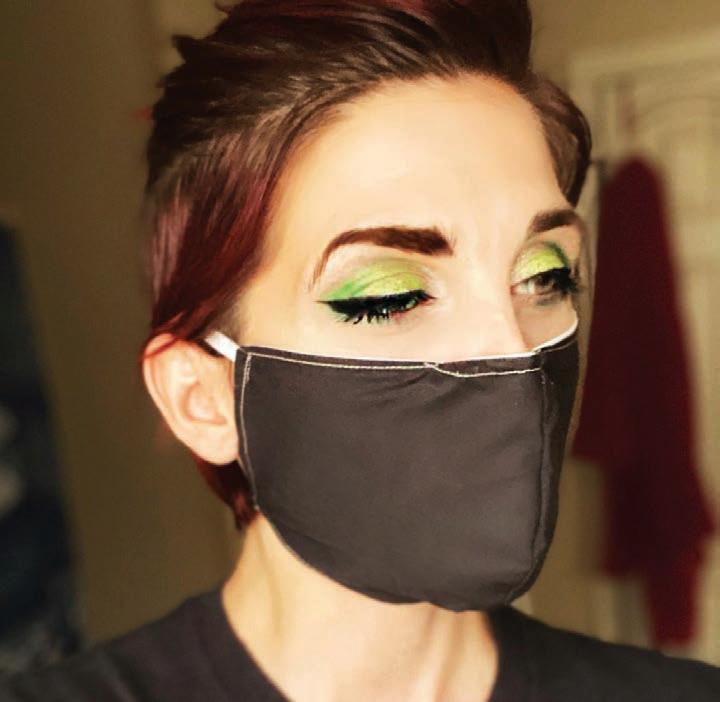
“We will be able to sterilize these masks and use them repeatedly as needed. While it’s less than ideal, we want to do our best to protect our sta and patients during this pandemic.”
Not all face masks are created equal. Emily Landon, the medical director for infection control at the U. of C. told CNBC, “First of all, there are multiple different kinds of face masks. There is the surgical mask that people wear that doesn’t really seal up very well. That’s super good if you put it on the patient who’s sick because that will contain their secretions and protect everyone around them.” However, if you want to protect others during this crisis, going old school may be the only option.
Data has found that homemade masks captured 50 percent of virus particles or more. Double-layering masks doesn’t help too much. Materials like tea towels, T-shirts, dish towels, and vacuum cleaner bags are the best-performing materials for a face mask; however, they are harder to breathe in. The priority is having some type of face shield that covers the entire front of the face, the chin, and the sides of the face.
People wearing masks must wash them after one use, but right now, hospitals are in crisis mode (the CDC recommended health-care personnel wear bandanas or scarves). With millions of masks needed, people are stepping up and toward their sewing machines. v
MARCH 26, 2020 - CHICAGO READER 17 ARTS & CULTURE
COMMUNITY Take your self-isolation to the sewing machineHere’s how DIY face masks can help our local hospitals.
Activist Katelyn Bowden in a homemade mask COURESTY KATELYN BOWDEN
@snicolelane
COMEDY

Jokes in the time of coronavirus


How soon is “too soon” when you’re living through it?
By BRIANNA WELLEN
I’m in a great position going into indefinite isolation, because I get to read jokes, like this one from Malic White (@malicwhite), on Twitter all day, every day: “Any queer who makes it through quarantine without giving themself a weird haircut wins 9 lives.”
While some people are avoiding social media altogether to keep themselves from having a panic attack, over the past handful of years I have surrounded myself with comedians on every platform. And let me tell you, even in the midst of a pandemic these comics are WORK-


ING. Lauren Harsh has been hosting a weekly virtual open mike called Cabin Fever. Scott Du has been hosting his own cooking show daily on Facebook. Podcasts are recording remotely, talk show hosts are monologuing to empty audiences, and the hilarious tweets and Facebook statuses have been multiplying like bunnies. But in these unusual times, is it even OK to be joking? How can you determine if something is “too soon” when you’re living in it every day? I reached out to some comics (virtually!) to get their jokes and thoughts.
Tessa Orzech @tessa_saysrelax
“Interesting to learn that a global pandemic was the only thing that could cure my FOMO.”
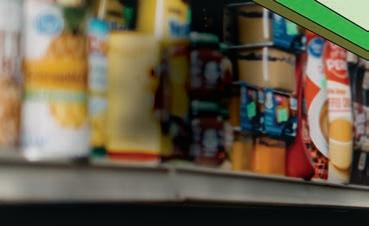

I definitely think jokes are appropriate, to keep us sane and laughing, but I really hate all the jokes that skew too dark. Like the doomsday ones, it’s like, alright this is too scary to make me laugh. We can joke about the way it’s affecting everyone’s lives, but it has to be funny, not just sad or scary. It’s like you can joke about the fact that you won’t see your friends for a month, but you can’t joke about the fact that one of them might be really sick. If you do go too dark during this climate, the joke actually has the opposite intention and it adds to the collective fear and paranoia. I think times like these separate smart comics from people who just want attention for their ideas. The whole point of comedy is to relieve the tension.

 Ryan P. C. Trimble @ryntern
Ryan P. C. Trimble @ryntern

“Sex with me is like COVID-19: it happened in Europe long before it happened here.” Mainly, as always in comedy, you CAN joke about COVID-19, as long as you’re not punching down. Like, am I going to joke about people suffering, or food shortages? No. I’ve already seen the community band together and do like, Skype open mics or stream canceled shows from an empty theater. I’m part of an improv group called Frogprov, which improvises in French and English, and we were supposed to have a show at iO at the end of the month. We’re now discussing the possibility of doing the show but streaming
it live from someone’s living room a er we’ve all quarantined for two weeks and know we won’t spread it to each other. Like, COVID19 isn’t a person. It can’t hear our words. That we know of!


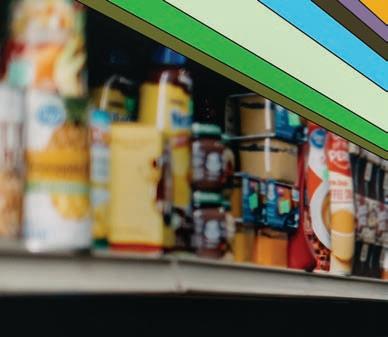










Kendall Klitzke
@kendallklitzke
“If only we had just called #MeToo ‘#SocialDistancing’ maybe it wouldn’t have gotten as much pushback.”
I think we definitely can. The best stuff I have seen is just making fun of anyone not taking this seriously at all, which I suppose people would assume to be an uncommon stance for a stereotypical comic to take. Also it’s mostly just comics making fun of other comics’ reaction to the pandemic, which is kind of a snake eating its own tail, but if you have a news feed that is entirely comics, it’s really evident. My only public joke on the matter was a tweet that went: “Customer touches me at work. Him: Oh wow. I guess I shouldn’t have touched you with all of the virus stuff happening. Oh yes, the virus. THAT’S why you shouldn’t have touched me.”
Amber Autry
@amberautrycomedy
“My boyfriend has been casually teaching me jiujitsu and now is scheduling ‘classes’ daily. I bought all these brownies for the lockdown and I’m being forced to exercise.”

It’s weird, I’m getting more opportunity to write, which I wanted but I asked myself today, “If I don’t want to write about coronavirus, what else do I wanna write about? Is anything goofy funny right now?” As of now I’m going to continue to write and trust myself. Laughter always prevails! v
@BriannaWellen
18 CHICAGO READER - MARCH 26, 2020 ll ARTS & CULTURE
DOME DUSSADEECHETTAKUL / PEXELS ENOUGH BREAD TO BOSS YOUR BOSS PLAY IN STORE TODAY!
A love letter to the Chicago theater community during COVID-19

These are desperate times, but look at what you’ve done so far.
By ALMANYA NARULA
Dear Chicago Theater Community,
This was not an easy article to write.
I recently had the pleasure of being part of a very important bit of theater called Teenage Dick , at Theater Wit. (I was the violence and intimacy designer.) Sadly Monday, March 16, was our last performance in front of a live audience for the foreseeable future given the current circumstance initiated by what I am calling the “b****-a** arts killer virus.” We fi lmed it and are now continuing the run remotely where patrons can view the
show online. We ended the performance with tears, laughter, standing ovations, and nothing but love from the folx who braved leaving their homes—the audience, the designers, the performers, and the entire team. We laughed and joked, thought about what could have been, and remarked that this would not be “the last time we worked together”—yet we all knew deep down that this could be it, for a lot of us.
As I left the theater, accompanied by some of the team, I looked back at the big, bold
poster reading TEENAGE DICK one last time and thought about how lucky we were to be able to tell the story in some capacity—even though it was not in the way we intended. When I was fi nally alone after parting ways with the team my mind inevitably began to wander.
I thought about all those theaters dropping out like flies. I thought about how Fast Company at Jackalope opened and then closed their run the following day. I thought about School Girls; Or, the African Mean Girls Play at Goodman, Intimate Apparel at Northlight, Kill Move Paradise at TimeLine, Dhaba on Devon Avenue at Victory Gardens, I Am Not Your Perfect Mexican Daughter and The Most Spectacularly Lamentable Trial of Miz Martha Washington at Steppenwolf, and Little Women at First Folio Theatre. All of these productions had something major to contribute to our theater ecosystem.
With 200some companies in Chicago all closing their doors and canceling their productions, it’s a rude awakening to the thriving theater community Chicago has had and how Chicago theater now faces the possibility of an incredible defeat.
But the heartbreak for Chicago theater doesn’t stop there. Along with shows getting canceled, companies are no longer able to fund their staff. Chicago Shakespeare Theater recently let go of a large number of sta members, from front of house to box o ce to production, due to its financial losses from the closure. Steven Tapas and Dianne Nora, former employees of CST, have since created a GoFundMe campaign called “Chicago Shakespeare Theater Workers Laid Off,” to raise funds and distribute it amongst the former employees.
Educational institutions have canceled their mainstage productions and senior showcases (a dream for many young practitioners trying to get a jump start into the industry) and moved all their classes online. For those going for an arts administration degree, online courses may be a smooth transition. However, for those pursuing a degree in theater arts or performance, this is far from easy.
Recently David Woolley, a former professor and mentor of mine, remarked “I have to figure out how to teach swordplay remotely!” While I have no doubt that the bold Je Award–winning fight master will come up with some unique experimental way of teaching stage combat to college students online (I can almost see a course title: “Combat in
THEATER
the Quarantine”), I can’t help but think that theater at its core is an interactive hands-on medium, and there is only so much theory out there.
Another loss for young professionals who are just entering the theater community is the opportunity to see Chicago theater at its finest. With the tumultuous political situation and a decade’s worth of struggle, it truly felt that this was the season of making bold statements. Directors from Lili-Anne Brown ( School Girls ) to Wardell Julius Clark (Kill Move Paradise), to Tara Branham (Little Women ), to Brian Balcom ( Teenage Dick )— each of their plays opened up gateways for conversation for people from all walks of life: POC, femme, queer, disabled. Whether via their creative team of designers, writers, and performers, or their subject matter itself, each of their plays was like an act of rebellion showcasing the will of the community and its need to defy the status quo.
Unfortunately, it seems like once again the powers that be have won, this time in viral form. COVID-19 is e ectively shutting down what could have been a revolution via art. Instead the lack of attention paid to this pandemic early on has erased the possibility of early containment, inevitably a ecting these artistic revolutionists’ livelihood.
While every artist is struggling financially (some more than others, as some theater companies are willing to pay out their contracts), no one gets into the arts for the paycheck. The reward for many theater practitioners is the excitement of knowing that you and your fellow artists get to be a part of di erent stories and put a unique spin on them. Many theatermakers lost multiple contracts all at once.
Conversely, some theatermakers have stated that they are relieved to hear that their contracts are canceled. This is far from shocking. In this capitalist society, artists are underpaid, overworked, and overbooked. Most artists work multiple jobs whilst sustaining multiple bookings simultaneously, with no time to stop and rest, just to be able to make ends meet. While the precarious thoughts of not being able to make rent in April still lurks over their heads, it’s no wonder individuals are appreciative of their overdue time o .
Being part of this theater industry comes with a certain level of uncertainty, not knowing when or where your next gig will be. This virus just amplified those anxieties for the entire community.
However, all hope is not lost . . . not just yet.
MARCH 26, 2020 - CHICAGO READER 19
ESSAY
Opening—and closing—night of Teenage Dick . The author is lower right. COURTESY THEATER WIT
Being on my fourth day quarantined in my apartment without any semblance of how long this confinement is going to last, I am allowed to spend a whole lot of time with myself and my thoughts. I thought about what drove me to be a part of the Chicago theater community and why so many of my friends continue to fi ght for their work within it. I thought about why no one ever leaves. Or if they do and somehow make headlines in Hollywood, they never fail to mention their beginnings in Chicago and attribute some of their best experiences to this community.
The latter part of the decade was very formative for Chicago theater and proved time and time again why this city will triumph . . . despite impossible odds.
Chicago theater has witnessed numerous scandals and upheavals over the past few years and it truly feels as though the entire community decided to act in solidarity against the powers that have been governing society in very brutal and toxic ways.
Let’s do a little recap for some motivational boosts, shall we?
We can begin with The Chicago Inclusion Project—founded in 2015 by actor–casting director Emjoy Gavino. This initiative is “a collective of artists, committed to creating inclusive theater experiences by bringing together Chicago artists and audiences normally separated by ethnic background, economic status, gender identity, physical ability, and countless other barriers.” The Chicago Inclusion Project has since been successful in aiding conscious casting and introducing upcoming artists who would usually not be seen by theater companies.
In the summer of 2016, an article by Aimee Levitt and Christopher Piatt in the Reader dropped regarding the abuse and harassment at Profiles Theatre—an open secret for many years. This caused an uproar within the community, and within two days, the theater (which had gone union with Actors Equity in 2012) had closed permanently.
Even before the Reader article ran, Not In Our House—an advocacy group cofounded by Laura T. Fisher and Lori Myers to combat sexual discrimination, harassment, and gender-based violence in a theatrical space—held a meeting to talk about these problems. In attendance were community
members from a multitude of companies, and through that, the Chicago Theatre Standards were created; a pro-community cultural document that details inclusive and equitable codes of conduct during a rehearsal process.
The document has since been used by almost every company in Chicago and other theater communities throughout the country.
This not only opened up large conversations on equity and representation across the nation but it also brought forth the importance of fi ght choreographers and intimacy directors. Intimacy direction at that time was still a newer concept to the Chicago theater community, but with the #MeToo movement just on the horizon, companies began realizing its necessity for the physical and emotional safety of their actors.
What followed suit was an abundance of examples where the Chicago theater community bonded in solidarity.
There was a chain of journalistic scandals including Hedy Weiss’s controversial remarks surrounding Steppenwolf’s 2017 production of Antoinette Nwandu’s Pass Over . A group of theatermakers formed the Chicago Theater Accountability Coalition as a first-response group to hold journalists accountable for racism and inequity, cofounded by Ike Holter, Kevin Matthew Reyes, Tony Santiago, Sasha Smith, and Sydney Charles. Their e orts were pivotal and generated conversation across the nation on e ective and equitable theater criticism.
In a similar vein, Regina Victor and Katherine O’Keefe founded Rescripted, an online publication by theater practitioners and for theater practitioners as a response to the severe lack of diversity within national theater criticism. Rescripted includes reviews, artist interviews, and essays on the performing arts. An ongoing series, “Dear White Critics,” was created, according to Victor, to call attention to insensitive remarks by white theater critics. The most recent installment ran a year ago, calling out the Chicago Tribune ’s Chris Jones for ableist sentiments regarding Chicago theater veteran Mary Ann Thebus’s use of a script while performing Doubt at Gift Theatre.
In 2017, theatermakers Tony Santiago and Dylan Toropov cofounded Chicago Arts Access—a platform through which patrons can purchase free tickets to art events around the city via their website: freetix.org. Since
its inception they have sponsored over 1,800 tickets to theaters of all sizes.
That same year, the Chicago Theatre Access Auditions (CTAA) was founded, with the intention of bridging the gap between non-Equity actors and Equity theater companies. The success rate of CTAA (which held its fi rst unifi ed auditions in 2018 with over 150 nonunion actors) has been encouraging, and non-Equity companies have also been part of the audition process, providing more opportunities for the actors who are often the lifeblood of storefront theater.
In August of 2019, Mark Larson published Ensemble: An Oral History of Chicago Theater . This is an in-depth historical account spanning 65 years in Chicago theater, told via interviews and fi rst-person perspectives illustrating the power of everyone in the larger “ensemble” of Chicago theater to be part of a collective and collaborative force. If you’re beginning to have any doubts about the state of affairs within the industry and need a shot of motivation, put this on your quarantine reading list.
Most recently, we’ve got theater artist Michael Turrentine’s podcast on Spotify and Apple, How’s Your Heart? In this podcast series, “Turrentine and his friends gather to discuss dating, sex, queerdom, all those feelings, and more.” The first episode was released on March 16, featuring much-in-demand actor and choreographer Breon Arzell. You can definitely count on me tuning in during this time of social distancing.
It’s hard to stay motivated and remind people of their triumphs during these uncertain times when many artists are filing for unemployment. But it’s times like these when we need to be reminded of our strength and power the most. Chicago theater has confronted a lot: harassment scandals, racial insensitivity, and otherwise-problematic coverage in the media, inequitable casting choices, and the ongoing economic hardships of making theater on a shoestring. It most definitely will overcome this, too. With everything that everyone has gone through to make Chicago theater the vital industry it has become, COVID-19 has nothing on us.
However, though we can take a moment to be proud of ourselves, we must also stay grounded and not give up the ground we’ve won.
I write this letter so that when we come
out of this, theater companies can learn the importance of keeping their actors safe in this overworked capitalist society. Don’t burn your collaborators to the ground. Theater artists want to create theater and they will continue doing so if you treat them with the respect they deserve.
I write this so that theater companies can reevaluate the shows they produce next season and take some time to consider how they can best support the community both financially and artistically.
I write this so that non-community members can see how hard these folx work and how important it is to keep funding these hustlers. So the next time you want to see a show to support your theater friend, maybe buy a ticket and don’t ask for a comp.
I write this so that every person who has looked down on the arts as a means of survival and has fl ocked to bingeing their favorite TV show the second they have time o work can realize the value of arts. A lot of these filmmakers got their start in theater, especially Chicago theater. If we catch you on the other side, go out and see a play!
But mostly, I write this for you, you beautiful Chicago theatermakers. We are in this together. So stay home, wash your hands, call your family, and breathe. Maybe start an online Shakespeare company, or fi nish that screenplay or play you have been wanting to complete. Catch up on that Netfl ix Original, and watch all the episodes of those assorted Dick Wolf shows that your Chicago actor friends were featured on. Do some yoga, spend time with your dog, stop eating ramen, and get more creative with your cooking.
Shakespeare allegedly wrote King Lear while quarantined in his apartment during the plague. However, you are not Shakespeare and if you would rather sit on your couch and do nothing for two weeks, so be it. You deserve it! You have been hustling for months, from gig to gig, balancing your day job with your artistic life, and for the first time in a long time, you have nothing to do, because there is literally nothing you can do.
It is like a high school summer all over again!
So relax. Recharge. Because when this is all over and we see you on the fl ip side, you are going to slay this town and show us that you are a fi erce theater warrior not to be trifl ed with.
You got this! v
20 CHICAGO READER - MARCH 26, 2020 ll THEATER
continued from 19
By KERRY REID
Steven Stra ord was supposed to be live onstage at Berwyn’s 16th Street Theater this month with a remount of Methtacular!, his solo chronicle of his three-year bout with meth addiction. But then COVID-19 happened, and the theater decided to go with a ticketed streaming version of a show recorded last year at Steppenwolf’s LookOut series.
Then again, given the story Stra ord has to tell, it’s amazing he’s alive at all. And at least this time, he’s missing a show for a reason other than being on a meth binge in a bathhouse for several days. (Spoiler alert: he lost that acting gig.)
Strafford’s been performing this tale at


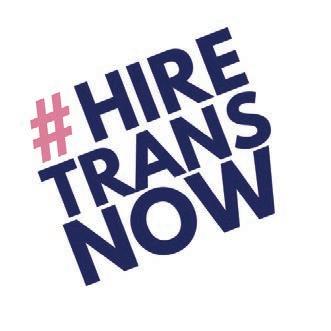
early aughts. (If you’ve been around the theater scene awhile, you can have fun playing fill-inthe-blanks with the shows and collaborators he mentions.) His family seems solid, at least judging by what we see of his loving mother in video interviews spliced into the show. Unlike a lot of young gay people, Stra ord wasn’t kicked out when he came out. His addiction, like that of so many others, came instead from a place of garden-variety nagging self-doubt, despite his obvious talents. Take a hit of meth, feel more confident and attractive. What could go wrong?
Oh boy.
theaters around the country for a few years, but the performance you can see through 16th Street’s website (directed by Adam Fitzgerald and with William TN Hall providing piano accompaniment for Stra ord’s musical numbers) doesn’t feel like a guy phoning it in. (HMS Media, which has been recording live performances in Chicago for years, did the admirable honors here; the visual and aural quality is excellent.) Rather, he exudes exuberance, leavened with David Sedaris–like dashes of self-deprecating snark. “I love formulas,” Stra ord tells us early on. “Like, Tuesday plus crystal meth equals Friday!”
Refreshingly, Stra ord doesn’t seem to have a backstory of deep trauma for why he fell into addiction as a young actor in Chicago in the
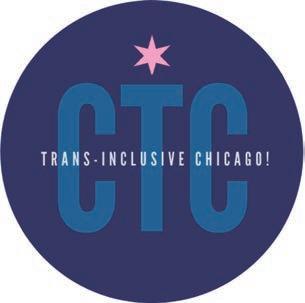
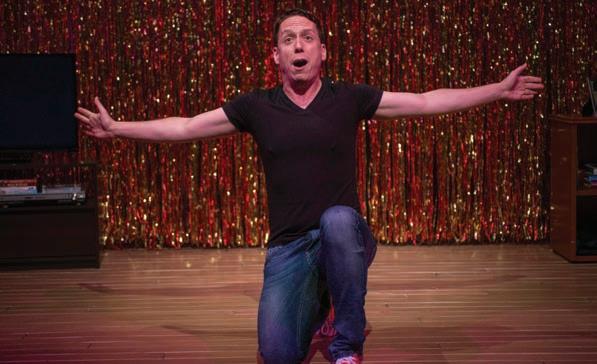
Through a series of increasingly fraught relationships with friends, lovers, and combinations thereof—including a nebbishy teacher who grows violent and a gun-toting dealer who lives surrounded by filth and feral cats—Stra ord takes us down the rabbit hole of his sex-and-drugs obsession. By working in clever musical bits and audience interaction, including a game show called “What’s My Meth?,” Stra ord finds ways to break down the navel-gazing nature of the autobiographical solo form. (The correct answer to a question in the latter is “Take apart the toaster and find out where the voice is coming from.”)
In these days of enforced isolation, maybe a solo show about addiction seems a perilous entertainment choice for some. But Stra ord, who beat his meth demon by what he can only describe
he admits he will never get over wanting to do drugs), o ers a surprisingly sweet and hopeful conclusion for anyone stuck at home, looking at themselves in the mirror: there is nothing wrong with you. v
MARCH 26, 2020 - CHICAGO READER 21
as luck (though
@kerryreid REVIEW The crystal shipwreck Steven Strafford’s solo chronicle of meth addiction streams online with 16th Street.
R METHTACULAR! Through 4/4: Thu–Fri 7: 30 PM, Sat 4 and 8 PM, Sun 3 PM, available for streaming at 16thstreettheater. org, $12 Methtacular! MICHAEL BROSILOW VISIT OUR WEBSITE transinclusivechicago.org/hire Mobilizing for Mental Health Sign On! Commityour organizationtoatleast 3 out 9 objectivesas outlinedinourPledge. Postyouremployment opportunities onour Job Board. Be Proactive! Utilize CTC "Get Trained" programs to help make your oraganization welcoming for employees and clients alike. in partnership with to add your event to TIXREADER.COM, email mroeder@chicagoreader.com APR. 2 Dave Stone @ North BarTHU MAR. 26 We See You Comedy @ North BarTHU APR. 19 Cheers with Beers Cupcake Class @ District Brew YardsSUN MAR. 28 All About Nutrients w/ Chicago Grow Club @ Aleman BrewerySAT APR. 16 Late Night 5 @ The Lincoln LodgeTHU APR. 17 Late Night 5 @ The Lincoln LodgeFRI APR. 20 Monday Night Munchies: A 420 Comedy Show @ North Bar MON APR. 29 Rich Vos @ North BarWED MAY 9 Head Talks with Shane Mauss & Sophia Rokhlin @ Laugh Factory SAT MAY 9 Marcella Arguello - Early Show @ North BarSAT MAY 9 Marcella Arguello - Late Show @ North BarSAT JUNE 6 Naperville Soulfest 2020 @ Naperville SettlementSAT JUNE 25 Mike & the Moonpies / Tim Gleason @ The Law Office Pub & Music HallTHU
PROFILE
Nora Dunn vents about 1 and 45
Her Steppenwolf show is postponed, but the SNL vet isn’t holding back.
By CATEY SULLIVAN
Two weeks ago, Saturday Night Live alum and west-side native Nora Dunn was in rehearsals at Steppenwolf for the title role in The Most Spectacularly Lamentable Trial of Miz Martha Washington, by James Ijames.
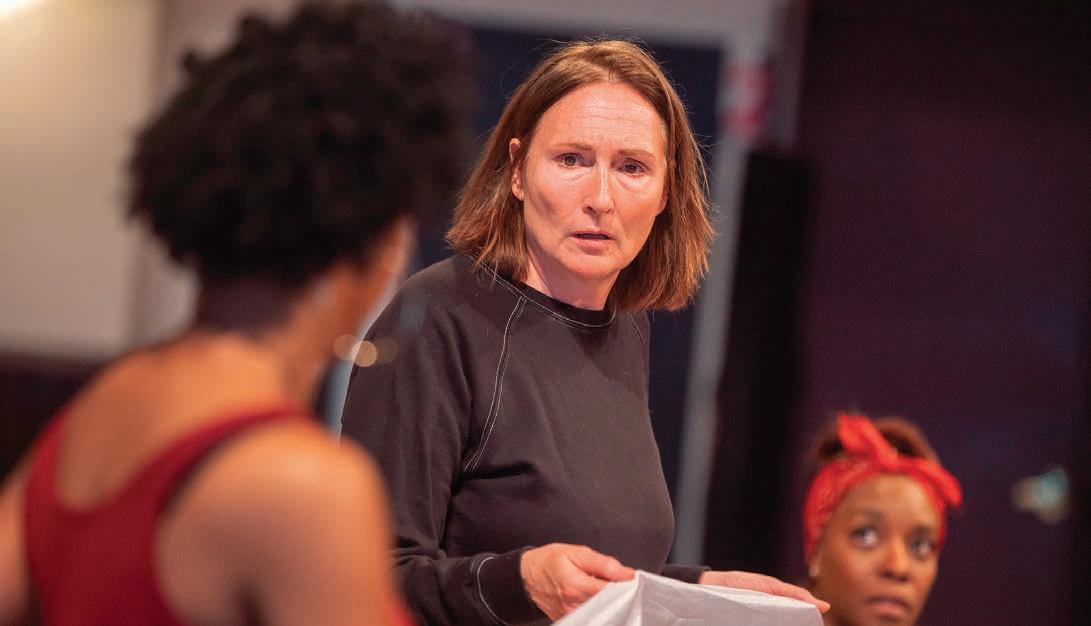
Ijames’s script is hallucinatory and gripping: Martha Washington is in her final days, thrashing through a fever dream, tended by the slaves without whom her lifestyle would have been impossible. That’s a grossly incomplete categorization: as Ijames points out in his prefatory notes, this is no “slave play.”
Ann Dandridge, Doll, Priscilla, Davy, William, and Sucky Boy are as intricate and indelible as Martha. They also double as other historical figures, both Black and white.
As Dunn put it in an interview on March 13, “You think of Mount Vernon as a tourist attraction when in fact it was a labor camp. You can’t go there and treat it as if it wasn’t part of the holocaust here. I love our Constitution. I love
that we have a Declaration of Independence.
“But you can’t ignore the fact that George Washington owned over 300 people. There is little evidence that he had a conscience about it. He talked about them in terms of worth and value. Half of America didn’t believe that. There was an abolitionist movement in the 18th century. Washington wasn’t part of it. The play never lets that go. It doesn’t let George o and it doesn’t let Martha o either.”
Directed by Whitney White and featuring Nikki Crawford as Ann, Celeste M. Cooper as Doll, Sydney Charles as Priscilla, Carl Clemons-Hopkins as Davy, Victor Musoni as William, and Travis Turner as Sucky Boy, the show had all the makings of a feverishly watchable slice of history. Then on March 17, Steppenwolf announced the show was cancelled due to COVID-19. They have made a commitment to stage it in 2021, with the same artists. So make that “has” all the makings of a
feverishly watchable slice of history.
To me, that interview with Dunn now seems like it happened last year. The entire world has changed—totally, irrevocably, and cataclysmically—since we spoke. Still, her thoughts have resonance. Dunn was marked as “difficult” for standing up to the macho atmosphere at SNL , where she joined the cast for the 1985 season, along with fellow rookies Jon Lovitz and Dennis Miller. She also became known for her recurring characters, including half of the Sweeney Sisters duo with Jan Hooks. Decades before #MeToo, Dunn fought for screen time.
“It was hard. It was a boys’ club. They would always tell me—whatever I wrote or came up with—that they didn’t get ‘girl humor.’ I didn’t understand that. Humor is humor. I was so pissed o —I’m like, I’m hired, I’ve shown you tons of material, and you can’t find anything for me to do? I didn’t hold anything back. But there was always the issue that the guys were in everything. And we had to accept we were in one or two things.”
In 1990, Dunn boycotted the episode hosted by noted misogynist Andrew Dice Clay. Lovitz told the tabloids that she was hard to work with, hard to get along with, and would be fired before the next season. She didn’t return.
“You can’t hold on to your anger,” Dunn said. “That’s building your own blockade.”
Still, she’s angry now.
“I don’t want to be the person who panics. Who buys all the food. I went to Whole Foods, and the shelves were almost bare. But I do feel a lot of trepidation because we have no national leadership.
“Because our ‘president,’ well, we don’t even have a person up there who is a human being. We need someone to say ‘here’s what we have to do. Boom. Boom. Boom. We’re going to have to su er a little bit. We’re going to lose jobs. It’s a horrible, almost unbelievable shock, but here’s what we’ve got to do to contain this.’
“But he’s not doing that. He’s making it worse. He could have gotten the tests [kits for massive, nationwide testing] in January. He was warned. He didn’t care. My own hope is that he has the virus. And then he’ll be unable to tweet. I don’t know what drugs he’s on. But everyone is seeing it now. I hope.”
She continues:
“What’s coming to roost here is this: Guess what folks, we really do need a CDC. We do need diplomats. We need leadership. Saying ‘burn it all down’ is all very well and good but, that’s not what’s going to save us. I think now, more than ever in my life, community is critical.
“I have a niece in Seattle. They’ve been hit hard. I have so many friends in New York and LA. I fear for all of them, all of us.”
Two weeks ago, Dunn was still going out, but she noticed changes.
“Weird things—like people are in a trance. No one is signaling, driving weird. It’s like we’re all in limbo. There’s this fear of massive job losses. I live with my dog, and that’s how I communicate with many of my neighbors. I think today is the first day it’s really hitting me.
“We have to face the fact that there’s a virus going around that most of us aren’t even allowed to be tested for. We’re not being taken care of. At times like these, we need things not to take our mind o the horror of it. Otherwise you could lose yourself. A good play can take you to a deeper place. You let everything else go and immerse yourself into the story.
“I believe this play does that. It’s important. It’s still important.” v
James Ijames’s The Most Spectacularly Lamentable Trial of Miz Martha Washington is available through Dramatists Play Service, dramatists.com.
22 CHICAGO READER - MARCH 26, 2020 ll
@CateySullivan THEATER
Nora Dunn LOWELL THOMAS
By CODY CORRALL
Despite what the title suggests, Netflix and Channel 4’s Feel Good might not be the comforting series you need right now—and it doesn’t claim to be. It’s a rallying cry for the queers, the addicts, and all of the ways they intersect, for better or for worse.
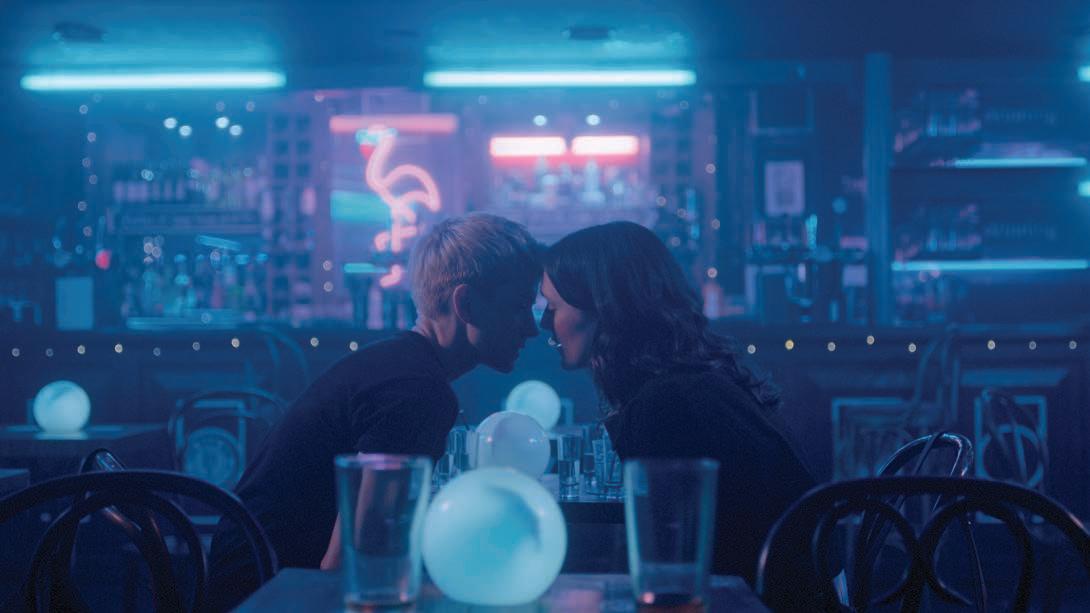
The series is based on stand-up Mae Martin’s own story. She plays a fictionalized version of herself whose life gets increasingly complicated as she starts to date George (Charlotte Ritchie)—who has never dated a woman before—while trying not to let her history of addiction get in the way of what could be a really good thing.
Mae and George hit it o quickly after one of Mae’s shows. Their first date is full of the delightfully awkward moments that so often make up gay relationships but are rarely depicted in that way. Questions like: Is this even
a date? Is she into me or am I making this up?
Should I kiss her? That would be cool, right?
They move in together in what seems like a blink of an eye—pause for U-Haul joke—and Mae quickly realizes that she can’t keep hiding her past from George forever.
Full disclosure: I’m no stranger to addiction. It dominated my household growing up— whether it came from substances that made you feel numb or dangerous habits that made you smaller, more desirable to others—and no matter how much time passes, the scars left from addiction never really go away. Feel Good understands that better than most media about addiction I’ve seen, largely due to Martin’s personal experiences, which help guide the series with a comforting authenticity.
With Feel Good , Martin makes it clear that she lost a lot of her life to addiction and
burned some bridges along the way. Mae is in a 12-step program throughout the series, but her past—and her overwhelming guilt—is not far behind her. What the series really gets at the heart of, though, is that when addiction is a formative part of your upbringing, you start playing by its twisted rules in adulthood.
Addiction takes charge in your relationships with others, and you sometimes find yourself swapping substances for people in an attempt to suppress the parts of yourself that you think are inherently ugly. When George finds out about Mae’s history with addiction, she suggests Mae go back to meetings and continue with the program. “I had a problem,” Mae says in response, “And now I have you.”
Mae’s character arc is defined by a need for escapism, whether it be from life or her own head. As a young person, that satisfaction
came from drugs, but in adulthood it took the form of chasing romantic partners for a similar high. It’s suggested by Mae’s mother (Lisa Kudrow) that George is not the first person in her life to fill the void, and that she only loves the “idea” of people, not people themselves. But what really makes Feel Good stand out is that while their relationship is complicated, the culpability isn’t solely placed on Mae’s shoulders. It’s clear that they both have some growing up to do and some personal demons they have to confront.
For George, the biggest roadblock is opening up about her queerness to other people. Mae is the first non-cis man George has ever dated, and her less-than-accepting friends automatically assume that she’s dating a man, so she just goes with it because it’s easier. Queer people are used to living our lives in the shadows to some extent, but it cuts much deeper when that existence arises from your partner’s own internalized shame. As Mae is treated more like a secret than a partner, she becomes a frustrated ball of insecurities. Mae often walks a fine line between feeling like she is too much to handle because of her past and feeling like she’s not enough of a man for George to truly love her.
Mae also spends some time questioning her gender identity. In one scene, she claims to feel like a “failed version” of a girl and a boy, and she unfairly compares herself to men when she’s with George, but that development unfortunately takes a bit of a backseat in the grand scheme of things.
It’s true that Feel Good can be heavy sometimes, but there’s always a blip of humor right around the corner. Martin is a natural at neurotic, self-deprecating humor—if this is your introduction to Martin, there’s a whole world of her stand-up just waiting for you—and Kudrow glides on a hilarious mom-like energy that can only be described as unhinged.
Feel Good is a near-perfect show about imperfect people. It investigates how our lives and our relationships with others are so often predicated on our pasts and the sometimes toxic ways we’ve learned to cope. But it’s not a show without hope. Rather, it brims with a reassuring optimism and the possibility of making real change, even if it means starting from zero. v
MARCH 26, 2020 - CHICAGO READER 23 FILM
@dykediscourse Feel Good COURTESY NETFLIX SMALL SCREEN Feel Good honestly explores bad times Stand-up Mae Martin’s new series gets heavy, but there’s always a laugh waiting around the corner.
ssss EXCELLENT sss GOOD ss AVERAGE s POOR • WORTHLESS






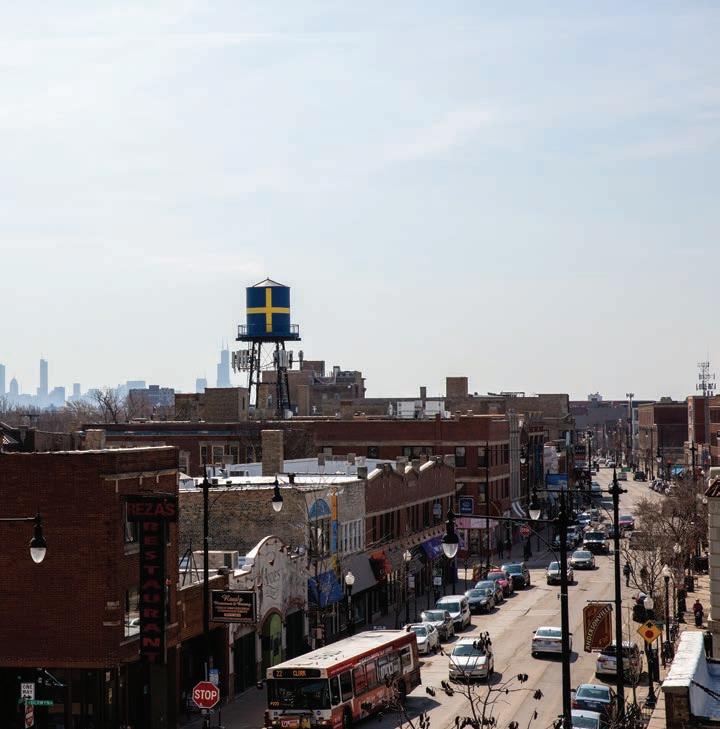

24 CHICAGO READER - MARCH 26, 2020 ll STAY HEALTHY. STAY SAFE. THE MAGIC WILL BE BACK. chicagomagiclounge.com GetYourSwag! www.chicagoreader.com/shop ANDERSONVILLE UPDATES SUPPORTING OUR BUSINESS COMMUNITY IN THE WEEKS TO COME andersonville.org/updates pleaserecyclethispaper Chicago's Free Weekly Since 1971 We Couldn't Be Free Without You— Support Community Journalism chicagoreader.com/donate
NOW PLAYING
R The Platform
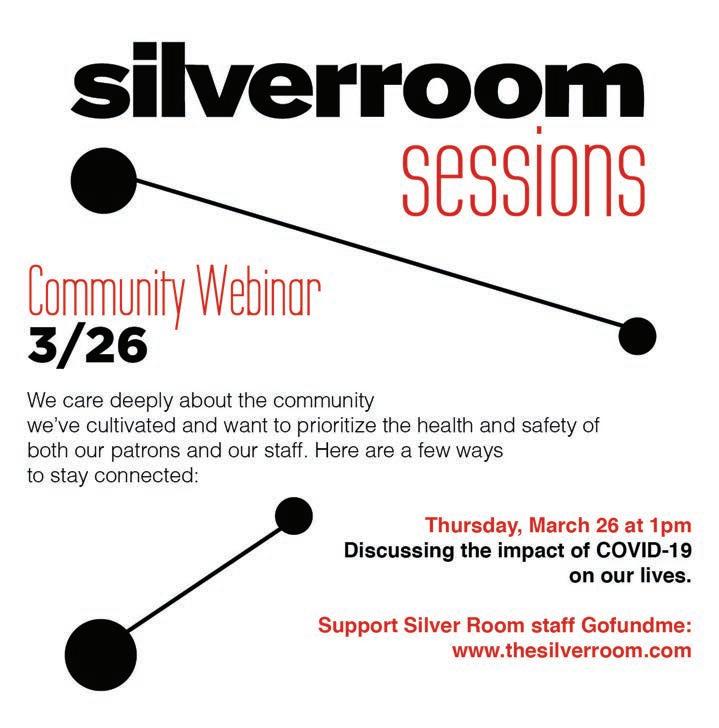
How many people have to die unnecessarily before change is enacted? That’s the question near the heart of Galder Gaztelu-Urrutia’s dystopian thriller The Platform a grimly violent exploration of humans driven beyond the point of compassion. Almost. If that sounds cliched, rest assured it’s not. You think you know what’s coming but you do not. The premise is simple in David Desola and Pedro Rivero’s stark screenplay: People can volunteer to spend time in “the pit” in order to get jobs or medical care or just about anything else they can’t otherwise afford. From the outside, it seems like a tough but seemingly manageable trade, but the reality of the pit is unknown to anybody who hasn’t been inside. Goreng (Ivan Massague) signs up because he wants to quit smoking and gain professional accreditations. The titular platform is a massive, banquet-laden structure that descends from the first floor (Jon D. Domínguez‘s vertiginous cinematography is stunning). There’s enough food for everyone, but below level 60 or so, the food runs out. Every few days, everyone is gassed to sleep. When they wake up, they’re on a new level. Goreng wakes up in level 47. It takes about a day before his humanity is almost completely erased. He thinks he’s in hell, until he wakes in 171. When Goren joins forces with a fellow detainee Baharat (Emilio Buale), The Platform veers toward the land of bromance action thriller, only every thrill is packaged in a thick shroud of moral ambiguity. How many deaths can be justified in the name of uprising? How many before the people at the top stop killing the ones below? The Platform doesn’t provide an answer. But damn if I wouldn’t watch the hell out of the sequel to see how it turns out.
younger generations rejecting their parents’ traditions to chart their own path is well tread in film, and has been told through the lens of various cultures and ethnicities including Indian (Today’s Special and The Hundred-Foot Journey), Italian-Canadian (Little Italy), and Greek (My Big Fat Greek Wedding). With Uncorked, Prentice Penny explores how this theme might play out in a Black American family: Elijah is a wine shop clerk who dreams of becoming a sommelier, but his father— who runs a Memphis barbeque restaurant—would like him to take over the business someday. Though the plotline of father and son conflict feels predictable, unexpected twists and standout performances from Niecy Nash and Courtney B. Vance make Uncorked a charming and thoughtful film. —JAMIE LUDWIG 104 min. Streaming on Netflix
R Vivarium
—CATEY SULLIVAN 94 min. Streaming on Netflix

Uncorked
The story of family-owned restaurants and members of
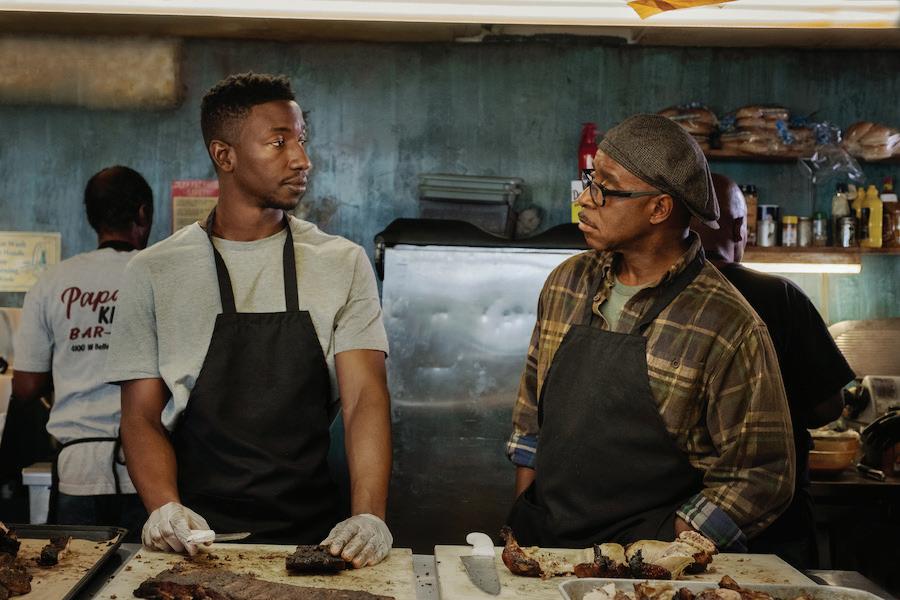
On the surface, Vivarium may seem like just another takedown of the suburbs, a location filmgoers have come to expect as the setting for criticizing conformity, if not the backdrop for white savior shenanigans. But unlike other entries in the former category (Suburbicon, The Stepford Wives), Vivarium leans into science fiction to depict the dystopian utopia. Set specifically in Yonder, which is proudly advertised as “Quality family homes. Forever.”, young couple and house hunters Gemma (Imogen Poots) and Tom (Jesse Eisenberg) quickly discover “forever” becomes quite literal when you’re trapped. Even worse, they’re given a peculiar child (Senan Jennings and Eanna Hardwicke), who ages as rapidly as a dog, to raise. This tight cast does wonders for the bland setting, keeping things tense every turn of the way. If you liked the cult classic Cube, you’ll dig this, and if you haven’t seen it consider this a double-feature recommendation.
—BECCA JAMES R, 97 min. Available to rent on Amazon Prime, iTunes, Google Play, and VOD
MARCH 26, 2020 - CHICAGO READER 25 FILM Uncorked Get showtimes and see reviews of everything playing this week at chicagoreader.com/movies R READER RECOMMENDED b ALL AGES N NEW F
Chicago
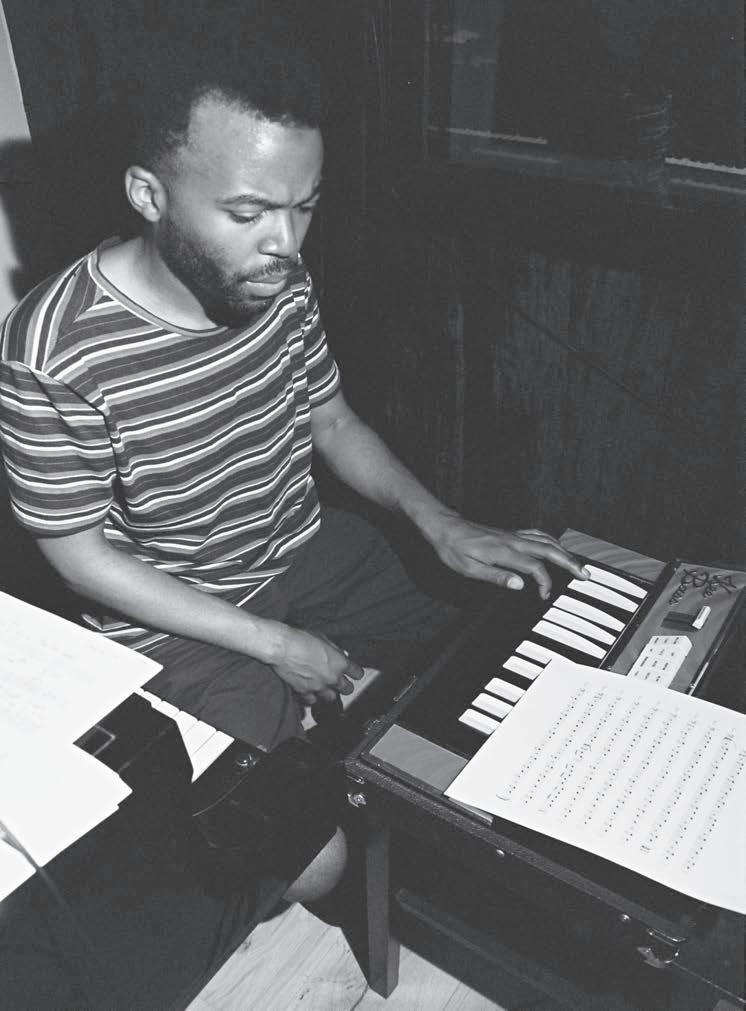
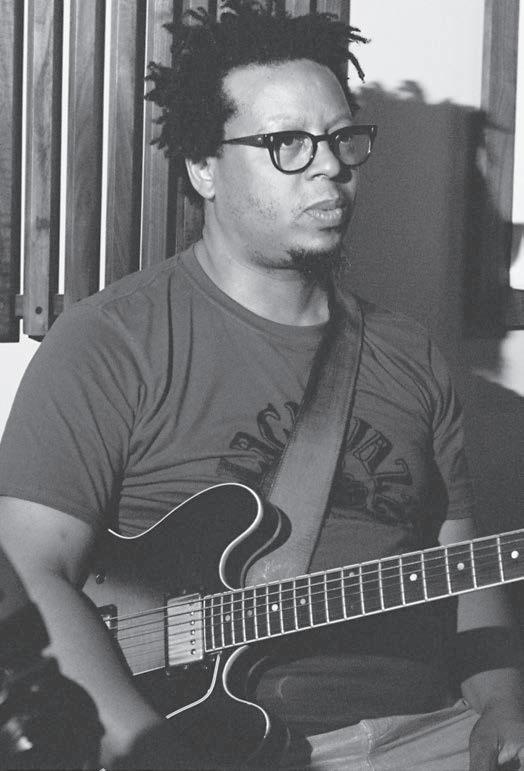
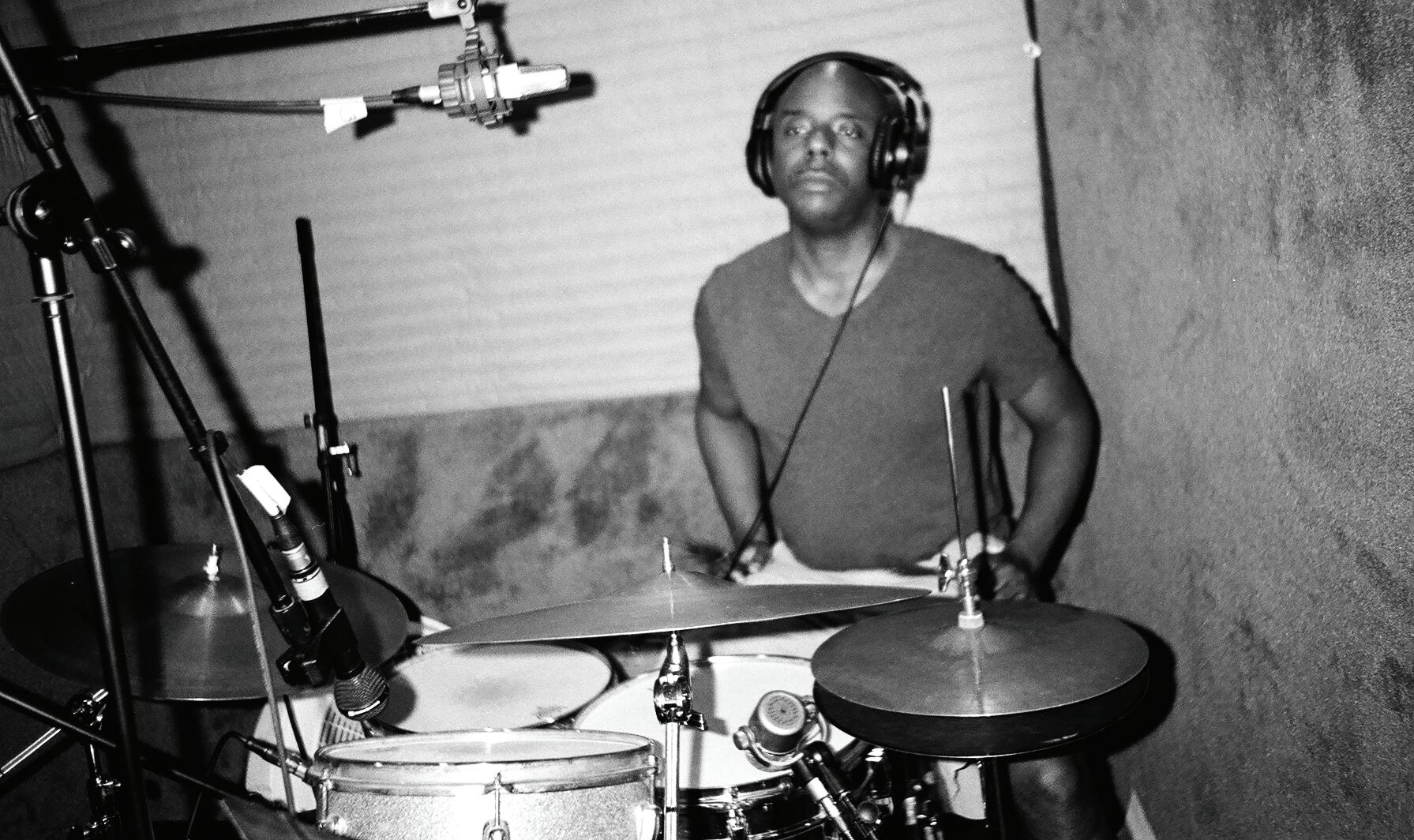
their
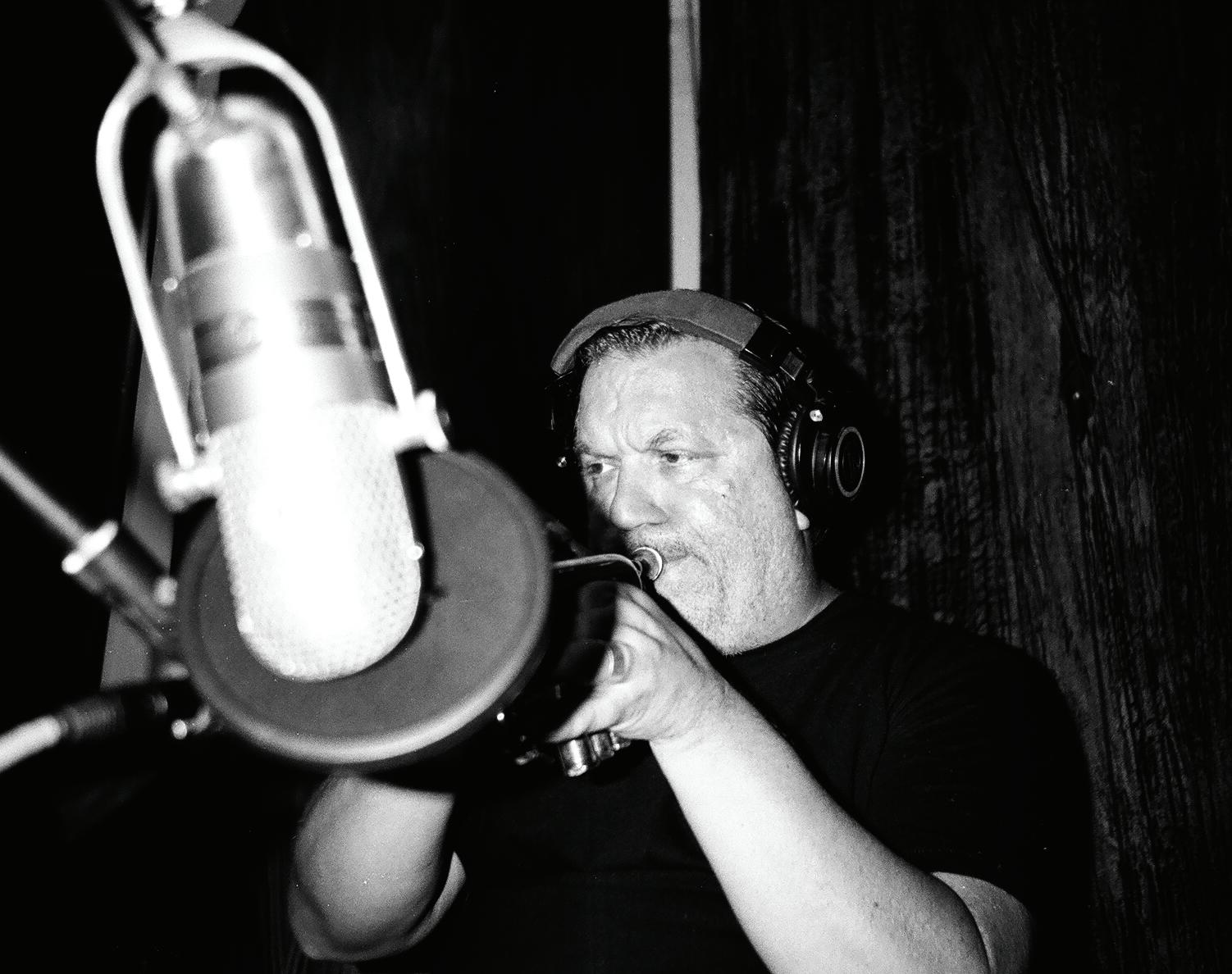
ll the
undeground quartet bottle
lightning again
By NOAH BERLATSKY
Experimental jazz is not a stadiumpacking pop genre. But you wouldn’t know that from the enthusiasm of the shoulder-to-shoulder capacity crowd stuffed into the narrow space along the bar at Dorian’s on a Sunday earlier this month. Programming director Joe Bryl spun a set of classic spiritual jazz from the likes of Brother Ah and Infinite Spirit Music, and then the crowd cheered as Je Parker’s New Breed Band took the stage. Parker is something of a legend, not just in the jazz world but beyond; he’s a key member of postrock collective Tortoise, and he’s worked with the likes of Joshua Redman and Meshell Ndegeocello. But rather than taking the spotlight, he seated himself in the most poorly lit spot. He wasn’t much more than a shadow as his guitar released languidly spiky notes from the dark like magic.
The social-distancing measures intended to slow the spread of COVID-19 weren’t yet in place, but Parker already had words for the man most responsible for the severity of the U.S. crisis. In the middle of the set, he leaned over to the mike and said, with his usual nonchalance, “This song is called ‘Go Away.’ It was written for Donald Trump, because I want that motherfucker to go away.” Then he launched into the intricate bop hook while bassist Paul Bryan played a killer funk line behind him and Josh Johnson stepped away from his keyboard to blow a skronking sax solo. The high point of the set, “Go Away” was funny, cool, and weird—a crowd-pleasing rave-up and a knotty experimental exploration at the same time, with Parker chanting “Go away!” with great enthusiasm on the chorus.
Taylor,
Parker lives and works in Los Angeles now, but his career famously started in Chicago. He’d come to Dorian’s on a short stateside tour supporting his wonderful new album, Suite for Max Brown , which he’s dedicated to his mother. But he’s also got an even newer record: Good Days (Astral Spirits) features Parker and two of his longest-term collaborators, drummer Chad Taylor and cornetist Rob Mazurek. In 2001 they all appeared on the album Chicago Underground Quartet, one of Parker’s favorites in a discography hundreds deep. And on Friday, March 27—after 19 years that have taken all three musicians to new cities and even new continents—they’ll finally release the Chicago Underground Quartet’s second album.
Parker first came to town in 1991, after dropping out of music school in Boston in his mid-20s and getting a job at Tower Records on Clark and Belden just as it opened. His parents wanted him to complete his degree, but he wanted to try to make a career as a working musician. “I knew that if I’d finished, I would just end up being a music teacher, and I didn’t want that,” he says ruefully. “I know myself, and I know I would’ve thought, ‘I don’t have any gigs. I’ll go and be a substitute teacher.’ And then the next thing, it’s 20 years later. That definitely would have happened, if I had finished school.”
Parker was already interested in experimental and creative music when he arrived in Chicago, but he gigged wherever he could, playing weddings and straight-ahead jazz gigs. It was on one of the latter, an early-90s date led by legendary Chicago jazz drummer George Fludas, that Parker met Mazurek.
the time he met Parker, he was getting bored, and the guitarist didn’t have much trouble converting him to the “out” side. “It was really meeting Je in the early 90s that piqued my re-interest in more so-called avant-garde musics,” Mazurek says. “Sun Ra, Art Ensemble, Paul Bley, late Coltrane, various electronic music from Xenakis to Autechre.”
In early 1996, shortly after Parker joined Tortoise, he and Mazurek set up a regular workshop at the Green Mill for musicians to rehearse new material together without an audience. There, Parker says, Mazurek began “to write some compositions that he didn’t think would sit so well” with the players on his straight-ahead jazz gigs.
One of the regulars at the workshop was Taylor. He’d started gigging in Chicago in the early 90s, when he was 16, inspired in part by a high school friend, Chicago bassist Matthew Lux. It was Lux who told a young Taylor that he had to stop listening to Kenny G. “Matt was like, ‘No no no no, we’ve got to get you on the right track,’” Taylor says. Lux soon started him on a diet of the Art Ensemble of Chicago, Miles Davis, and Art Blakey.
been in and out of town, partly to study jazz drumming at the New School in New York, but in 1997 he settled in Chicago—not long after the workshop at the Green Mill had evolved into a loose band with rotating membership. They called themselves the Chicago Underground, and they released a series of records with various personnel: the first, 1998’s Playground (Delmark), is credited to the Chicago Underground Orchestra. Recorded throughout most of 1996, it features Mazurek, Parker, Taylor, trombonist Sara P. Smith, and bassist Chris Lopes. Taylor and Mazurek also formed the Chicago Underground Trio, with Noel Kupersmith on bass; their albums often involved Parker as a guest artist. When Kupersmith didn’t show up to practice one day, Taylor and Mazurek started playing without him. “It wound up being, you know, amazing!” Taylor says, and that configuration became the Chicago Underground Duo. Then in 2001 the trio decided to release a record with Parker billed as an o cial member.
ASTRAL SPIRITS RECORDS
In 1981, when he was just 16, Mazurek had been thrilled to see Sun Ra at the Chicago Jazz Festival. But when he moved to Chicago from Naperville in 1983, he left his avant-garde tendencies behind, instead playing what he calls “classic mainstream jazz” around the city. By
For a while Taylor tried to hold down a day job while playing gigs at night; in the mornings he was a lifeguard for the indoor pool at the Standard Club downtown. His roommate, bassist Joshua Abrams, would look over at him and see him literally frowning in his sleep. “Josh told me, ‘Chad, you just can’t do this anymore.’ And of course I was scared. How am I going to make a living. But he said, ‘Just quit the job and put all your energy into music. The music will support you.’ And sure enough, that’s happened.”
Taylor knew Mazurek because they’d played together in a band with bassist Dennis Carroll in the early 90s. He knew Parker through Lux, who also worked at Tower. The three had long been mutual admirers. Since 1992 Taylor had
Chicago Underground Quartet (Thrill Jockey) is a classic album—though it would also turn out to be the quartet’s only recording for almost 20 years. It dips in and out of jazz traditions with the rolling, itchy ease of Parker’s opening guitar figure on “Tunnel Chrome,” the first track. “I’m on probably 200 albums at this point, you know,” Parker says. “And I don’t like most of them. I don’t like my playing on any records. But the Chicago Underground, I think I played pretty well.” You can hear Mazurek’s straight-jazz influences on “Four in the Evening,” which is as mellow as Chet Baker. But then on the next track, “A Re-Occurring Dream,” he’s spitting and squalling like a strangled duck while Parker plays brooding, dissonant lines. And on the next, “Welcome,” the band channels Coltrane while Taylor provides thunderous free-jazz backing on the drums, against which the other members
MARCH 26, 2020 - CHICAGO READER 27
Clockwise from top: Chad
Jeff Parker, and Rob Mazurek, who cofounded the Chicago Underground collective in the mid-90s, and Josh Johnson, who plays in Parker’s New Breed Band and joined the quartet for the new album COURTESY
For 19 years, their first album was their only album—but now longtime collaborators Rob Mazurek, Jeff Parker, and Chad Taylor have recaptured the group’s freewheeling jazz spirit.
MUSIC
MUSIC
clank and spit toward nirvana.
New Breed Band keyboardist and saxophonist Josh Johnson, a Chicago native and Los Angeles resident, says the record was one of his early loves, as a fan and as a musician—he first heard it as a teen in the mid-2000s. “I hadn’t really heard anything like the Chicago Underground Quartet, that combined a lot of the elements that I hear in jazz. It had so many things I was interested in, so many disparate interests, but musically all combined in a way that feels very e ortless.”
Over the next two decades, the quartet’s members worked on a range of projects, separately and together. By the early 2010s, Kupersmith had dropped out of music to become a plumber in Milwaukee. Parker moved to LA in 2013, and in 2016 he recorded The New Breed, an album dedicated to his father that uses beats and samples he’d been collecting and thinking about since his Chicago days. From 2000 till ’07, Mazurek lived in Brazil, where he formed the São Paulo Underground with percussionist Mauricio Takara and keyboardist Guilherme Granado (and had the opportunity to record the sounds of electric eels for some of his compositions). In 2005 Mazurek started the Exploding Star Orchestra, a large ensemble dedicated to investigating Chicago’s avant-garde traditions; the initial lineup included Parker and Lux. After several
years back in Chicago, in 2015 he moved to Marfa, Texas, where he started a music festival called Desert Encrypts. A live album from the 2018 festival, Desert Encrypts Vol. 1, features Taylor on drums alongside Mazurek, pianist Kris Davis, and bassist Ingebrigt Håker Flaten. Taylor left Chicago for New York in 2001, then moved to Philadelphia in 2016. He continues to make a living as a free-jazz drummer, somewhat to his surprise. In regular times, he tours two weeks out of the month—mostly in Europe, where the pay is better—and in 2018 he released his first solo album, Myths and Morals (Eyes & Ears). “I’ll be on about 17 recordings coming up,” he says. “Not all of them I’m proud of. But quite a few of them are great. I feel very blessed.”
Taylor played in Parker’s trio with Chris Lopes on the 2012 release Bright Light in Winter (Delmark). He’s also continued to work with Mazurek semi-regularly, including in the Chicago Underground Duo and on the 2014 album Pharoah & the Underground (Delmark) with saxophonist Pharoah Sanders. But by the time of the initial Good Days sessions in 2018, Taylor says, it’d been around 15 years since he’d played with Mazurek and Parker in the same group.
The three of them hadn’t made any plans to record, but LA producer Chris Schlarb—a longtime fan of the Chicago Underground— brought them together. While organizing a
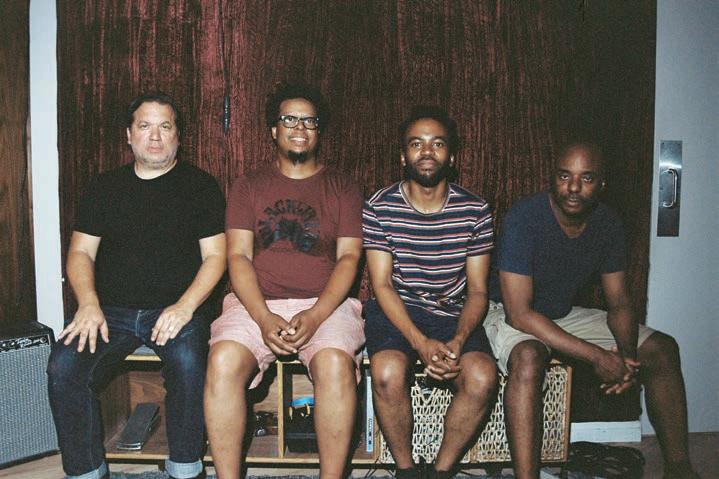
28 CHICAGO READER - MARCH 26, 2020 ll
Josh Johnson (second from right) replaces Noel Kupersmith in the current version of the Chicago Underground Quartet, with Rob Mazurek, Jeff Parker, and Chad Taylor.
COURTESY ASTRAL SPIRITS RECORDS
continued from 27 WE WILL RAISE A GLASS TOGETHER SOO N, CHICAG O. SUPPORT YOUR LOCAL BREWERY FIND OUT HOW : ILLINOISBEER.ORG/BREW-MAP Chicago's Free Weekly Since 1971 We Couldn't Be Free Without You— Support Community Journalism
session for his band, he asked Taylor to play drums. Schlarb knew he wouldn’t have the budget to pay Taylor his usual rate, so he offered to give Taylor free studio time to record a new Chicago Underground Quartet record.
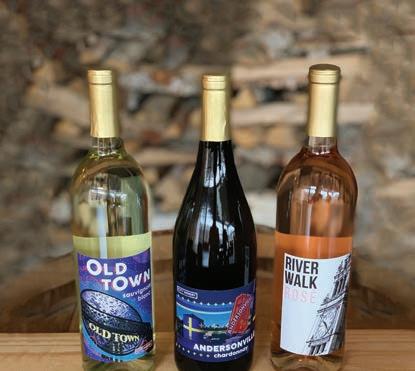

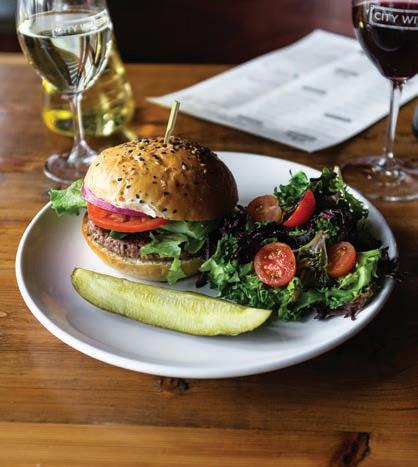

“I was like, what? Um . . . maybe?” Taylor says, his voice rising incredulously. “To be honest, I thought Je was not going to be into it. But he was. And we made it happen.”



The original Chicago Underground Quartet was a working band that gigged together and practiced all the time. Good Days arose from an impromptu session with little rehearsal. With Kupersmith retired, Taylor and Parker decided to bring in Johnson. The recording was so casual, and organized so quickly, that Johnson wasn’t sure whether he’d be playing saxophone or keyboards till he showed up. When he did appear, Parker recalls, Mazurek looked at him in confusion and said, “Where’s your bass?” Parker laughs. “Me and Chad are like, ‘No man, he plays keyboards.’”



You wouldn’t know from listening to the
















album that the performers weren’t clear on the instrumental configuration until everyone showed up. As they did on the first Chicago Underground Quartet album 19 years before, they stroll around the universe of jazz like they’re walking through their backyard. Taylor’s soul-funk composition “Batida” gives Parker a chance to play some badass spaced-out blues licks. Parker wrote “Good Days,” which first appeared on Bright Light in Winter, for Mazurek, but the cornetist couldn’t make that session; finally able to record the tune, he turns in a searching, wounded solo over Johnson’s ambient keyboard washes. In a complementary turn, Mazurek wrote “Strange Wing” (a commission by the 2016 Novara Jazz Festival) with Parker in mind. It’s a mellow fuzak groove that drifts unexpectedly toward free spiritual exploration and back again.
Part of what’s so engaging and inspirational about Good Days is that it feels like such a natural continuation of the band’s freewheeling spirit—something that easily could’ve ended
up being lightning in a bottle, never captured again after the 2001 album. “The collaboration is the same beautiful open situation as when we started,” Mazurek says. “Of course we are more mature as musicians and humans now. The intention is always strong.”

Experimental jazz isn’t a path anybody follows expecting to be comfortable. In a lot of ways, it makes more sense to stop and get a job as a plumber, with a steady income and maybe health insurance. “It’s certainly a challenge to live a creative life,” Mazurek says. But Taylor, Mazurek, and Parker have kept at it, creating art that’s surprising and meaningful and generally awesome. “The main thing I love about [Taylor and Mazurek] is they’re both just so open,” Parker says. “Both of those guys will try anything musically.”
The last song on Chicago Underground Quartet is a Mazurek composition called “Nostalgia.” At first, it sounds about like what you’d expect from a piece called “Nostalgia”—slow, ambient, romantic, with some cheesy synth

warbling. Then, after about a minute and a half, Taylor drops in a crisp transition on the drums, seemingly setting a new beat but actually transitioning the track into disintegrating, chaotic spasms—drums, guitar, and horn chitter across empty space at one another until the nostalgia overtakes them again. The track goes back and forth like that—romantic evocations of a lost past alternating with fragmented cries to the future—until the music fades out altogether.


There’s a couple minutes of silence, and then the band comes roaring back for a ten-second blast of an amphetamine bop head. It’s an exuberant end to an exuberant record, as well as a declaration that jazz—and music making in general—is about right now, even when it’s also about the past. It’s as though the quartet knew they had more to play, and that they’d be ready to take up the tune again—even if it took them almost two decades to do it. v

MARCH 26, 2020 - CHICAGO READER 29
@nberlat MUSIC w Support City Winery & Take Care of Yourself During this Difficult Time Visit www.citywinery.com/chicago for more information. thank you for your support! Help our employees with a donation, big or small Check out our carryout menu Let Us Feed You Produced in Chicago Available for pickup or delivery to your home Enjoy Our World-Class Wines Relief Fund
PICK OF THE WEEK

are more

and potent than ever on Who Sent You?
IRREVERSIBLE
IRREVERSIBLE ENTANGLEMENTS WILL LEAVE YOU SHAKEN. The group make tight, synergistic free jazz anchored by the dynamic spoken-word declarations of poet Moor Mother, aka Camae Ayewa. Their music sometimes sounds chaotic and freewheeling, but it ensnares listeners with arrangements carefully considered to help deliver fiery political messages. The five-piece ensemble—the lineup also includes saxophonist Keir Neuringer, trumpeter Aquiles Navarro, bassist Luke Stewart, and drummer Tcheser Holmes—originally performed as two di erent groups at a 2015 New York benefit show called Musicians Against Police Brutality. They create art with a purpose, and on their new album, Who Sent You? (International Anthem/Don Giovanni), they sound more potent than any other act out there. The title track surrounds you with a vortex of barreling drums as Moor Mother evokes the terrors of living in a police state. She sounds assured and calm, firing o words that indict the futility, ineptitude, and foolishness of cops and their failure as civil servants. “Blues Ideology” rallies against harmful religious ideologies that powerful leaders feed the masses, and the stumbling, anguished instrumentation bolsters the anger in Moor Mother’s voice (“Pope must be drunk,” she exclaims). No track feels frivolous, and that’s Irreversible Entanglements’ greatest feat: they instill a desire to think, act, and live more purposefully.
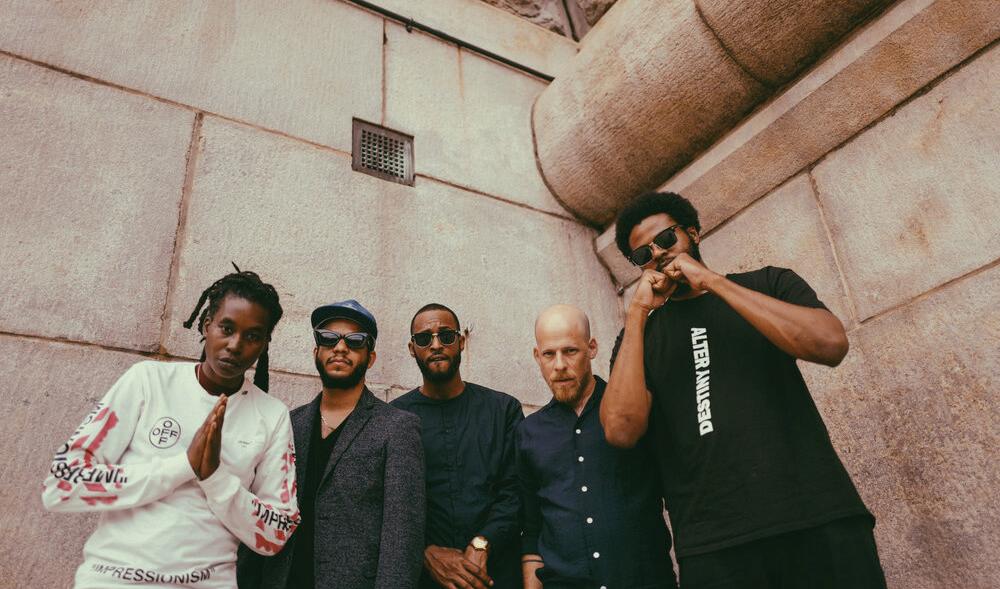 —JOSHUA MINSOO KIM
—JOSHUA MINSOO KIM
30 CHICAGO READER - MARCH 26, 2020 ll
ENTANGLEMENTS, WHO SENT YOU? International Anthem/Don Giovanni intlanthem.bandcamp.com/album/who-sent-you
Irreversible Entanglements
political
Recommended new releases and critics’ insights for the week of March 26MUSIC
BOB SWEENEY
COVID-19 can close venues, but it can’t stop Chicago’s music community
The events of last week were unthinkable until they happened—including the weeks-long closure of Chicago’s beloved live-music venues (along with bars, restaurants, and many other businesses) to slow the spread of COVID-19.
But rather than admit defeat or grind to a halt, the local music community has banded together and risen to the occasion. Venues have launched dozens of fundraisers to support staff who’ve lost most or all of their livelihoods; artists have begun livestreaming concerts, dance parties, and jam sessions. Somebody on Facebook has even called for a Chicago window sing-along, inspired by widely circulated videos of quarantined Italians belting out pop ballads (“My Heart Will Go On”) and metal ragers (“War Pigs”) along with their neighbors. Though the battle against this virus is just beginning, it’s inspiring seeing so many people stepping up to support friends and strangers alike.
Because Chicago’s music venues are shuttered, the Reader has transformed its usual concert previews into album reviews. We hope this helps boost sales for artists who have temporarily lost the ability to tour. And we’re not about to let a virus stop us from championing great music!
Though the future is uncertain, it seems likely this shutdown could continue for weeks or months. If you have the means, please consider donating to one of the many fundraising campaigns for venue staff or buying albums or merch from musicians (we’re recommending several in these pages).
And please e-mail us at music@chicagoreader. com to tell us about new fundraisers or directaction campaigns in Chicago’s music community.
Blacks’ Myths, Blacks’ Myths II Atlantic Rhythms atlanticrhythms.bandcamp.com/album/blacksmyths-ii
Long before drummer Warren G. “Trae” Crudup III and bassist Luke Stewart launched noisy free-jazz duo Blacks’ Myths in 2018, they backed celebrated saxophonist James Brandon Lewis as the rhythm section in his trio. They’ve also enmeshed themselves in D.C.’s jazz scene individually: Crudup performs with a slew of scene fixtures, including saxophonist Brian Settles and poet Thomas Sayers Ellis, while Stewart plays in Afrofuturist crossover group Irreversible Entanglements and works for jazz nonprofit and editorial site CapitalBop as “director of presenting and avant music editor.” Blacks’ Myths 2018 self-titled debut showcases Crudup and Stewart’s preternatural musical connection: on “Upper South,” Stewart weaves together lightly pinging foreground notes with a hypnotic, relentlessly propulsive riff, which Crudup girds with cool, in-the-pocket percussion whose brisk snap he can intensify at a moment’s notice. On their follow-up, last year’s Blacks’ Myths II (Atlantic Rhythms), they tack toward discord; Stewart’s bass takes on a blistering metallic throb, and Crudup fights off the feedback with cascading drum fills that blow open pockets of space in the noise. Though Blacks’ Myths II can be intensely discombobulating, its most irascible passages make it even sweeter when
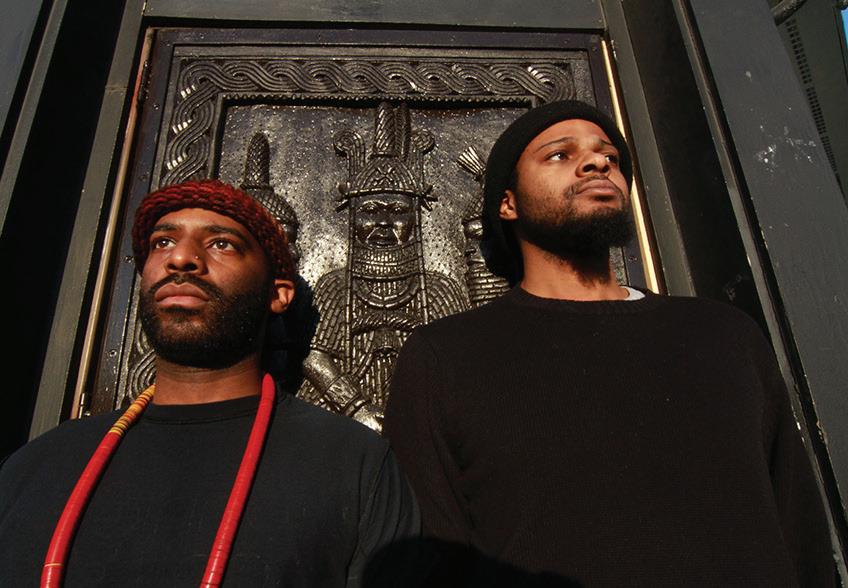
Crudup and Stewart relax into a linear melody. And when shrieking patches of noise erupt from the sluggish but triumphant “Free Land,” they feel like sunlight on the horizon. —LEOR GALIL
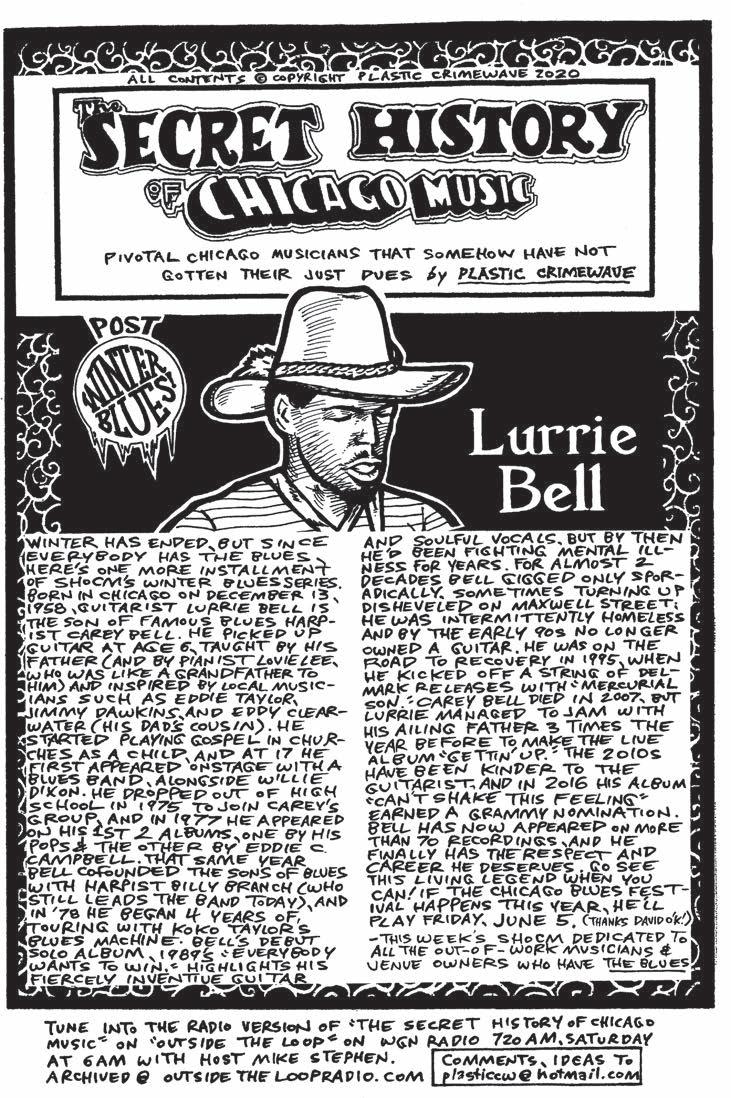
Lil Wayne, Funeral Young Money shop.lilwaynefuneral.com
Remember the Lil Wayne of 2008 and 2009? He constantly boasted that he was the “greatest rap-
per alive,” and you know what? He actually was. The 2008 album Tha Carter III, released about ten years into his career, was a full-blown landmark. It gave the world a string of smash singles, including “Lollipop” and “Got Money,” which showed Wayne’s knack for infectious pop hooks. And on “La La,” “You Ain’t Got Nuthin,” and the legendary “A Milli,” he solidified his reputation as an unstoppable MC by hammering out some of the fastest, cleverest, most skull-rattling wordplay ever committed to tape. Wayne got even wilder on 2009’s No Ceilings mixtape, which he supposedly record-
MARCH 26, 2020 - CHICAGO READER 31 b ALL AGES F
MUSIC
—JAMIE LUDWIG
Blacks’ Myths SEAN PEOPLES
MUSIC
ed completely freestyle—he was at the apex of his game, his charisma and skill decimating every rapper around him. At the turn of the decade, Wayne was releasing new music and collaborations at such an astonishing clip (he even put out a rock record, Rebirth , in 2010) that it’s hard to fathom how he also found time to jump-start the careers of Drake and Nicki Minaj. Since then, Wayne’s been on a
long, strange trip of his own—a prison sentence, hospitalizations for codeine withdrawal, countless face tattoos—but he’s still managed to keep the releases flowing. Some have been better than others, but none has held a candle to his best. As the years have gone by, Wayne’s delivery has begun to sound almost tired and mumbly. On his latest fulllength, the seemingly never-ending 24-track Funeral, he occasionally achieves a moment of brilliance,
but now that hip-hop has made a viral hit out of a Rascal Flatts medley sung by a heavily armed man in a ski mask and designer bulletproof vest, Wayne kinda sounds old-fashioned. At the end of the day, though, freaky modern rappers wouldn’t exist without Lil Wayne—even as his output becomes less relevant, his importance can’t be denied.
—LUCA CIMARUSTI
Lord Dying, Mysterium Tremendum eOne lorddying.bandcamp.com/album/mysteriumtremendum
This Portland-based progressive sludge-metal band returned from a lull last year with two new members, bassist-vocalist Alyssa Maucere (formerly of Eight Bells) and drummer Kevin Swartz (of Bottom and Forgotten Gods), and their third full-length, Mysterium Tremendum (eOne). It’s beautiful, but it’s a concept album about death—which makes it either the best thing or the worst thing to listen to while staring down the barrel of a pandemic. The band’s cofounders, guitarist-vocalist Erik Olsen and guitarist Chris Evans (not the Captain America guy), have both faced sorrow and tragedy in recent years— Evans’s sister suddenly passed away, and both of Olsen’s parents were diagnosed with cancer—and they channeled their grief into music. Lord Dying’s previous two albums may have felt heavier in a musical sense, but Mysterium Tremendum (which translates to “terrible mystery”) is heavier psychologically: the band use a diverse array of techniques from the prog-metal toolbox to meditate on death, spirituality, and the a erlife. The result is not just awe-inspiring but also surprisingly tender and kind. Olsen relies mostly on clean vocals, and on thoughtful tracks such as “The End of Experience” he sounds vulnerable and plaintive in the face of the inevitable—emotions that are cushioned by the ghostly instrumental buildup of the following track, “Exploring Inward.” That song winds up in shrieking defiance, but the high, clear melodic notes of the ballad “Even the Darkness Went Away” strike a tone of elegiac acceptance. Maucere uses her striking singing to great effect, and its presence is evidence of Lord Dying’s willingness to shake up their already powerful sound in order to explore a greater emotional range. Though death is a staple subject in metal lyrics, it’s rarely explored with as much grace and depth. —MONICA KENDRICK
Find more music listings at chicagoreader.com/soundboard

 Midnight, Rebirth by Blasphemy Metal Blade
Midnight, Rebirth by Blasphemy Metal Blade
midnight-ohio.bandcamp.com/album/rebirth-byblasphemy
Midnight are pretty much the nightmare that heartland parents feared during the satanic panic of the 1980s, when metal bands’ imagined lyrical (and moral) transgressions meant they were considered about as family friendly as murderers. Midnight’s music is nihilism with a beat, rudderless and apolitical; they’re as likely to cover 70s midwest punks the Pagans as black-metal innovators Venom. Athenar, the band’s founder and sloganeer, launched the culty Cleveland act in 2003 with a short demo o en referred to by the title of its first track, “Funeral Bell.” Recording everything himself (though he usually uses a backing band live), Athenar went on to refine Midnight’s mix of punk and metal on a series of EPs—o en splits or tributes—that led up to the band’s debut studio LP, 2011’s Satanic Royalty. Midnight’s latest full-length, January’s Rebirth by Blasphemy (Metal Blade), doesn’t break new ground, but the track “The Sounds of Hell” might be the closest to a hit the group can get—it sounds like Motörhead covering the Ramones. It’s also one of the more lyrically palatable tracks on the album, opening by referring to the “din of warfare” rather than, say, being dragged through fire by a “seductive beast” that’s broken free from “ancient bloody chains.” The song “Devil’s Excrement” might be about an unleashed evil creature—or the joys of taking an especially nasty shit. It almost doesn’t matter, because Athenar emphasizes each line of the chorus (“Devil’s excrement / Must unload”) with guitar drama straight out of 1987. Rebirth by Blasphemy also includes a few upli ing moments, surprisingly, though “positivity” by Midnight’s standards is likely to refer to clawing your way out of a grave. The new album continues the traditions Midnight established in 2003: they drive their music with anger and disgust, and they’re too evil to die.
—DAVE CANTOR
Bill Nace, Both Drag City
billnace.bandcamp.com/album/both
Until COVID-19 laid waste to his and everyone else’s touring schedule, Bill Nace was looking for-

32 CHICAGO READER - MARCH 26, 2020 ll
Lord Dying COURTESY EARSPLIT
PR continued from 31
ward to a splendid spring. Not only would the Philadelphia- based guitarist have opened in Chicago for the Gunn-Truscinski Duo and Mdou Moctar; he’d also have joined Gunn, Truscinski, and Kim Gordon (his bandmate in Body/Head) at a couple festivals in other states, where the combo would’ve improvised accompaniment to screenings of Andy Warhol’s 1963 fi lm Kiss . His label, Open Mouth, is still set to go into high gear in the coming months; it plans to release LPs of psychedelic violin solos by Samara Lubelski and electronic drones by Truscinski, as well as an album by a trio of Nace, cellist Leila Bourdreuil, and saxophonist Tamio Shiraishi, which specializes in stacking layers of tissue-thin electric noise. Capping off the season will be the Nace solo record Both, slated for release via Drag City on May 22. It provides an excellent opportunity to experience the range of unguitarlike sounds he can coax out of his instrument using a small collection of files, bows, and plectra. One track (they’re all numbered) sounds like field recordings of Godzilla stumbling home, dead drunk, a er a night he won’t remember; another resembles the same monster’s voice being played backward slowly. Only near the end of the record does Nace relent and sound like he’s playing a guitar; “Part 8” thrusts you into a fever dream of Link Wray closing a blues bar on the moon.
—BILL MEYER

MUSIC
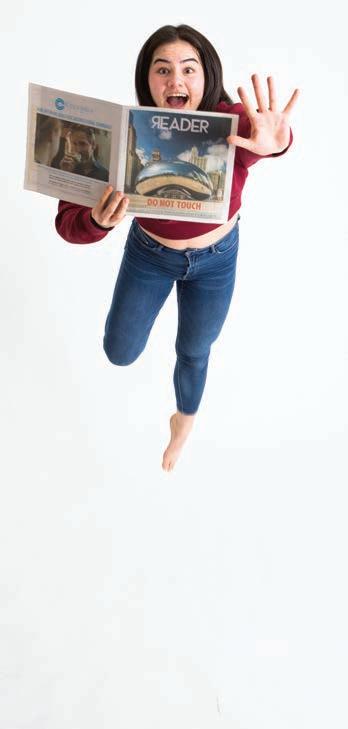
Philadelphia indie-rock alchemist Alexander Giannascoli understands better than most musi-
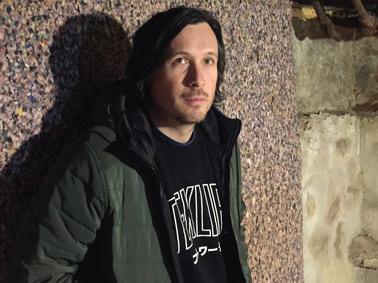
cians who’ve emerged in the past decade how to convey the slipperiness and complexity of emotion in song. The 27-year-old kicked off his career in the early 2010s with a streak of albums he selfreleased or put out through small cassette labels, and they all wound up on the Bandcamp page he ran as Alex G. By the time he added “(Sandy)” to his stage name in 2017, his blossoming cult status had gotten a major boost from his contributions to Frank Ocean’s two 2016 albums, Endless and Blonde . Giannascoli’s second album for bigtime indie Domino, Rocket , brought him to his own crossover moment that same year. On his follow-up, September’s House of Sugar , he’s refi ned his experimental, everything-but-the-kitchen-sink approach to indie rock without losing the emotional ambiguity that makes his music magnetic. The radically processed vocals on “Gretel” give way to a Lynchian melody, hinting at the odd range of feelings that anyone going through major life changes faces, regardless of age. Giannascoli’s calming vocals on the chorus act as a balm against dark moods, and he performs with a resilience that suggests moving forward won’t be as bad as we fear.
GALIL v
MARCH 26, 2020 - CHICAGO READER 33
(Sandy) Alex G, House of Sugar Domino sandy.bandcamp.com/album/house-of-sugar
—LEOR
Bill Nace CHELSEA HOGUE
pleaserecycle thispaper See you on the other side, Chicago. chicagodancesupply.com Rattleback RECORDS www.rattlebackrecords.com RATTLEBACK RECORDS IS A UNIQUE MUSIC STORE OFFERING A MYRIAD SELECTION OF NEW AND USED VINYL, CDS, CASSETTES, AND MORE. Chicago's Free Weekly Since 1971 We Couldn't Be Free Without You— Support Community Journalism chicagoreader.com/donate u THE
EARLY WARNINGS
Riviera Theatre, rescheduled; tickets purchased for original date will be honored, 18+
LA Priest 4/5, 9:15 PM, Empty Bottle, postponed until a date to be determined
Liz Longley, Anthony da Costa 10/26, 8 PM, SPACE, Evanston, rescheduled b Los Angeles Azules 9/19, 8 PM, Allstate Arena, Rosemont, rescheduled; tickets purchased for the original date will be honored b
Stephen Malkmus with Qais Essar & the Magik Carpet 4/2, 8:30 PM, Thalia Hall, postponed until a date to be determined, 17+
Claudia Schmidt & Sally Rogers, Kat Eggleston 5/3, 1 PM, SPACE, Evanston, canceled Ty Segall & Freedom Band 5/4-5/7, 7:30 PM, Thalia Hall, canceled
WOLF
NEW
Absofacto 6/6, 8 PM, Subterranean, 17+
Cem Adrian 5/14, 8 PM, Martyrs’
Anchr Magazine showcase featuring Curls, Fauvely, Pleasures, Flora 6/6, 9 PM, Schubas, 18+ Ólafur Arnalds 10/30, 7:30 PM, Art Institute of Chicago, Rubloff Auditorium b Russell E.L. Butler, Justin Aulis Long, Grey People, Nishkosheh 4/11, 10 PM, Smart Bar
Cajun Vagabonds 5/2, 8:30 PM, Szold Hall, Old Town School of Folk Music b
Caspian, Cloakroom 6/5, 9 PM, Lincoln Hall, 18+ Dreadwolf, Kill Scenes, Black Sam Malone, Lack 5/2, 9 PM, GMan Tavern
Ezra Bell, Royal Jelly Jive 6/25, 8 PM, Martyrs’ Flamenco Americana with Kati Golenko & Miguel Reyes 12/12, 8:30 PM, Szold Hall, Old Town School of Folk Music F b
Dat Garcia, So a Viola 6/10, 8:30 PM, Szold Hall, Old Town School of Folk Music Fb Glenn Underground, Leja Hazer, Katharine Hepburn, Roger That 4/23, 10 PM, Smart Bar F
Bill Kirchen 7/23, 8 PM, SPACE, Evanston b
Le over Salmon 6/11, 8 PM, SPACE, Evanston b
Lil Smokies 4/17, 7:30 PM and 10:30 PM, Schubas, 18+
Lost Dog Street Band 6/7, 8 PM, Lincoln Hall, 18+
Maysa 5/1, 7 and 10 PM, City Winery b
Delbert McClinton 8/7, 8 PM, City Winery b
Monsieur Periné 5/12, 8 PM, City Winery b
Murder by Death, Amigo the Devil 7/17, 7 PM, Thalia Hall b Oh Sees, Mr. Elevator 9/11-9/12, 8:30 PM, Thalia Hall, 17+ Ona 5/13, 8 PM, Schubas, 18+ Juanito Pascual Trio 5/13, 8:30 PM, Szold Hall, Old Town School of Folk Music F b Josh Ritter 9/10, 8 PM, Fourth Presbyterian Church of Chicago b
Storyhill 5/15, 7 PM, Martyrs’ This Will Destroy You 9/10, 9 PM, Sleeping Village Ana Tijoux 7/23, 8:30 PM, Thalia Hall, 17+ Verve Pipe 6/20, 8 PM, City
Winery
Volvox, Harry Cross 4/17, 10 PM, Smart Bar Wavves, Sadgirl, Juiceboxxx 5/7, 9 PM, Lincoln Hall, 18+ Winnetka Bowling League 5/13, 7 PM, Subterranean b Winter 6/7, 7 PM, Schubas, 18+
UPDATED
NOTE: This is a selection of the many concerts have been canceled or postponed in light of ongoing concerns about COVID-19. We suggest that you contact the point of purchase if you need information about refunds, ticket exchanges, or postponed concert dates.
Carsie Blanton, Milton 8/22, 8:30 PM, FitzGerald’s, Berwyn, rescheduled Boombox Cartel 4/25, 9 PM, Aragon Ballroom, canceled Anna Calvi 4/2, 9:15 PM, Empty Bottle, postponed until a date to be determined Vanessa Carlton, Jenny O. 4/5-4/6, 8 PM, City Winery, postponed until a date to be determined b
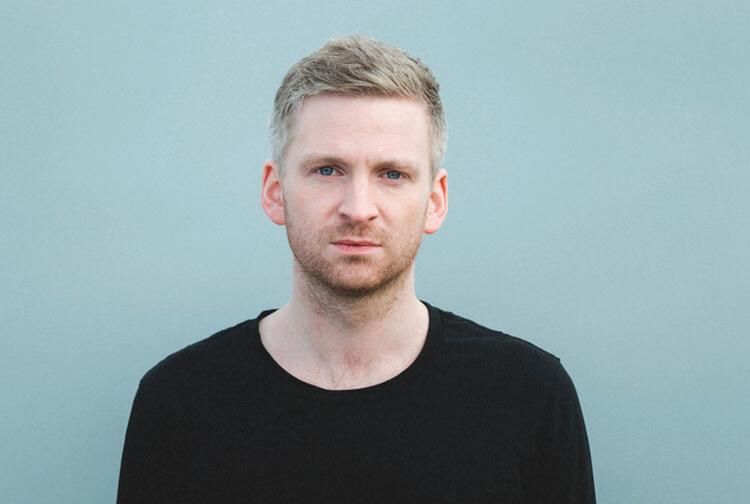
Cocorosie 4/11, 7:30 PM, Metro, canceled Dance Gavin Dance 9/5, 5:30 PM, Aragon Ballroom, rescheduled; tickets purchased for original date will be honored b
Dan Deacon, Ed Schrader’s Music Beat 4/2, 9 PM, Metro, postponed until a date to be determined, 18+ Iris DeMent, Ana Egge 3/21/21, 7 PM, City Winery, rescheduled b Drama 4/3, 9 PM, Metro, postponed until a date to be determined, 18+ Driver Era 4/25, 7:30 PM, the Vic, postponed until a date to be determined b Early Day Miners 7/15, 9:15 PM, Empty Bottle, rescheduled
The Format 7/21-7/23, 8 PM, Lincoln Hall, rescheduled; tickets purchased for original March dates will be honored, 18+ Trevor Hall, Brett Dennen 9/4, 7:30 PM, the Vic, rescheduled, 18+
Colin Hay 3/27, 8 PM, Thalia Hall, rescheduled b Robyn Hitchcock 4/22, 8 PM, Maurer Hall, Old Town School of Folk Music, rescheduled b Holy Fuck 4/7, 8:30 PM, Lincoln Hall, postponed until a date to be determined, 18+ Lyfe Jennings 4/3-4/4, 7 PM and 10 PM, City Winery, postponed until a date to be determined
Joywave 9/11, 8 PM, Subterranean, rescheduled and moved to new venue; tickets purchased for original date will be honored b
Juice, Mild West, Prxzm 4/18, 8 PM, Subterranean, postponed until a date to be determined, 18+
King Krule, Lucy 12/2, 7:30 PM,
Dan Mangan 4/2, 8 PM, Schubas, postponed until a date to be determined, 18+ Stephen Marley 4/3, 8 PM, SPACE, Evanston, postponed until a date to be determined b MC Hotdog, Kenzy (MJ116) 4/6, 8 PM, Lincoln Hall, canceled
Reba McEntire, Caylee Hammack 7/24, 8 PM, Allstate Arena, Rosemont, rescheduled; tickets purchased for the original date will be honored b
Haru Nemuri, Air Credits 9/5, 9 PM, Sleeping Village, rescheduled
Carrie Newcomer 6/13, 8 PM, Maurer Hall, Old Town School of Folk Music, rescheduled A NF 8/4, 8 PM, Aragon Ballroom, rescheduled; tickets purchased for the original date will be honored b
Oh Wonder 4/14, 7:30 PM, the Vic, postponed until a date to be determined b Omar-S, Shaun J. Wright 4/3, 10 PM, Smart Bar, postponed until a date to be determined Oysterhead 4/22, 8 PM, Aragon Ballroom, canceled; refunds will be issued by point of purchase, 17+ Peelander-Z 5/19, 9:15 PM, Empty Bottle, postponed until a date to be determined
Penny & Sparrow 8/25, 8 PM, SPACE, Evanston, rescheduled; tickets purchased for the original date will be honored b Porches, Sassy 009 4/16, 8 PM, Thalia Hall, canceled
Radio Dept 5/2, 10 PM, Empty Bottle, canceled, refunds will be issued by point of purchase
Receiving End of Sirens 5/20, 7 PM, Bottom Lounge, canceled Rookie 9/11, 10 PM; 9/12, 9:15 PM, Empty Bottle, rescheduled and one show added Caroline Rose, Toth 4/3, 9 PM, Lincoln Hall, postponed until a date to be determined, 18+ Saint Phnx 4/3, 7 PM, Subterranean, canceled
Aubrie Sellers, Lillie Mae 8/26, 7:30 PM, SPACE, Evanston, rescheduled; tickets purchased for the original date will be honored b Shopping, Automatic 4/4, 8 PM, Subterranean, canceled Todd Snider, Jamie Lin Wilson 4/10, 7:30 PM, Park West, postponed until a date to be determined, 18+ Sofi Tukker, Confidence Man, LP Giobbi 4/11, 8 PM, Riviera Theatre, postponed until a date to be determined A Squirrel Flower, Why Bonnie 4/7, 7:30 PM, Schubas, canceled Steeldrivers 4/2, 8 PM, City Winery, postponed until a date to be determined A Surf Curse, Choir Boy 5/9, 8:30 PM, Thalia Hall, postponed until a date to be determined, 17+ Switchback 8/15, 8:30 PM, FitzGerald’s, Berwyn, rescheduled Tennis, Molly Burch 4/18, 8 PM, the Vic, postponed until a date to be determined b
Thy Art Is Murder, Fit for an Autopsy, Enterprise Earth, Aversions Crown, Extinction AD 4/10, 7 PM, Reggies’ Rock Club, canceled; refunds issued by point of purchase Too Free, Drea the Vibe Dealer 4/2, 8:30 PM, Co-Prosperity Sphere, canceled Torres, Ariana & the Rose 10/16, 9:30 PM, Empty Bottle, rescheduled
U.S. Girls, Bonjay 4/5, 8:30 PM, Lincoln Hall, canceled Walk Off the Earth, Gabriela Bee 8/19, 7:30 PM, Athenaeum Theatre, rescheduled b M. Ward, Pitou 5/1, 8:30 PM, Thalia Hall, canceled Widespread Panic 8/20-8/22, 8 PM, Chicago Theatre, rescheduled; tickets purchased for original dates will be honored b
Winona Forever, Modern Vices, Late Nite Laundry 4/8, 8 PM, Schubas, canceled Thom Yorke, Sarah Davachi 4/4, 8 PM, United Center, postponed until a date to be determined b v
CALLING MINT MILE singer and guitarist Tim Midyett an underdog is a bit silly, because he’s spent three decades cranking out jams in some of America’s best guitar bands, including Silkworm and Bottomless Pit, and now plays bass in Sunn O))). All the same, he’s never gotten his due as a songwriter! Mint Mile have released a string of tasty EPs since 2015, and on Friday, March 20, they dropped their fulllength debut, the double LP Ambertron, via Comedy Minus One. It’s a stunner, with a cast that includes singer Kelly Hogan , bassist Matthew Barnhart , Songs: Ohia drummer Jeff Panall , and Palliard pedal steel guitarist Justin Brown . The music mixes up choppy country rock, folky instrumentals, and even a Christmas song, and on “Likelihood” Midyett and Brown kick up a booming Crazy Horse thunder. Mint Mile’s release show at the Hideout on Friday, April 24, has been postponed, like most other gatherings on Earth.
Tired of album-anniversary think pieces but still want to commemorate, say, Genesis’s 1980 album, Duke? To celebrate the record’s 40th anniversary, Steve Reidell of Air Credits and the Hood Internet has remade its first nine songs! He had help from his Air Credits bandmate ShowYouSuck , rapper Auggie the 9th , Mike Lust (Tight Phantomz), Johnny Caluya (Verma), Tobacco (Black Moth Super Rainbow), and Stacey Marquardt (Reidell’s spouse). Marquardt also did the artwork, casting Reidell as the lonesome figure in a green suit on the album’s cover, staring out the window at the moon. Reidell released his version of Duke on Tuesday, March 24— that’s 40 years to the day a er the original.
Sweet-voiced Chicago soul man Doug Shorts led soul-funk unit Master Plan Inc. from the early 70s till 1980, then re-formed the band in the 2010s, after soul collectors and labels began flocking to his early recordings. Last week the group released the full-length Master Plan Inc. 3, and they sound as smooth as ever. —J.R. NELSON AND LEOR GALIL
a tip? Tweet @Gossip_Wolf or e-mail gossipwolf@chicagoreader.com.

34 CHICAGO READER - MARCH 26, 2020 ll
Never miss a show again. Sign up for the newsletter at chicagoreader. com/early
Ólafur Arnalds COURTESY
THE
ARTIST
A furry ear to the ground of the local music scene
GOSSIP
Got
CHICAGO SHOWS YOU SHOULD KNOW ABOUT IN THE WEEKS TO COME b ALL AGES F
WOLF BY KEITH HERZIK
The Chicago Reader is community-centered and community-supported.





CHICAGO FOR CHICAGOANS
You are at the heart of this newspaper. Founded in 1971, we have always been free, and have always centered Chicago. Help us to continue to curate coverage of the diverse and creative communities of this fabulous city.
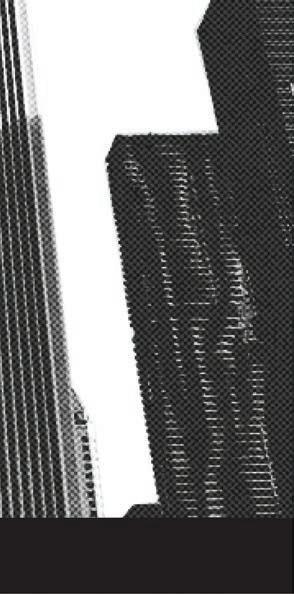


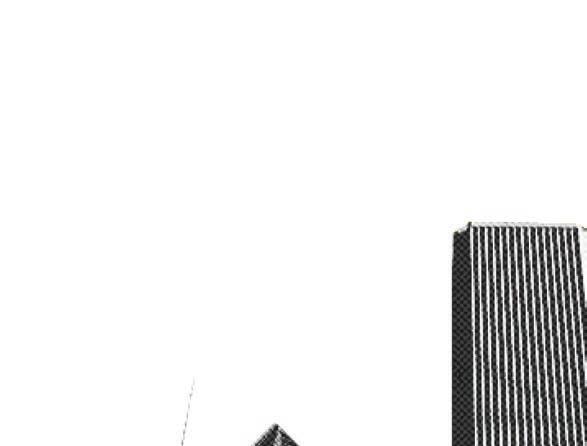
Your donation keeps the presses rolling. CHIP IN HERE: www.chicagoreader.com/members

MARCH 26, 2020 - CHICAGO READER 35
WANT TO DONATE VIA CHECK? Make checks payable to “Chicago Reader” and mail to Chicago Reader, Suite 102, 2930 S. Michigan Avenue, Chicago, IL 60616. Include your mailing address, phone, and email—and please indicate if you are okay with us thanking you by name in the paper.
OPINION
SAVAGE LOVE
Should I social distance from my casual lover?




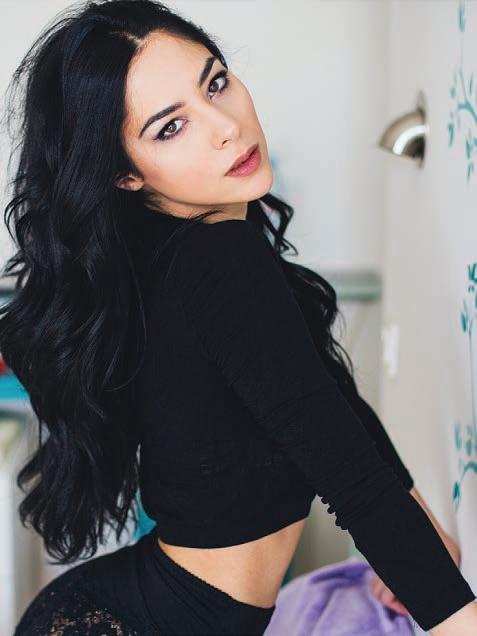

Advice on whether to hook up with an ER doctor during a pandemic.
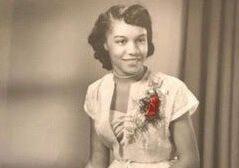
 By DAN SAVAGE
By DAN SAVAGE


Q : My question is on managing “gray area” intimacies during the pandemic. I have a lover/friend that I’ve been hanging out with—fucking, drinking tea, going on hikes, eating ice cream, watching movies, and other activities—for about nine months. He’s 36 and was married for ten years and due to that experience he’s been a bit emotionally “boundaried” but he’s still really sweet and a good communicator. I’m in grad school doing a double masters, so the small amount of time we’ve been spending together has worked well for me. Here’s the issue: he’s also an ER doctor. Do I keep seeing him during this pandemic?
I just moved to the city where we both live for my grad program and he’s my main source for connection, comfort, and support here. Every time I see him we both feel tremendously less stressed and our connection feels emotionally healthy. I just know he is bound to be at a huge risk for exposure and since he’s not a committed partner and we don’t live together, I don’t know if he falls within or outside of my physical distancing boundary. It seems like the best thing to do from a logistical perspective is hole up with my cat and not see another soul in person until a vaccine is invented or something, but I don’t know when that will happen. —PHYSICAL DISTANCING DOS AND DON’TS


A : “This is really a matter of a personal risk/benefit calculation,” said Dr. Daniel Summers, a pediatrician who lives and works near Boston (@WFKARS on Twitter). “What PDDAD is willing to accept as a risk may be different from what someone else would.”





And there’s definitely a health benefit to getting together—we are social animals and isolation is bad for us—but your lover is at high risk of infection. And when front-line health care providers get infected, they tend to get sicker than the average person who gets infected, according to CNN, which is something else you need to factor into your risk/benefit calculation. Additionally, does your boyfriend’s workplace—I’m going to call him your boyfriend for clarity’s sake— have the protective gear he needs to mini-

36 CHICAGO READER - MARCH 26, 2020 ll
REALPEOPLE REALDESIRE REALFUN. TryFREE: 773-867-1235 MoreLocalNumbers:1-800-926-6000 Ahoraespañol Livelinks.com18+ the cannabis platform a Reader resource for the canna curious ILLINOIS CANNABIS CONVENTION NEW DATES: October 9-10, Chicago Hilton necann.com nuMed.com | 1308 W. North Ave Chicago’s friendliest cannabis shop Thursdays on Cannabis Conversations chicagoreader.com/joravsky www.rosecenterforintegrativehealth.com KetamineSessions MedicalCannabis 180N.MichiganAve. Chicago,Ill60601 833-226-6362 C M Y CM MY CY CMY K Cannabis Conversations chicagoreader.com/ joravsky To advertise, call 312-392-2934 or email ads@chicagoreader.com
OPINION




mize his risk of exposure?



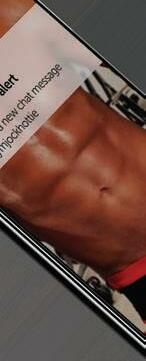










“We’re all doing our best to take as many preventive steps to lower our risk of being exposed,” said Dr. Summers, “but there’s still a maddeningly unacceptable shortage of personal protective equipment like masks, gowns, and gloves nationwide. I hope he has sufficient access to these things. But is there a risk he could get exposed to the virus at work? Definitely.”

Dr. Summers lives with his husband and four children and in addition to the precautions he takes at work—where he may be seeing patients with coronavirus (he doesn’t know for sure because tests still aren’t available)—Dr. Summers strips down to his underwear on his front porch of his home when he gets home from work. His clothes go straight into the washing machine, he goes straight into the shower.
“I’m still afraid of bringing it home,” said Dr. Summers. “But with four kids home from school, my husband’s sanity depends on my being present as much as I can. So for me, staying away isn’t an option. That’s not the case for PDDAD. She has to decide whether the undefinable risk of exposure isn’t worth it. Or, alternatively, she can decide the connection she has with him is important enough to her own well-being that the risk is worth it. But only she can make that decision for herself.”


If you decide the risk of infection is too great—or if your boyfriend decides the risk of infecting you is too great—you can still be there for each other. You can Skype and Zoom, you can text and sext, you can leave groceries on his porch and wave to him from the sidewalk. But if you decide to keep connecting with each other in person, PDDAD, you should minimize the amount of time you spend moving through the city to get to each other’s places. And that means—emotional boundaries be damned—picking one
of your apartments to hole up in together for the duration.


Q : I’m pro sex workers, and believe adults should do whatever they consent to, but I’m curious if that applies during the current pandemic. I know of a sex worker who’s still offering himself to clients, who are apparently still hiring him. (He regularly posts of his exploits on certain social media sites.) Should the authorities be made aware of this? —JUST CONCERNED




A : If the authorities want to start rounding up reckless idiots who are endangering others, JC, the beaches of Florida might be a good place to start. Or the Oval Office. And if your first impulse is to involve the authorities then you aren’t “pro sex workers,” JC, because the authorities— particularly the police—are a danger to sex workers. Instead of calling the cops, reach out to this guy on those social media sites and encourage him to see his clients virtually, i.e. instead of face-to-face (or faceto-whatever) meetings, he should go full camwhore for the time being. So if you want to help, JC, and not just police or shame, you should hire this guy to do an online session. (And everyone should bear in mind that sex workers are suffering right now too because most are being responsible and not seeing clients. Their incomes have plummeted to zero and they aren’t eligible for unemployment benefits.)

MARCH 26, 2020 - CHICAGO READER 37
v Send letters to mail@savagelove.net. Download the Savage Lovecast Tuesdays at savagelovecast.com. @fakedansavage and more!and more!… Search FiltersSearch Filters Push NotificationsPush Notifications Video Video VISIT WWW.SQUIRT.ORG AND CHECK OUT OUR NEW FEATURES: Real Men. Real Hookups. Real Men. Real Hookups. Chicago's Free Weekly Since 1971 We Couldn't Be Free Without You— Support Community Journalism
CLASSIFIEDS
JOBS GENERAL
COMPUTER/IT: Wilson Sporting Goods Co. seeks SAP OMNI Channel Analyst to work in Chicago, IL. Work w/ the e-Commrc & IT teams in NA to dsgn & test core SAP systm functnlity, while coordinatng w/ othr globl OMNI channl teams to analyz user needs & dvlp & implmnt SAP softwr solutns. Degree & commensurate exp. req’d. For details & to apply see #20201913 at careers-amersports. icims.com/jobs.
TransUnion, LLC seeks Sr. Consultants for Chicago, IL location to provide hands on architectural framework to design, implement & maintain highly available & scalable sw systems on cloud w/ hybrid deployment model. Master’s in Comp Sci/Eng/ Info Systems/InfoTech/ any Eng field +3yrs exp OR Bachelor’s in Comp Sci/Eng/ Info Systems/InfoTech/any Eng field + 5yrs exp req’d. Req’d Skills: Sw dev exp in high volume low latency content delivery apps using web services, Java, Spring Framework (Core, MVC, JDBC, Batch), Microservices (SOAP, REST), UNIX/ LINUX, Java EE (Servlets, JSP, STRUTS, JDBC), SQL, Agile, Dev in AWS Cloud Environment. 20% telecommuting permitted. Send resume to: R. Harvey, REF: PSK, 555 W Adams, Chicago, IL 60661
(St. Charles, IL) Nidec Mobility America Corporation seeks Test Systems Design Engineer w/ Bach or for deg equiv in eng & 2 yrs exp in job offered or w/ test design or valid eng, incl 2 yrs w/ test autom sftwre; test autom equip w/ data acquis hrdwre; w/ CAN & LIN ntwrkng hrdwre & contr sftwre; & w/ Natl Instrum LabView progr lang. Apply to HR 3709 Ohio Ave, St. Charles, IL 60174
ThoughtWorks Inc. seeks Senior Consultant/
Developer (Professional Services) to work in Chicago, IL & various unanticipated U.S. locations to work on largescale, custom-designed, enterprise-level software development projects that use object-oriented technologies, such as Java, Ruby or .NET.
Must have Master’s degree in Computer Science, Computer Engineering, Information Systems, Engineering or related field.
The applicant must have 2 yrs exp. in job offered, Consultant, Developer, or related IT occupation.
Must have 12 mo. exp. in: (1) Analyzing, developing, designing, and testing object-oriented and full lifecycle software development projects using JavaScript, Junit, Spring, MySQL, Oracle, and Selenium; (2) Utilizing Agile development methodologies including Continuous Integration, Extreme Programming, Continuous Delivery, TestDriven Development and pair programming; (3) Performing automation test frameworks, including unit, functional, and integration testing; (4) Developing software applications using Java, Ruby or .NET; (5) Working on projects with distributed teams, including coordinating across countries and time zones; and (6) Coaching and mentoring junior developers in all aspects of software development, including Agile development methodologies. Willingness to travel at least 80% across US. Send resume to ijobs@thoughtworks.com w/Job ID VK-SCDPS032020
Canoesys, Inc. in Rolling Meadows, IL has mult openings A) Java Developers I to assist in desgn/modify Java SW solutions; B) Java Developers II to desgn/ modify Java SW solutions; C) Java Developers III to coordinate dsgn/modify Java SW solutions; D) .Net Developers I to assist in dsgn/ modify .Net SW Solutions; E) .Net Developers II to desgn/ modify .Net SW solutions ; F) .Net Developers III to
coordinate dsgn/modify .Net SW solutions ; G) Quality Assurance Analysts I to assist in dsign of test plans/ scripts; H) Quality Assurance Analysts II to dsign test plans/ scripts ; I) Quality Assurance Analysts III to coordinate the dsign of test plans/scripts ; J) Systems Analysts I to analyze user requirements/problems of computer systems under close supervision; K) Systems Analysts II to analyze user requirements/problems of computer systems; L) Systems Analysts III to coordinate analysis of user requirements/problems of computer systems ; M) Software Developers I to assist in desgn/devlp SW apps ; N) Software Developers II to desgn/devlp SW apps; O) Software Developers III to coordinate the desgn/devlp of SW apps. No trvl; telcomm. All positions are proj.based @various unanticipated w/ in the U.S. that may require relocation. Mail Resumes To: Canoesys, Inc., ATTN: HR, 3315 Algonquin Rd, Ste. 102, Rolling Meadows, IL 60008. Indicate which Job (A) to (O).
DATA ENGINEERING LEAD: Abbott Labs in Chicago, IL seeks qualified Data Eng Lead. Design and implement big data, data asset, advanced analytics, and business intelligence (BI) solutions to develop digital healthcare products. Bachelors or foreign equiv in IT, Electrical Eng, Comp Sci or in a rltd eng or IT fld + 5 yrs of progressive pro exp in: (i) data analytics, data transformation & data warehousing; (ii) Microsoft Azure, Google Cloud, &/ or Amazon Web Services (AWS) cloud platforms; (iii) building data pipelines, ETL, data eng & data science modeling; (iv) Apache, Spark, Spark SQL & Apache Sqoop; (v) establishing integration solutions btwn heterogeneous data platforms &/or legacy systems; (vi) Teradata, Oracle & MySQL databases; (vii) Hadoop file formats, incl Text, Avro, Parquet & objectoriented programming; (viii)
Shell scripting; (ix) workflow engines to run multiple Spark, Hive, Nifi, Sqoop, and/or Informatica jobs; (x) data visualization tools, incl Microsoft BI, Qlik, Tableau &/ or IBM Cognos; & (xi) Software Development Lifecycle (SDLC) in Agile Scrum methodology. An EOE. 40 hrs/ wk. Respond by mail: Abbott Laboratories, Attn: Kathleen Ellwanger, Senior Paralegal, 100 Abbott Park Road, Dept. 32RC, Bldg. AP6A, Abbott Park, IL 60064. Refer to ad code: ABT-00609-KE
Relativity (Chicago, IL) seeks Senior Software Engineer in Test to drive customer confidence by assuring the quality of Relativity’s current & future core products. Must take and pass HackerRank Code Challenge pre-interview screening test. To apply, please email your resume to Recruiting@relativity. com. Please reference “JOB ID: 20-9001” in the subject line to be considered.
A market research company is conducting a survey of cannabis and CBD consumers. We are seeking qualified participants for an upcoming virtual focus group, as well as future studies. Those who qualify for the virtual focus group will receive a $75 gift card for their participation. All others will be entered to win one of 10 $50 gift cards by completing the survey below. Our focus group sessions will last no longer than 1 hour and will be conducted virtually online. This will be a fun, online discussion about cannabis. Interested? Follow this link and take a quick survey to qualify. (http://aclararesearch.az1. qualtrics.com/jfe/form/ SV_7P2rRoOyeAIXteB?source=CR)
Designer, The Pepper Group, Inc., in Palatine, IL. Create interactive design concepts for variety of mediums for website & digital designs, etc. Design mood boards, video storyboards,
interactive ad layouts, mockups & animated GIFs; Ensure all graphics adhere to client brand guidelines. Req: Bach/ graphic design, visual comm design or related field, or foreign equiv + 1 yr exp as Graphic Designer. 1yr exp using Photoshop, Illustrator, InDesign, After Effect & Dreamweaver also req’d. To apply & send resume go to: https://peppergroup. applytojob.com/apply
MARKETPLACE ADULT SERVICES
Danielle’s Lip Service, Erotic Phone Chat. 24/7. Must be 21+. Credit/Debit Cards
Accepted. All Fetishes and Fantasies Are Welcomed. Personal, Private and Discrete.
LEGAL NOTICES
NOTICE
Cottage Grove & 93rd Currency Exchange, Inc., pursuant to Section 15.2 of the Illinois Currency Exchange Act, notice is hereby given by the Secretary, State of Illinois, Department of Financial and Professional Regulation, Division of Financial Institutions, Currency Exchange Section, that as of February 15, 2020, all debts, liabilities and lawful demands against the Cottage Grove & 93rd Currency Exchange, Inc. will be redeemed by the Secretary on demand, in writing, by the owner thereof, at any time within one year from the date of first publication.
Notice is hereby given, pursuant to “ An Act in relation the use of an Assumed Business Name in the conduct or transaction of Business in the State,” as amended, that a certification was registered by the undersigned with the County Clerk of Cook County. Registration Number: Y20003316 on March 3, 2020.
Under the Assumed Business Name of BRYCE & CO. with the business located ay: 3525 N Racine Ave Apt 2W, Chicago, IL, 60657.
Notice is hereby given, pursuant to “ An Act in relation the use of an Assumed Business Name in the conduct or transaction of Business in the State,” as amended, that a certification was registered by the undersigned with the County Clerk of Cook County. Registration Number: Y20003315 on March 3, 2020. Under the Assumed Business Name of B.E.A.R.D.E.D. PLAYGROUND with the business located ay: 3525 N Racine Ave Apt 2W, Chicago, IL, 60657.
No more EDM boys, please Me: 20sF, goofy, food-lover, works in politics, quarantined but healthy
Seeking: celebrity sightings, dogs in wigs, trashy TV, craft beer, somebody to entertain me during the pandemic (pitch me your best virtual date ideas!)
Instagram: @sydneycatherine
sexy senior searcher
Although there’s some snow on the roof, this active 60+ still has a fire down below... seeking a lady who enjoys life. Attitude important... appearance not.
windy_city_lover@yahoo.com
Dream Pal
Curious boy, 32, who in better times loves nothing more than exploring & chasing down CTA buses together, cooped up alone now, by the window. Seeks similar girl to write, draw & dream with. Write me with a keen imaginary & I’ll send you a letter back. penpalbythewindow@gmail.com
Free Matches ads are not guaranteed and will run in print and online on
Go to chicagoreader.com/matches to

38 CHICAGO READER - MARCH 26, 2020 ll
JOBS ADMINISTRATIVE SALES & MARKETING FOOD & DRINK SPAS & SALONS BIKE JOBS GENERAL REAL ESTATE RENTALS FOR SALE NON-RESIDENTIAL ROOMATES MARKETPLACE GOODS SERVICES HEALTH & WELLNESS INSTRUCTION MUSIC & ARTS NOTICES MESSAGES LEGAL NOTICES ADULT SERVICES
a space-available basis.
submit your ad today! WANT TO ADD A LISTING TO OUR CLASSIFIEDS? E-mail classified-ads@chicagoreader.com with details or call (312) 392-2970 We Couldn't Be Free Without You— Support Community Journalism chicagoreader.com/donate Chicago's Free Weekly Since 1971















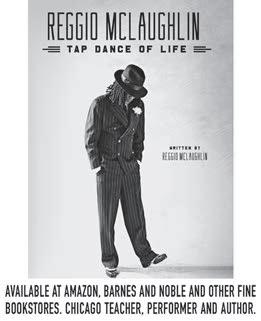


MARCH 26, 2020 - CHICAGO READER 39 FINANCING AVAILABLE Licensed, Bonded & Insured—IL Roofing Lic. #104.013526 For 40 years, 30,000+ satisfied customers have trusted Second City. • ROOFING • BRICKWORK • GARAGES SHINGLE ROOFS NEW GARAGESFLAT ROOFS ROOFING, GUTTERS & MORE the platform The Chicago Reader Guide to Business and Professional Services www.herreralandscapeschicago.com DISCOVER YOUR BLISS www.intimate-bliss.com *WARNING: Must be 18 years or older to visit website and/or place order. To advertise, call 312-392-2934 or email ads@chicagoreader.com SAVE BIG ON A NEW HVAC SYSTEM FINANCING AVAILABLE CREDIT CARS ACCEPTED Up to $2,500 savings for a limited time! Call today for a free estimate! 773-895-2797 www.MironHVAC.com -Energy Efficient -Innovative comfort features -Great maintenance contracts -24-Hr Emergency Service Psychic ReadingsPalm and Tarot If you are worried, troubled, sick or unhappy through love, business, marriage, luck or whatever your problem may be, I have reunited the separated, healed the sick and help many people with money problems. Whereothershavefailed.Ihave succeeded. I will not ask what you came in for. I will tell you. (773)-540-5037 1222 E 47th St She guarantees to help you. No problem is too big for her COLLABO TIVE PREMARITAL FAMILY DIVORCE MEDIATION Brigi e Schmidt Bell, P.C. Lawyers@bsbpc.com | 312-360-1124 BrigitteBell.com Convenient Chicago & Evanston O ces travel home improvementpsychic real estate advertising books romance legal funeral services entertainment YOUR AD HERE pleaserecyclethispaper

Proceeds will be split between the Reader and the more than 50 artists who contributed illustrations. $30 for PDF download $40 for limited edition printed book and PDF download For copies of this book, either in PDF form or as a printed book, see: chicagoreader.com/coloringbook Or send checks to: Chicago Reader Suite 102 2930 S. Michigan Avenue Chicago, Illinois 60616 Provide your name and mailing address and say this is for a coloring book on the memo line.












 By MIKE SULA
By MIKE SULA























 @joravben
@joravben























































 Ryan P. C. Trimble @ryntern
Ryan P. C. Trimble @ryntern





















































 —JOSHUA MINSOO KIM
—JOSHUA MINSOO KIM



 Midnight, Rebirth by Blasphemy Metal Blade
Midnight, Rebirth by Blasphemy Metal Blade





















 By DAN SAVAGE
By DAN SAVAGE






















































